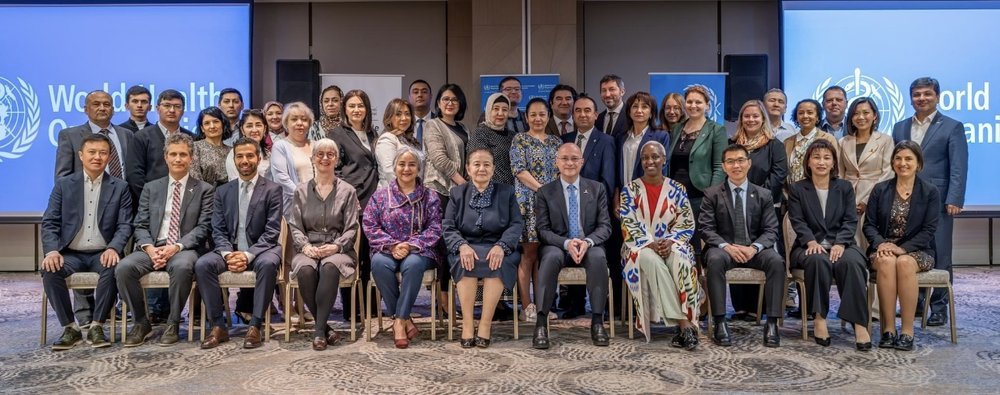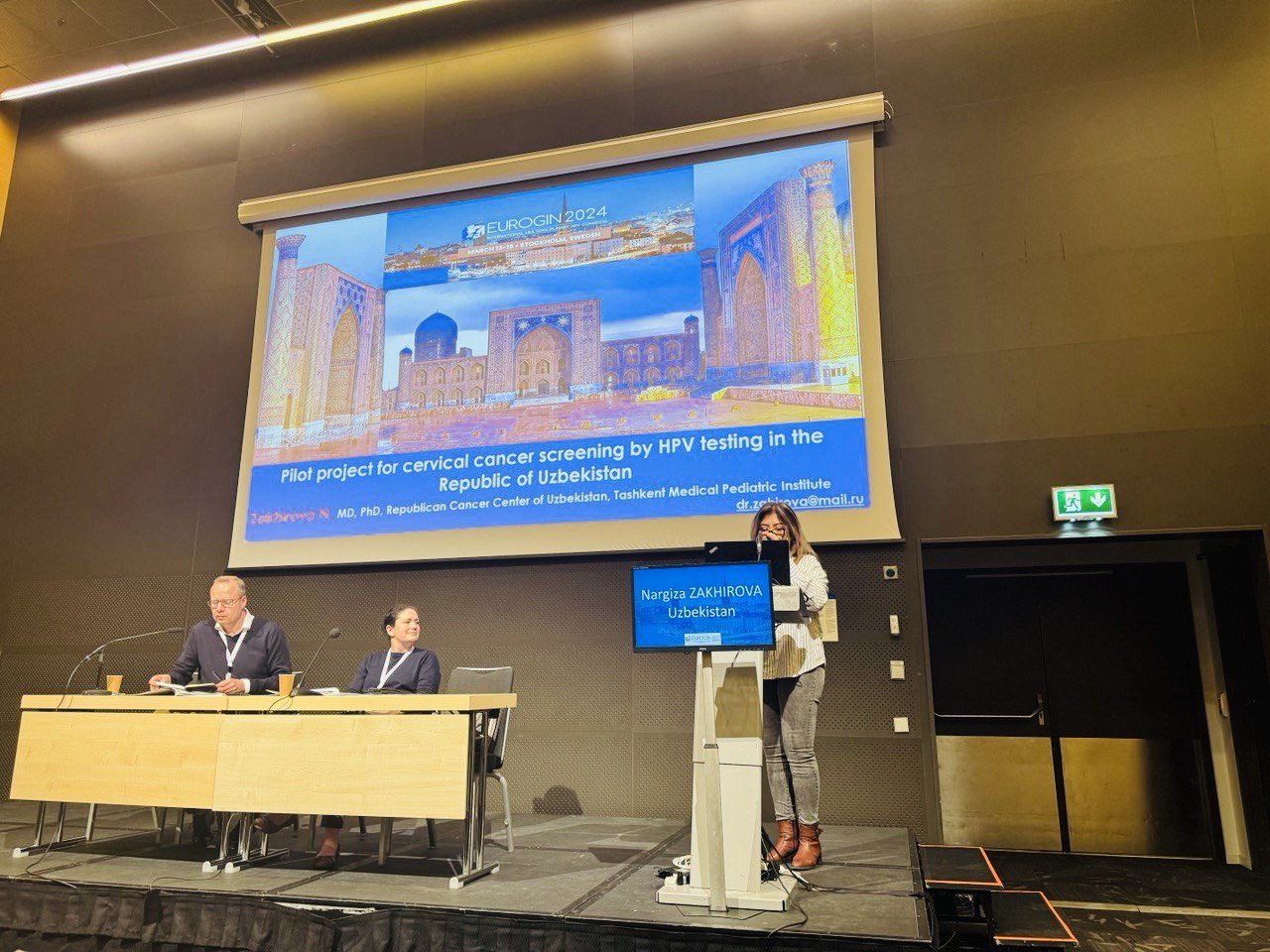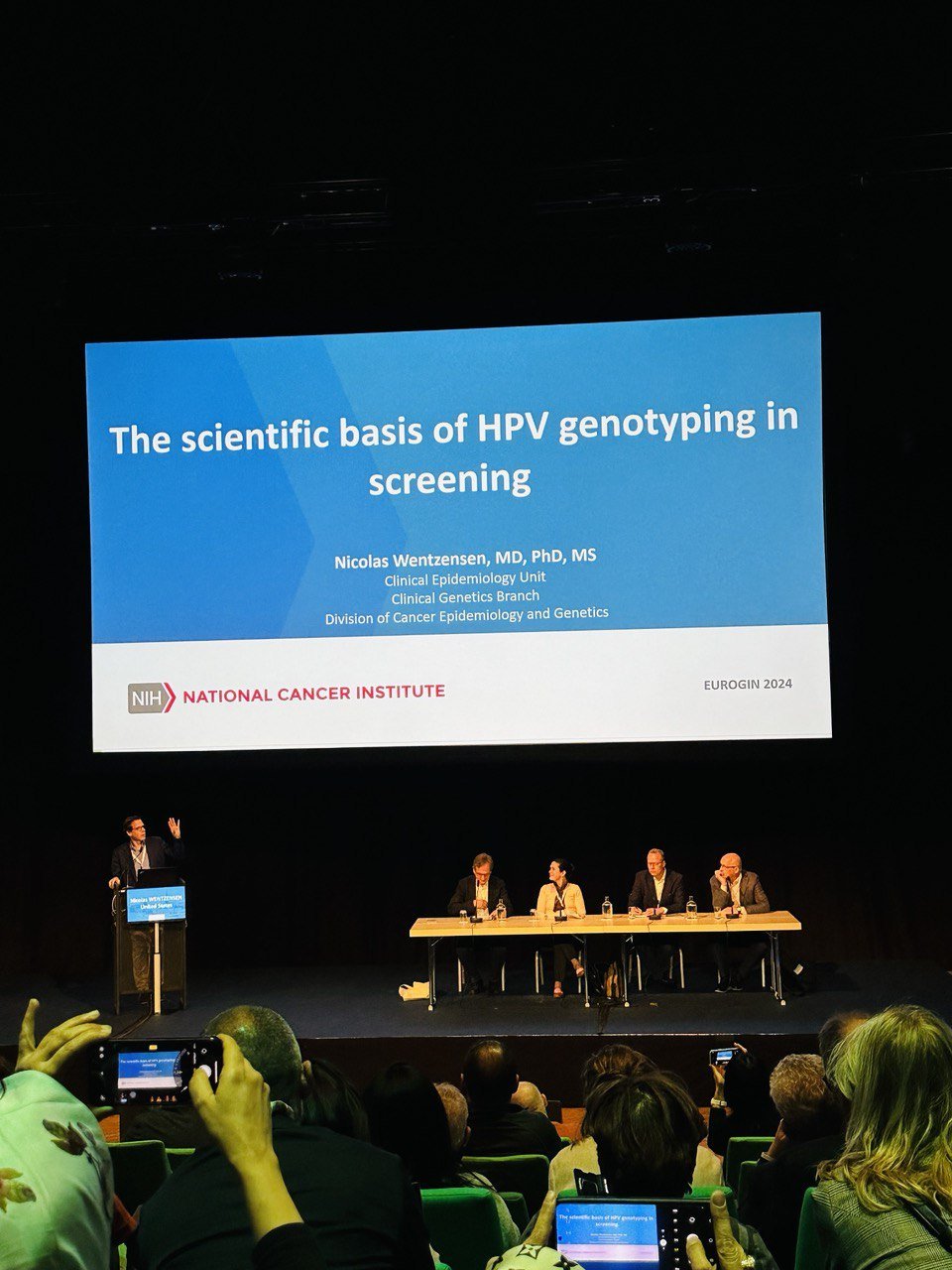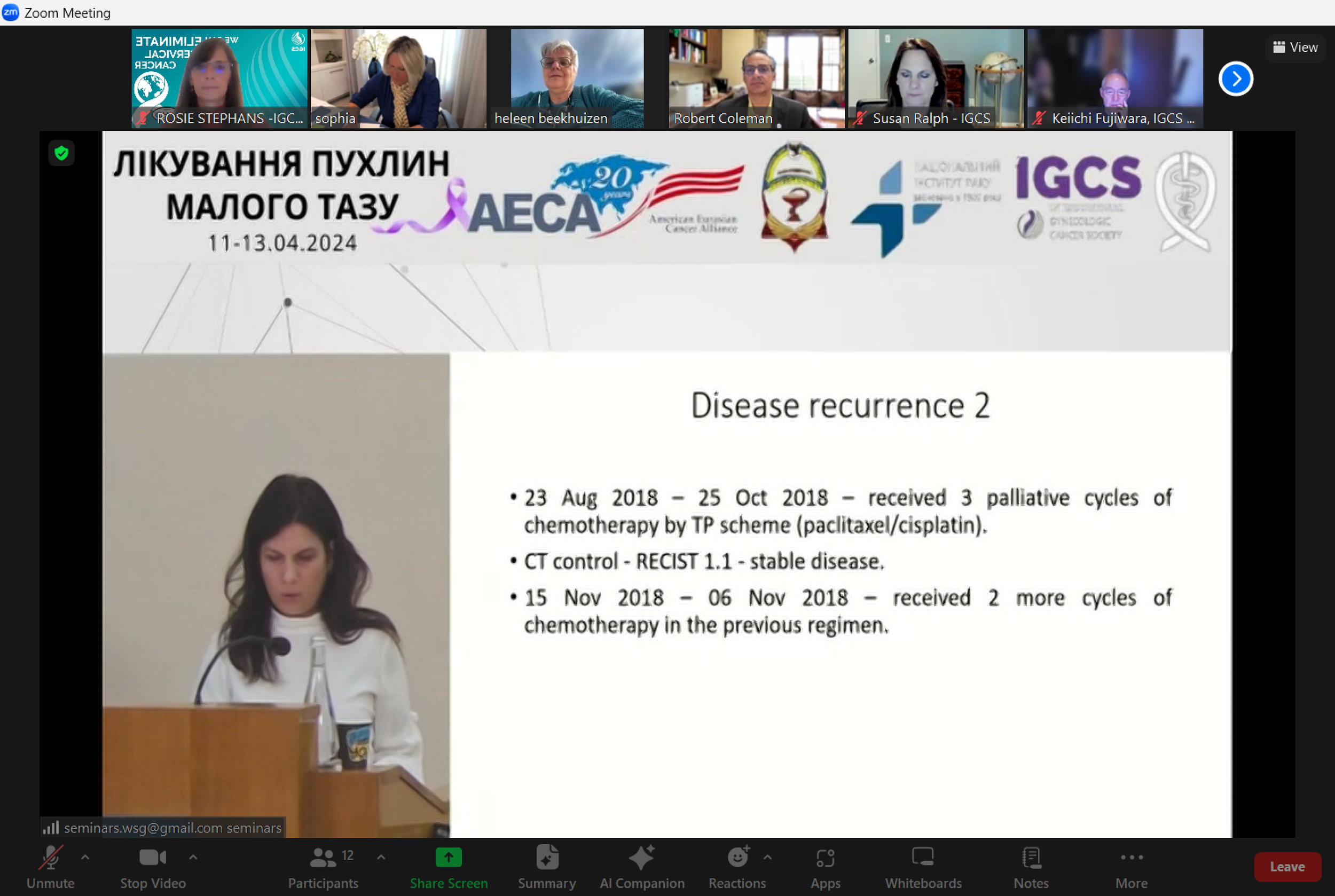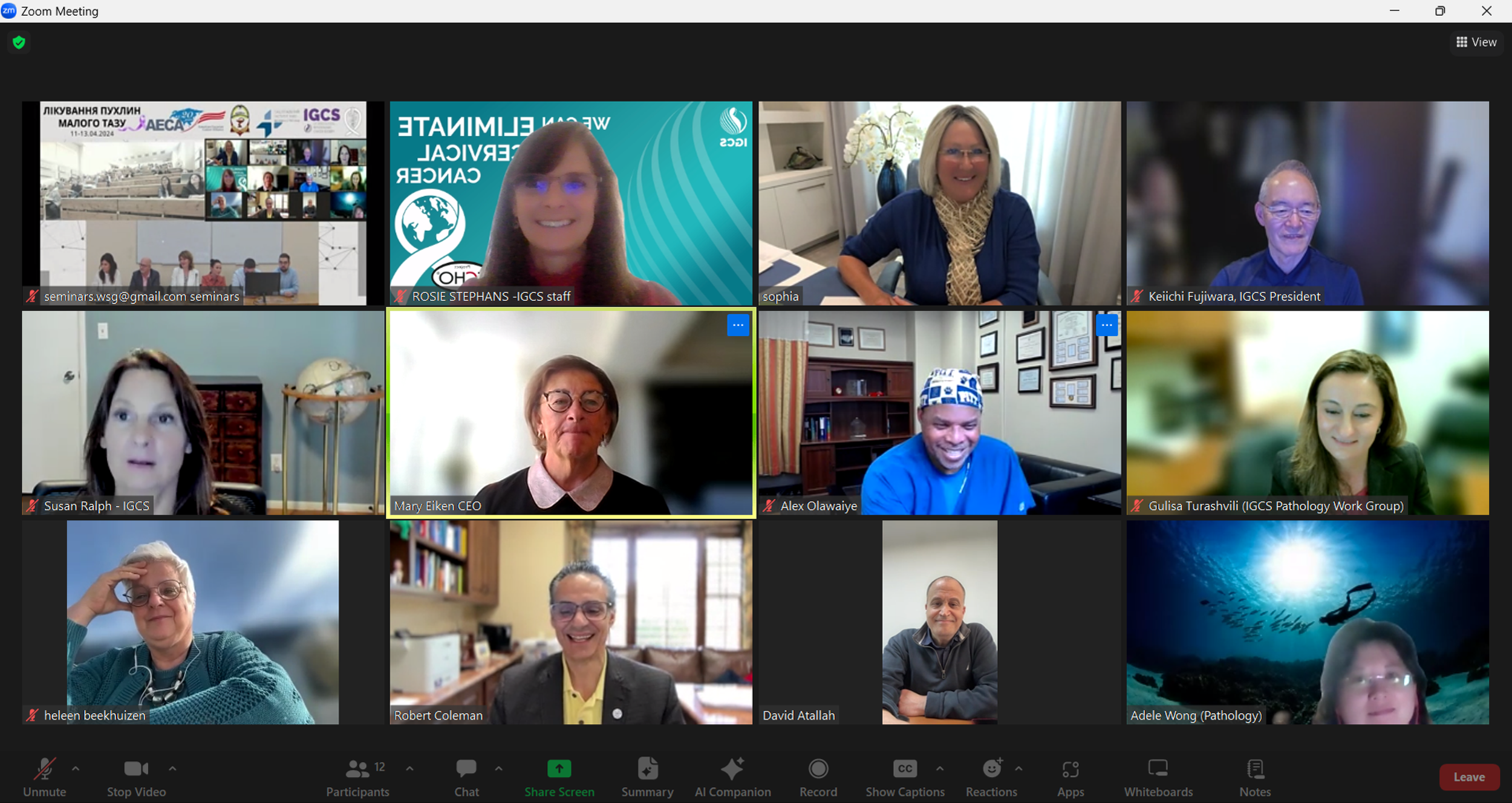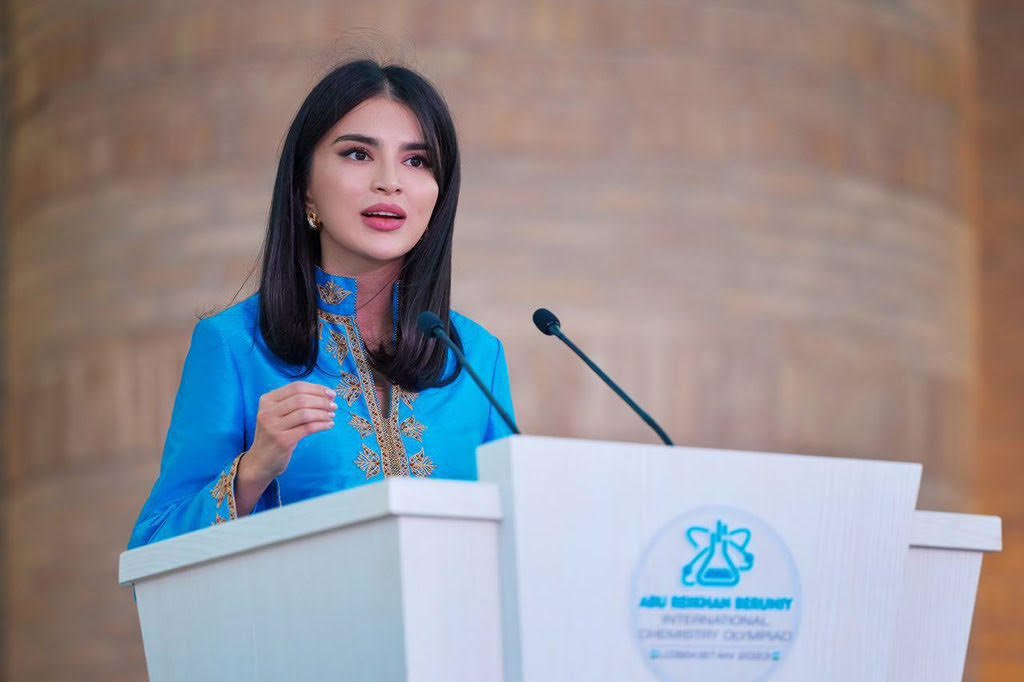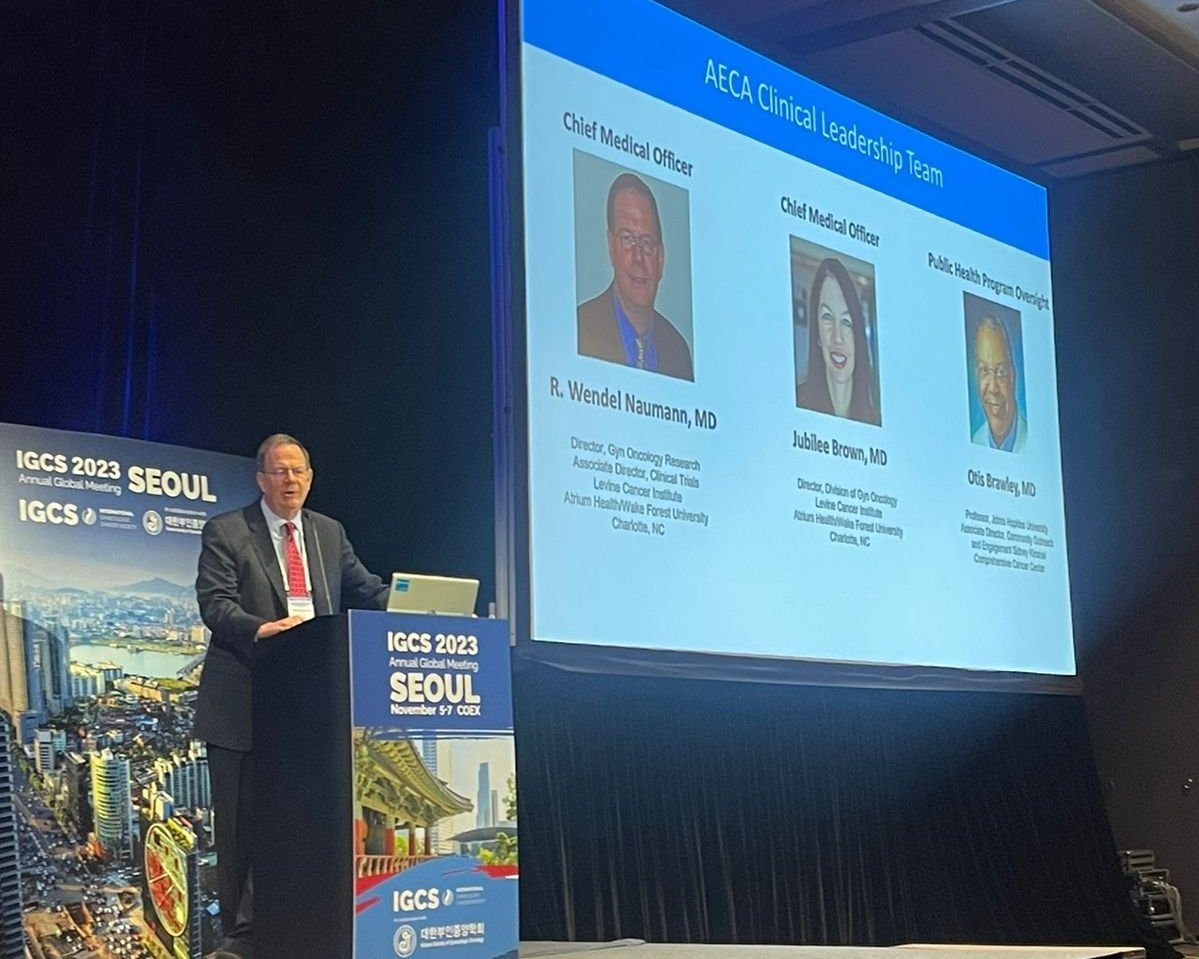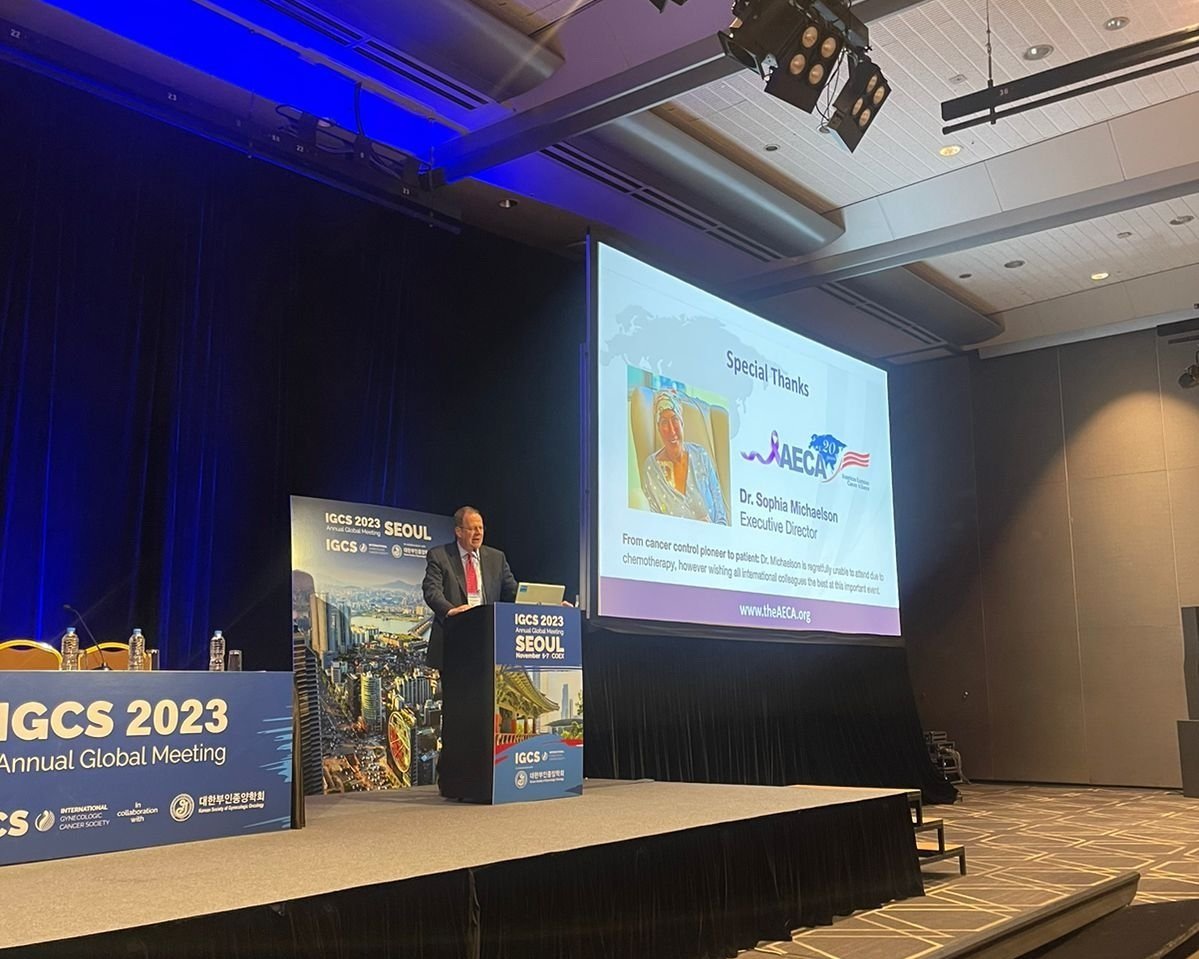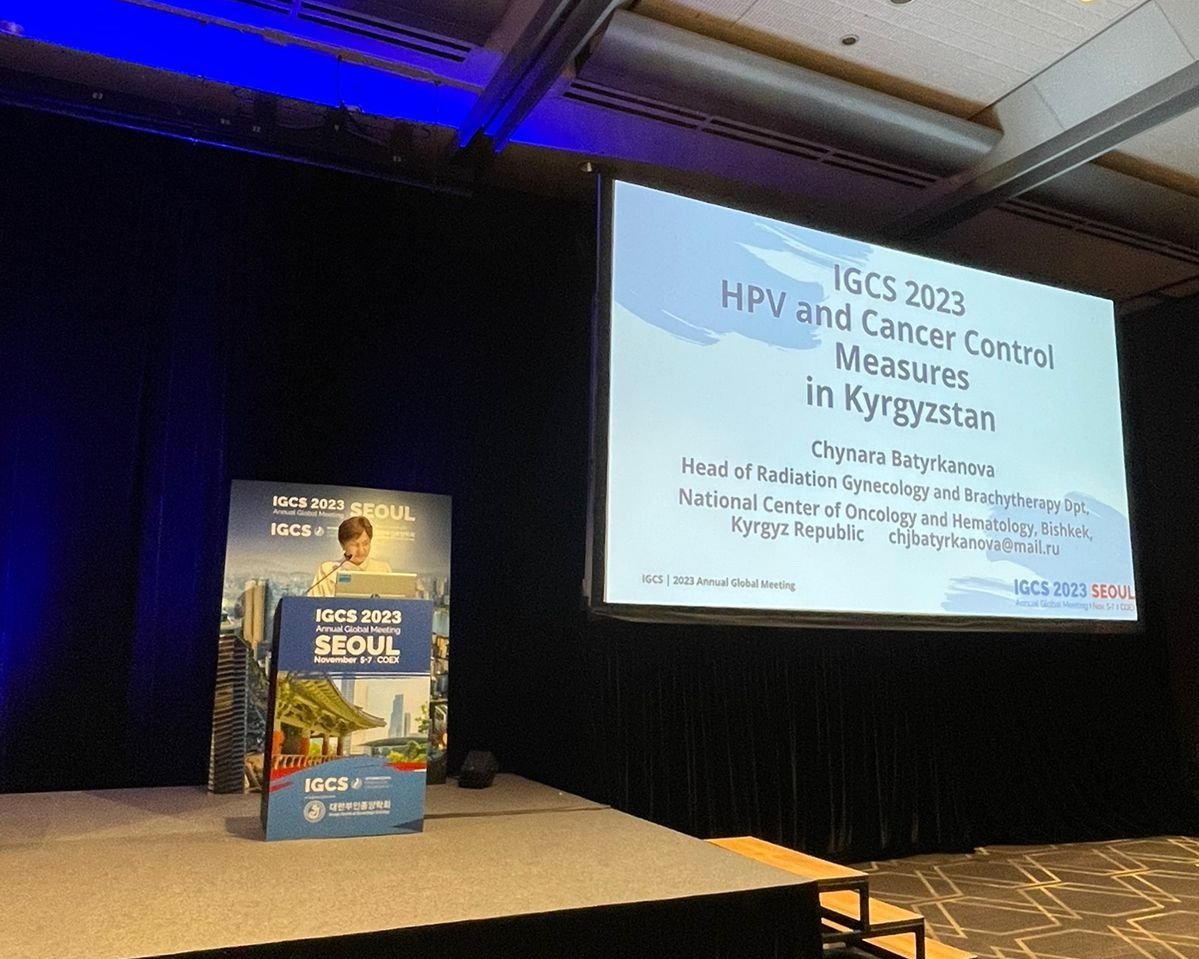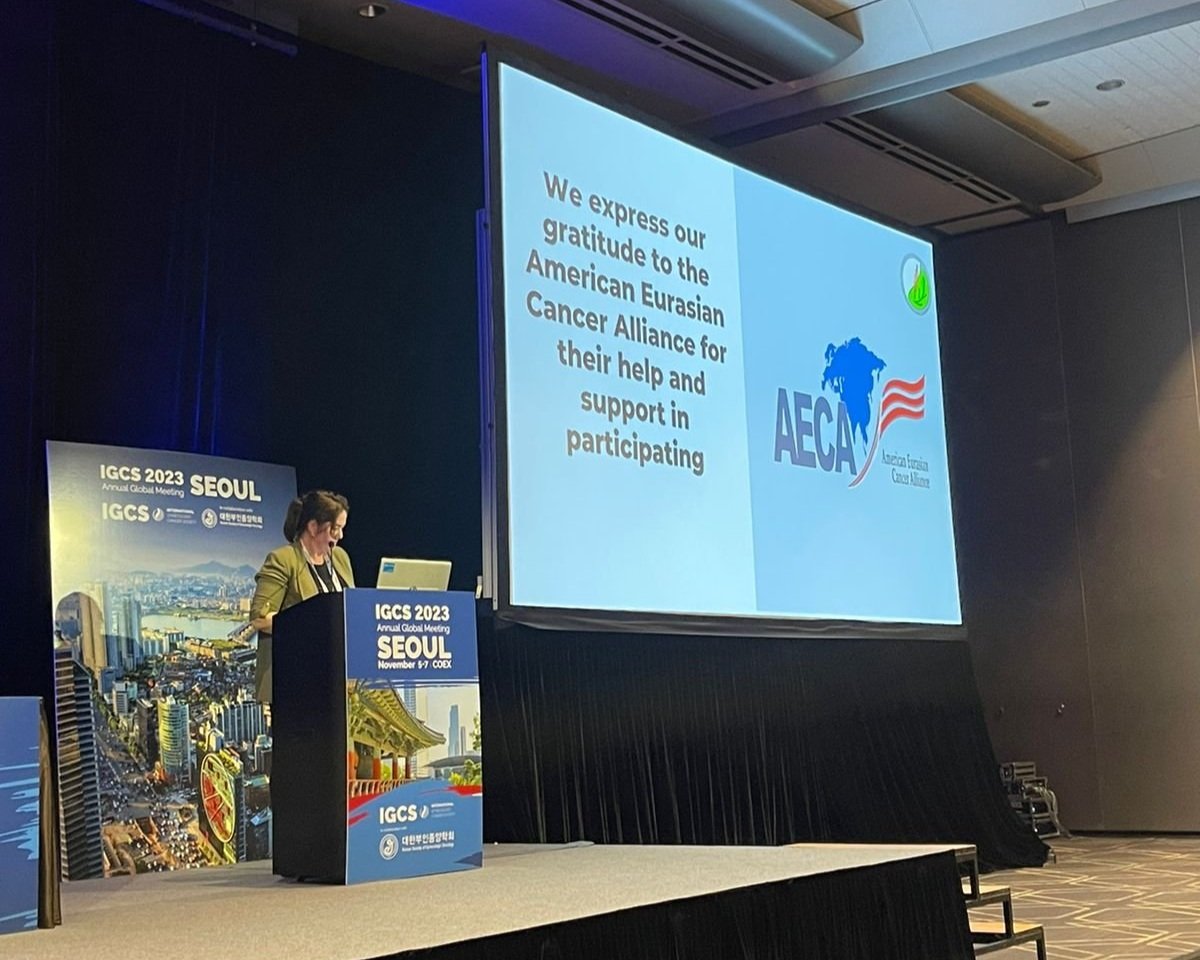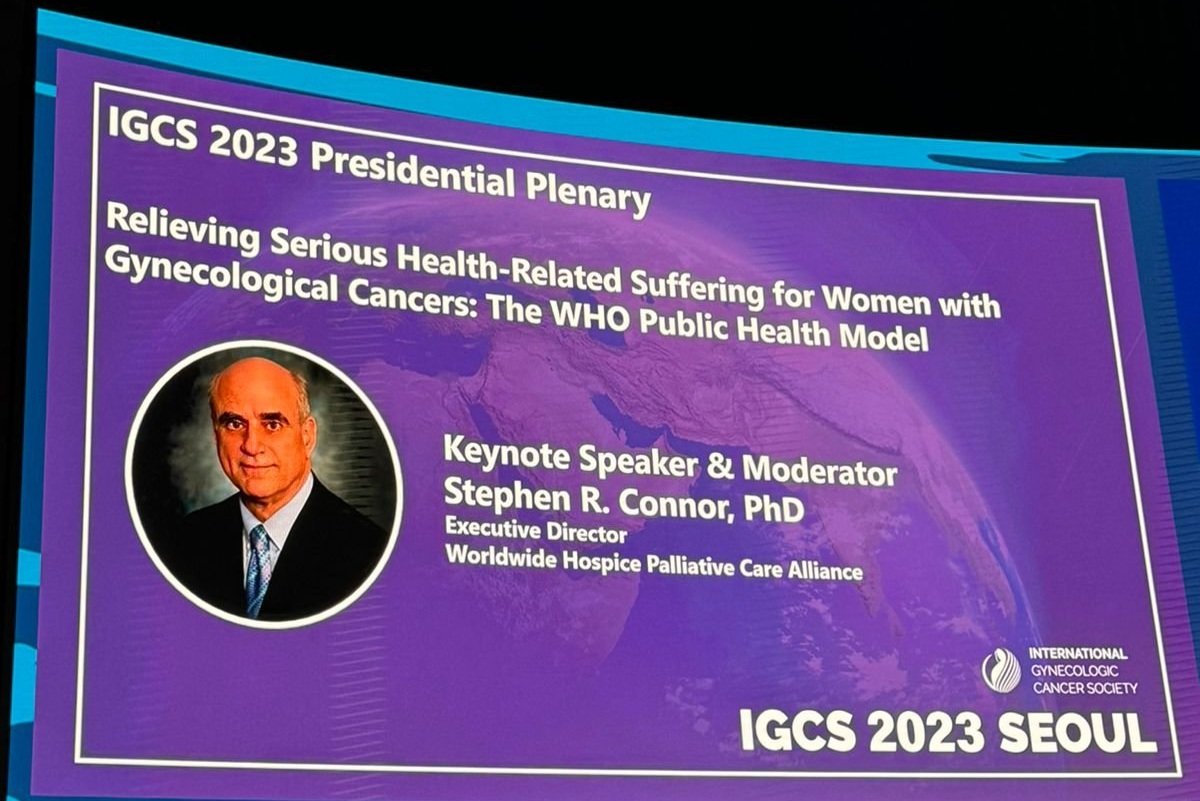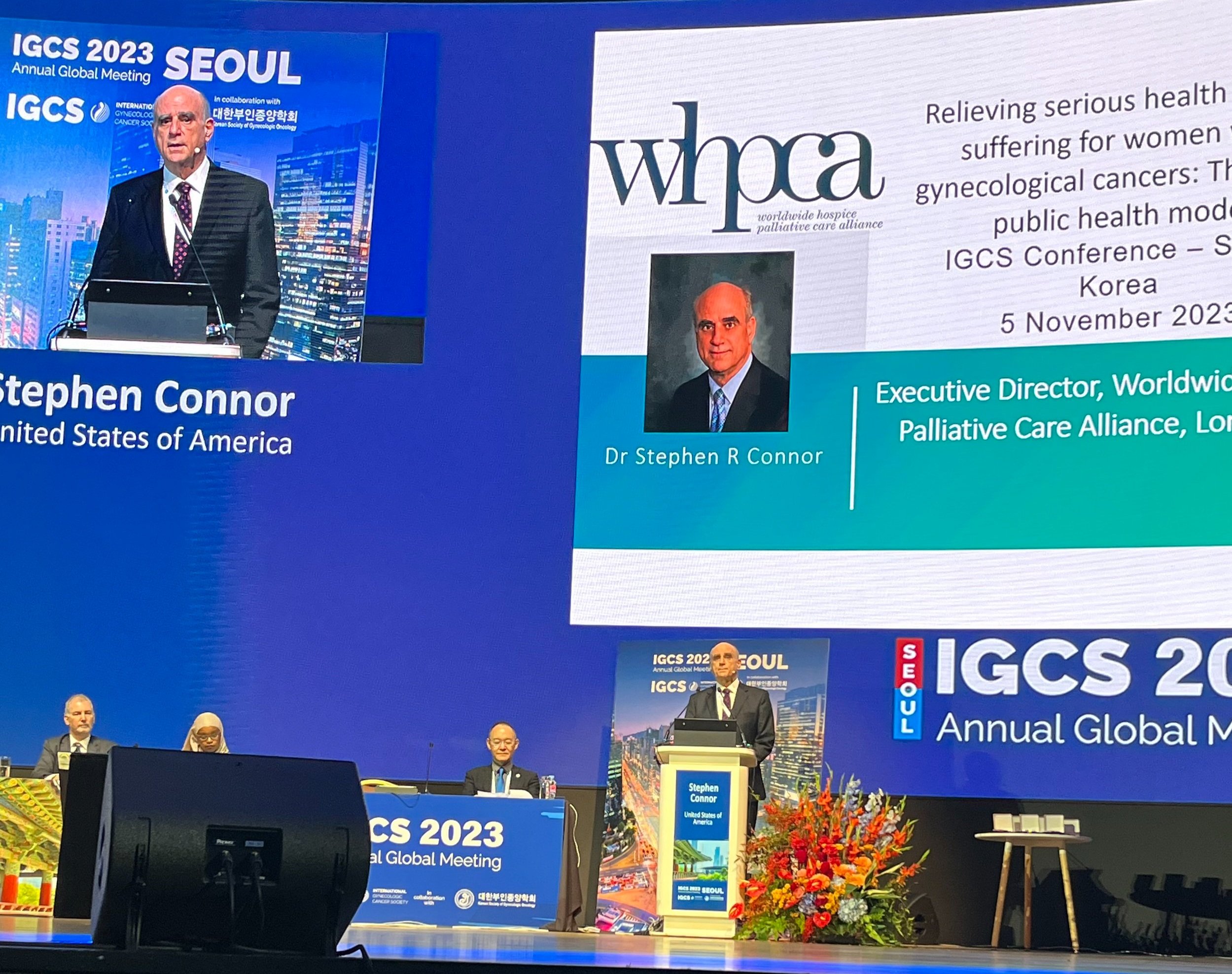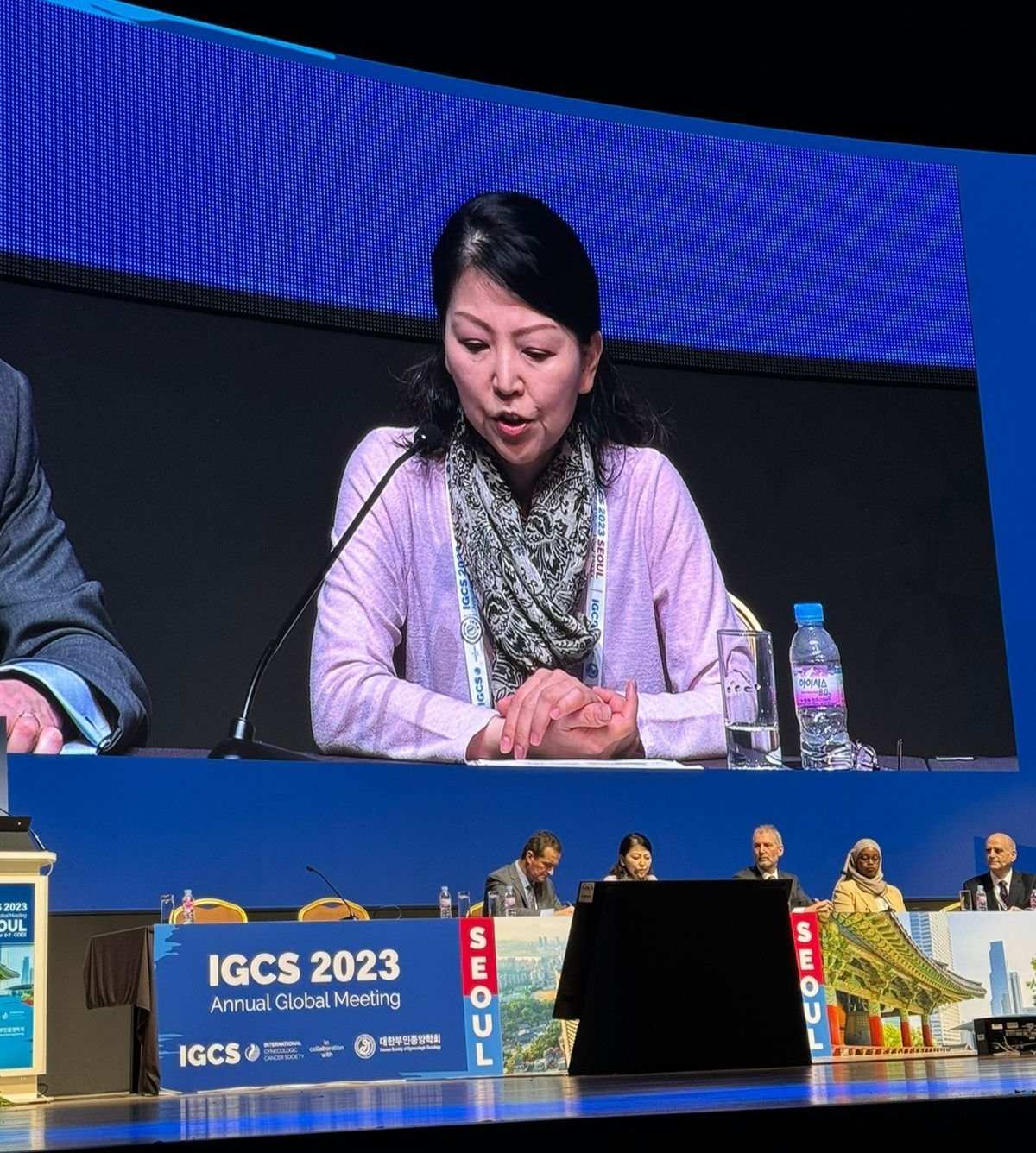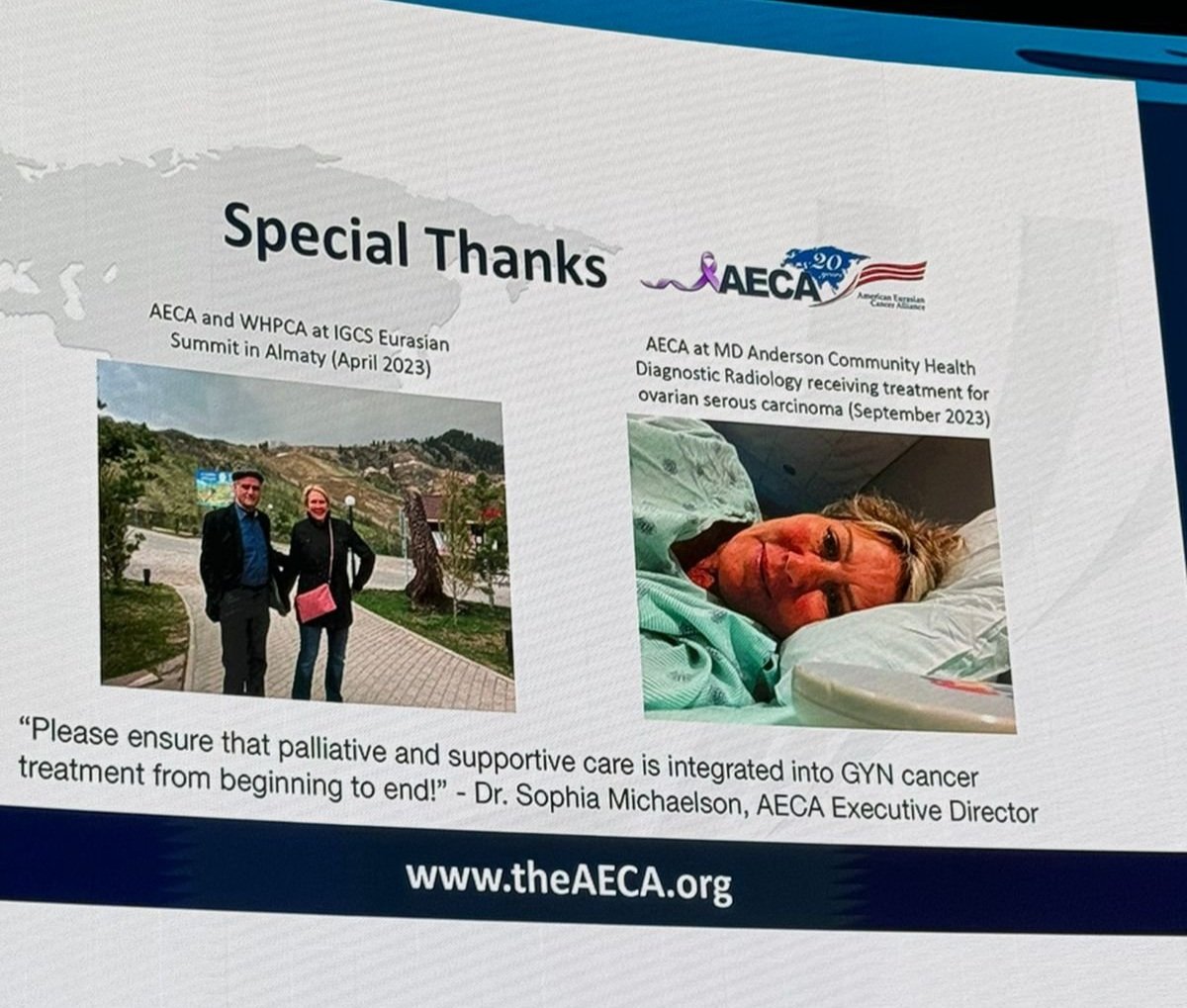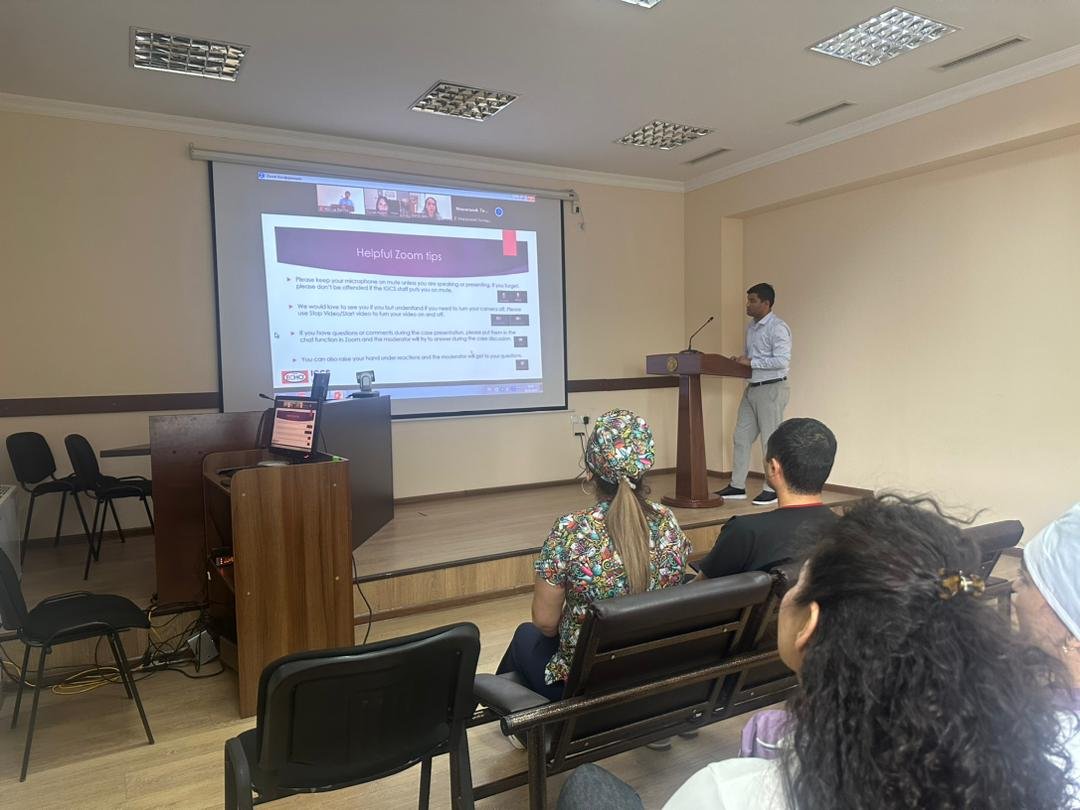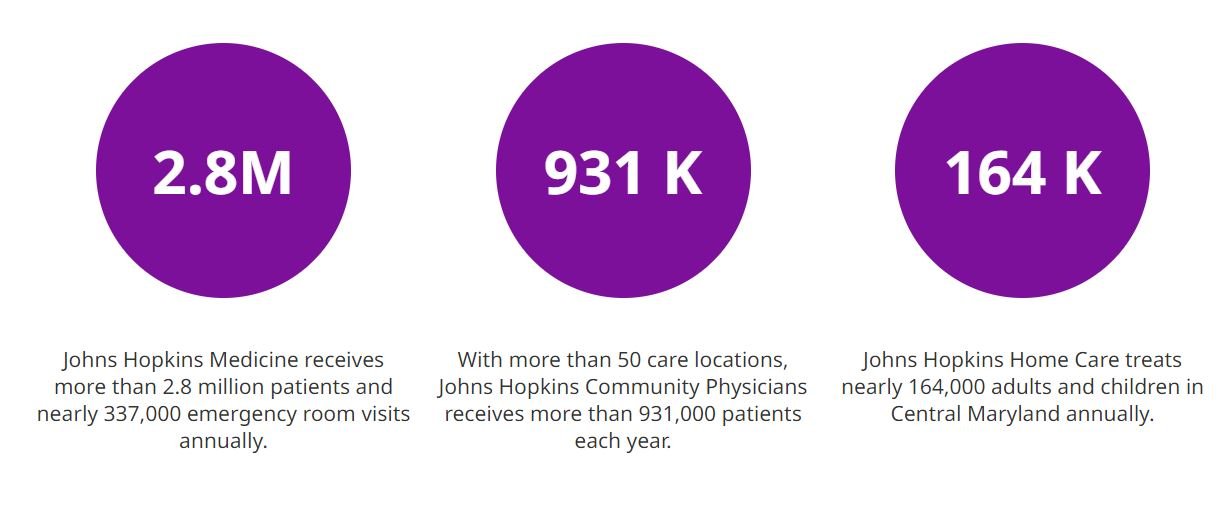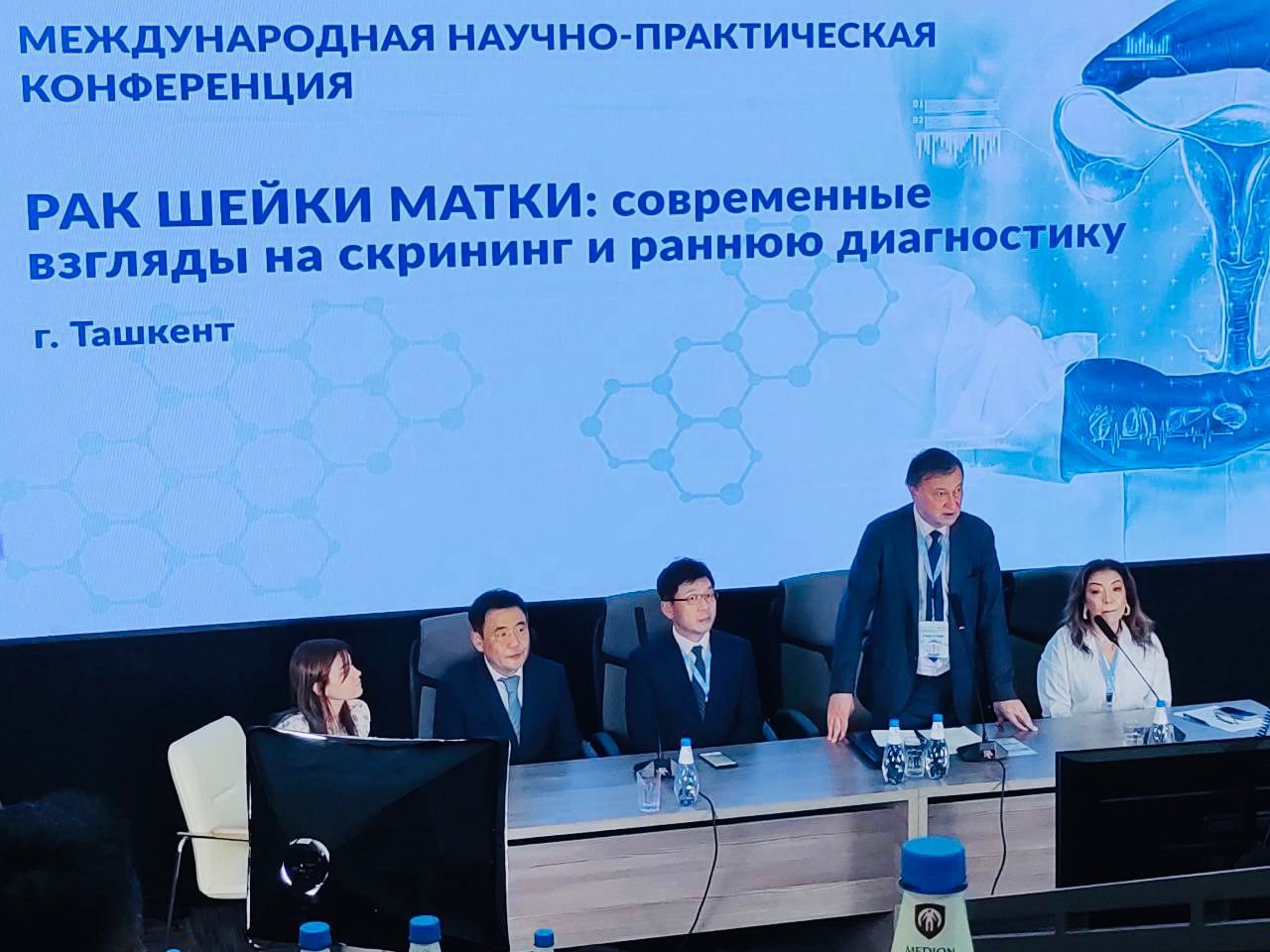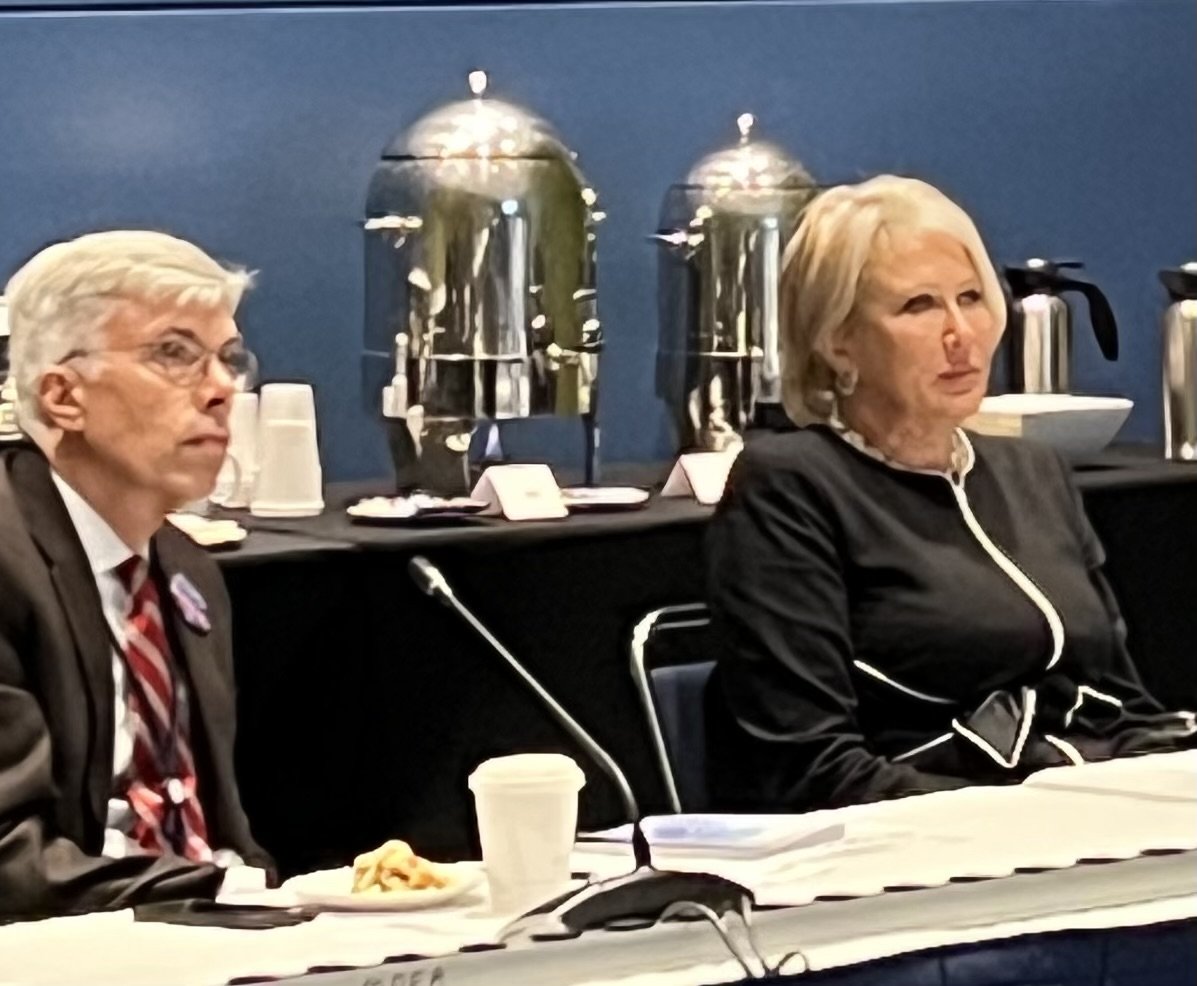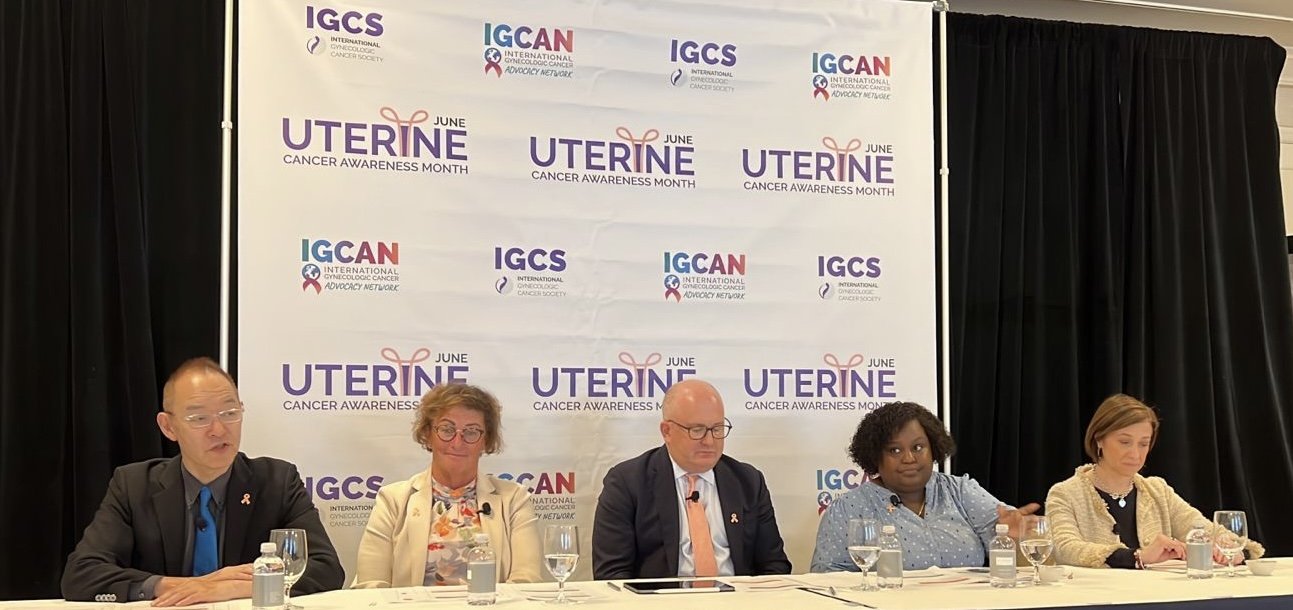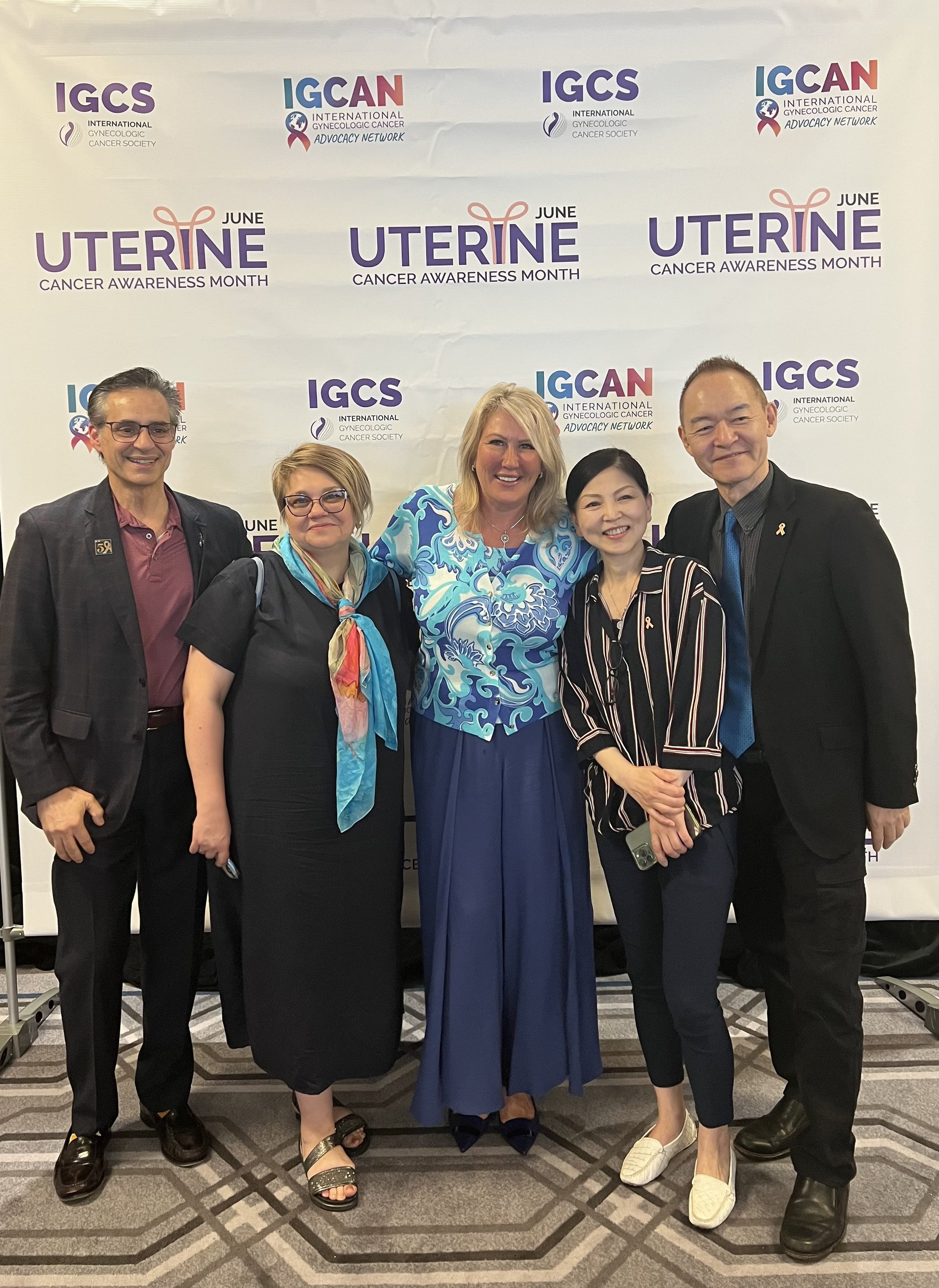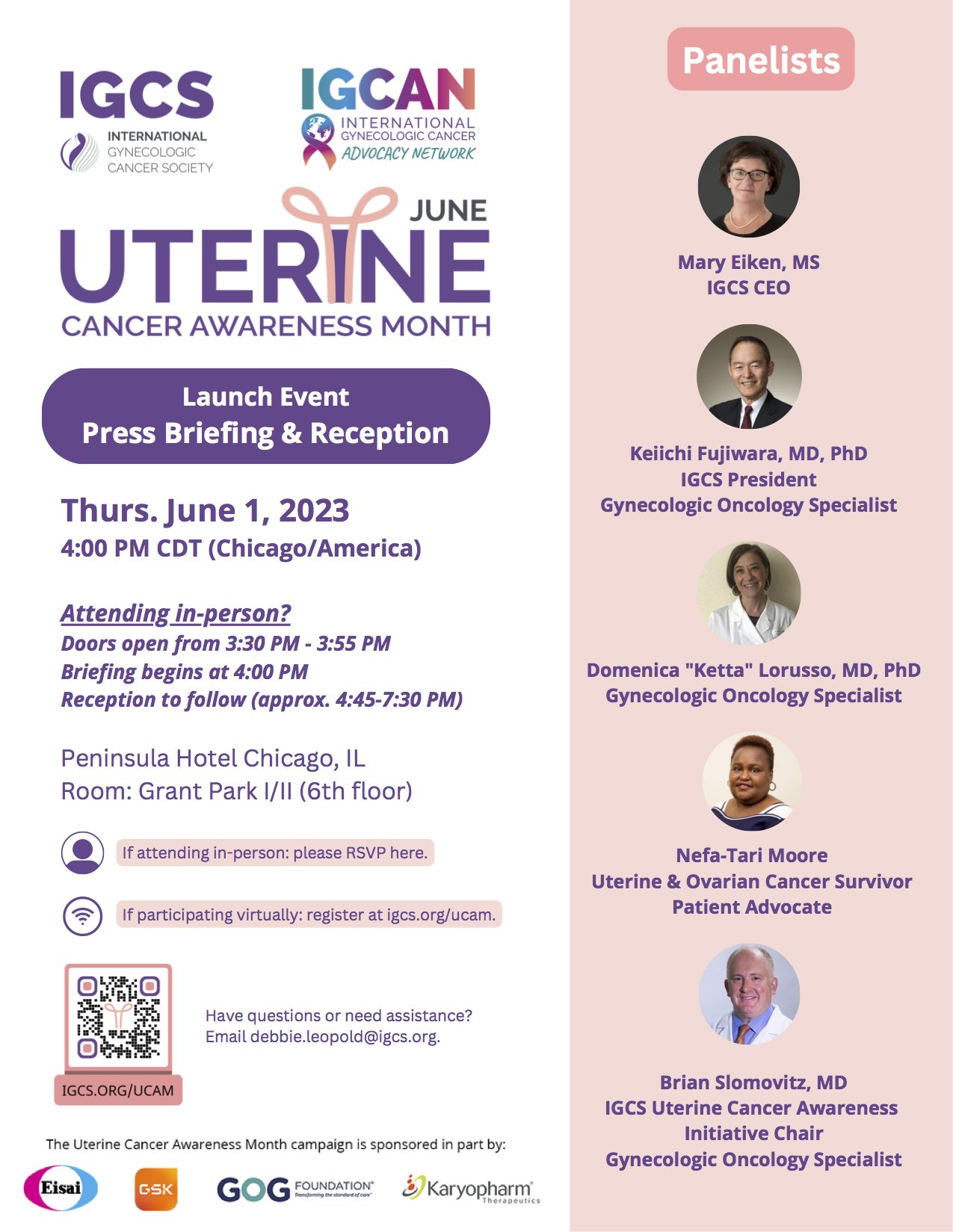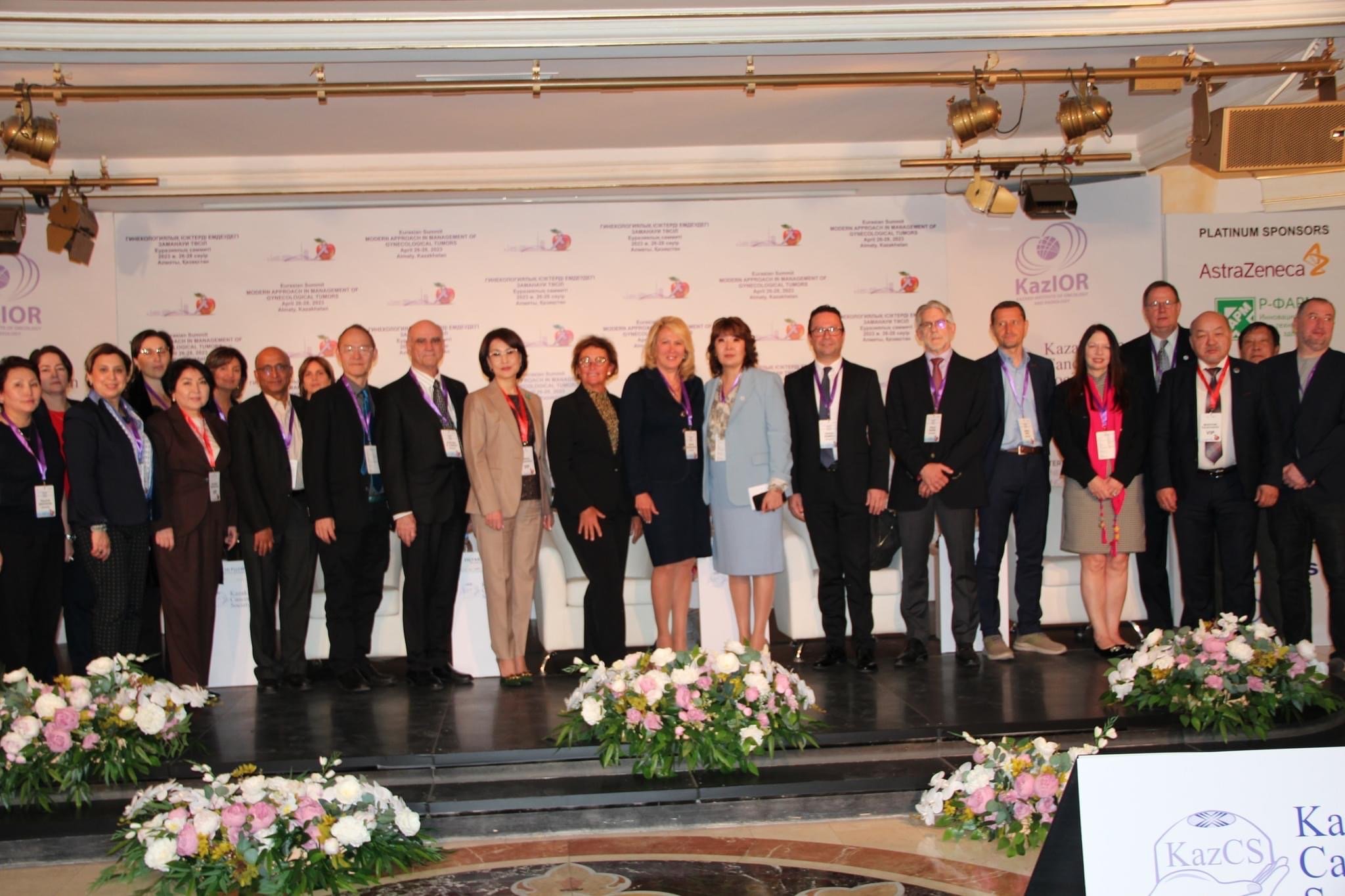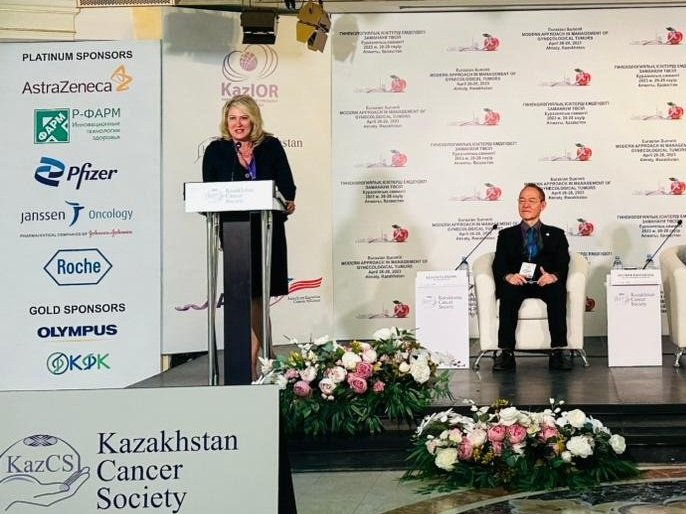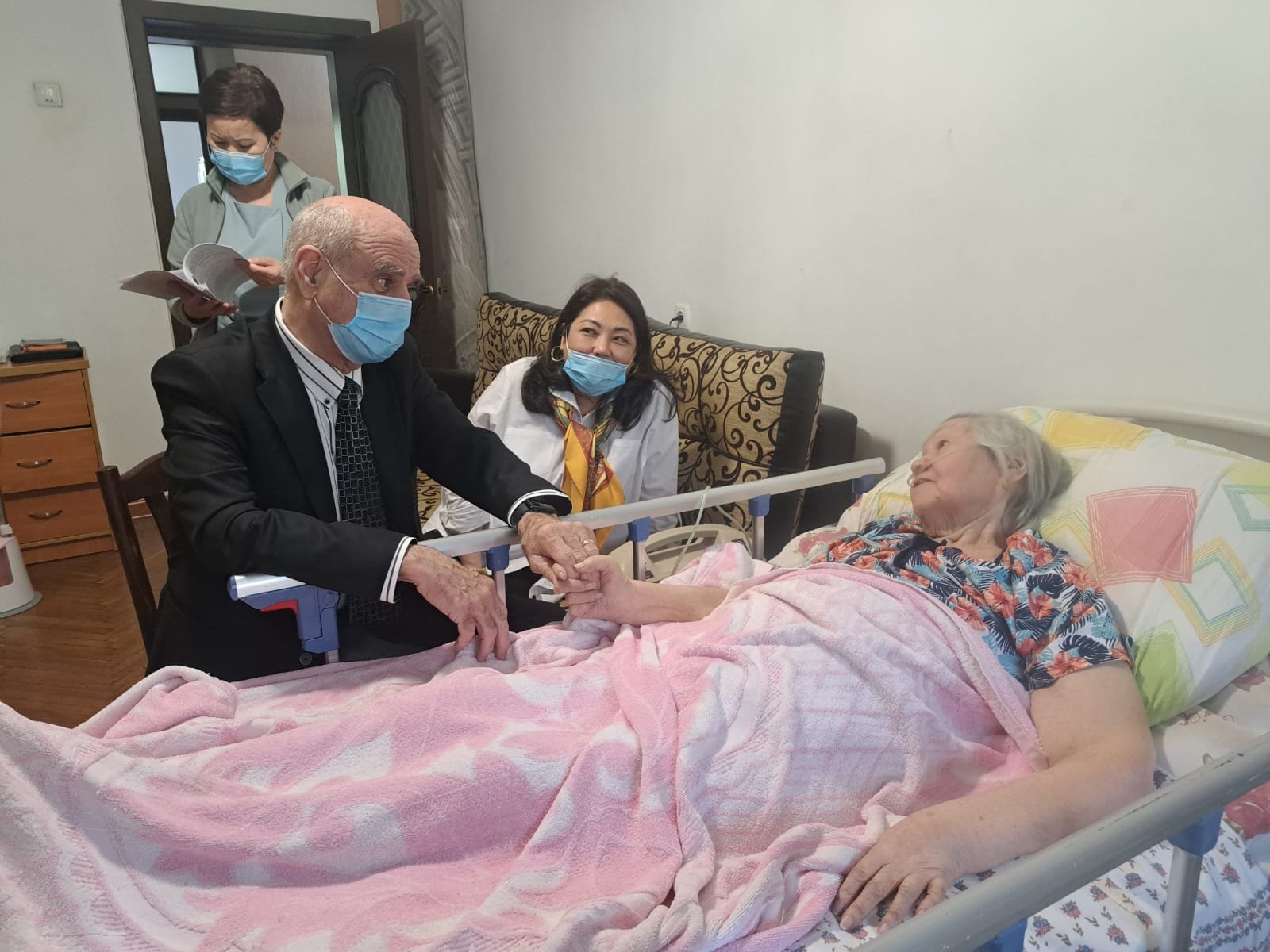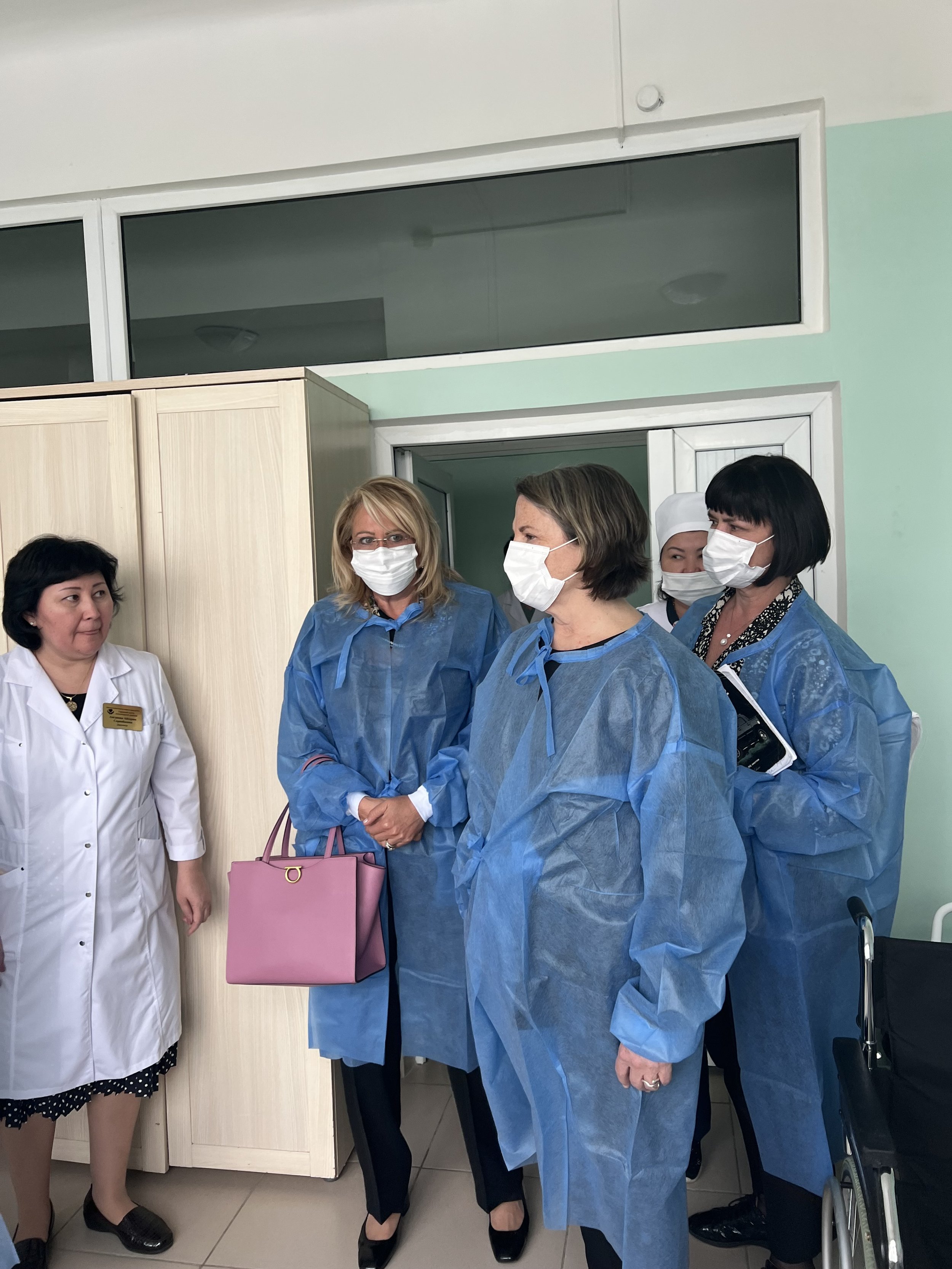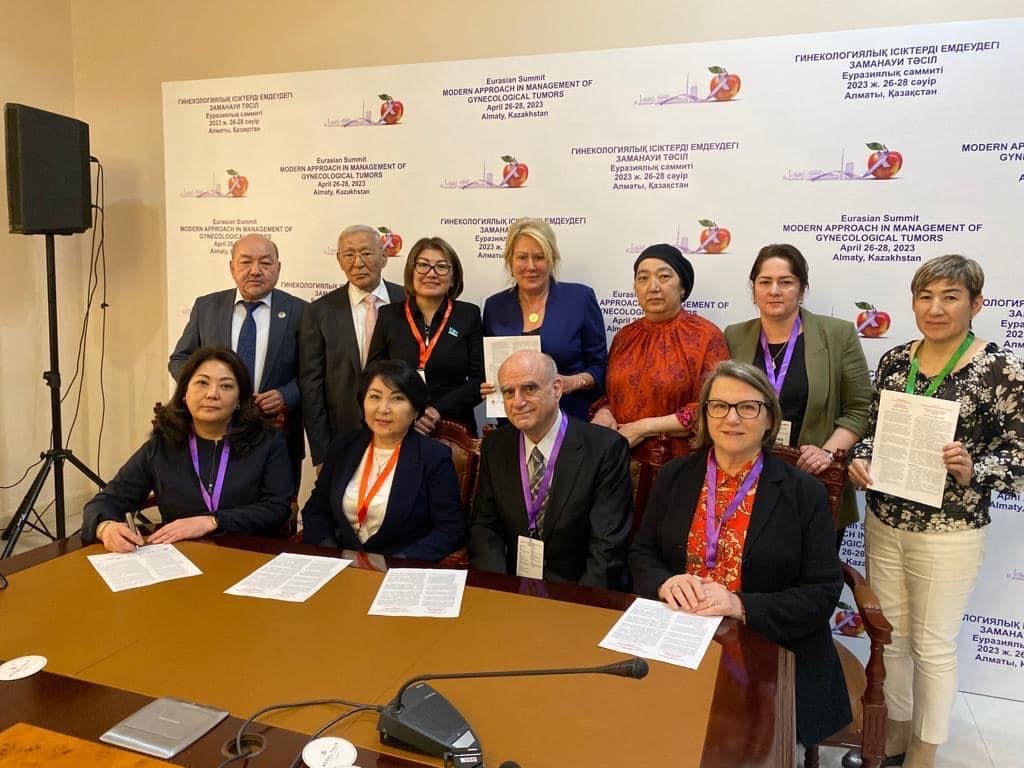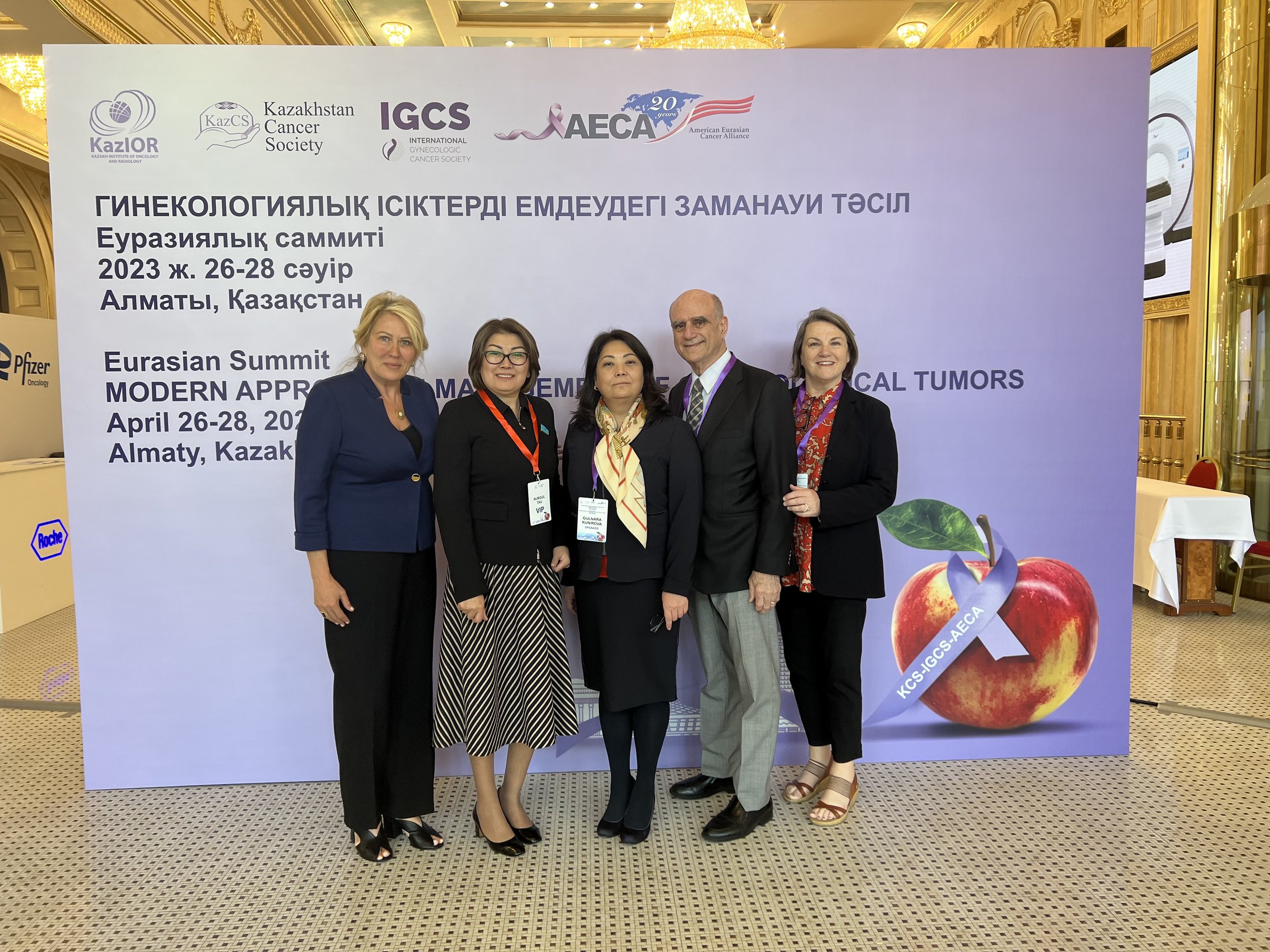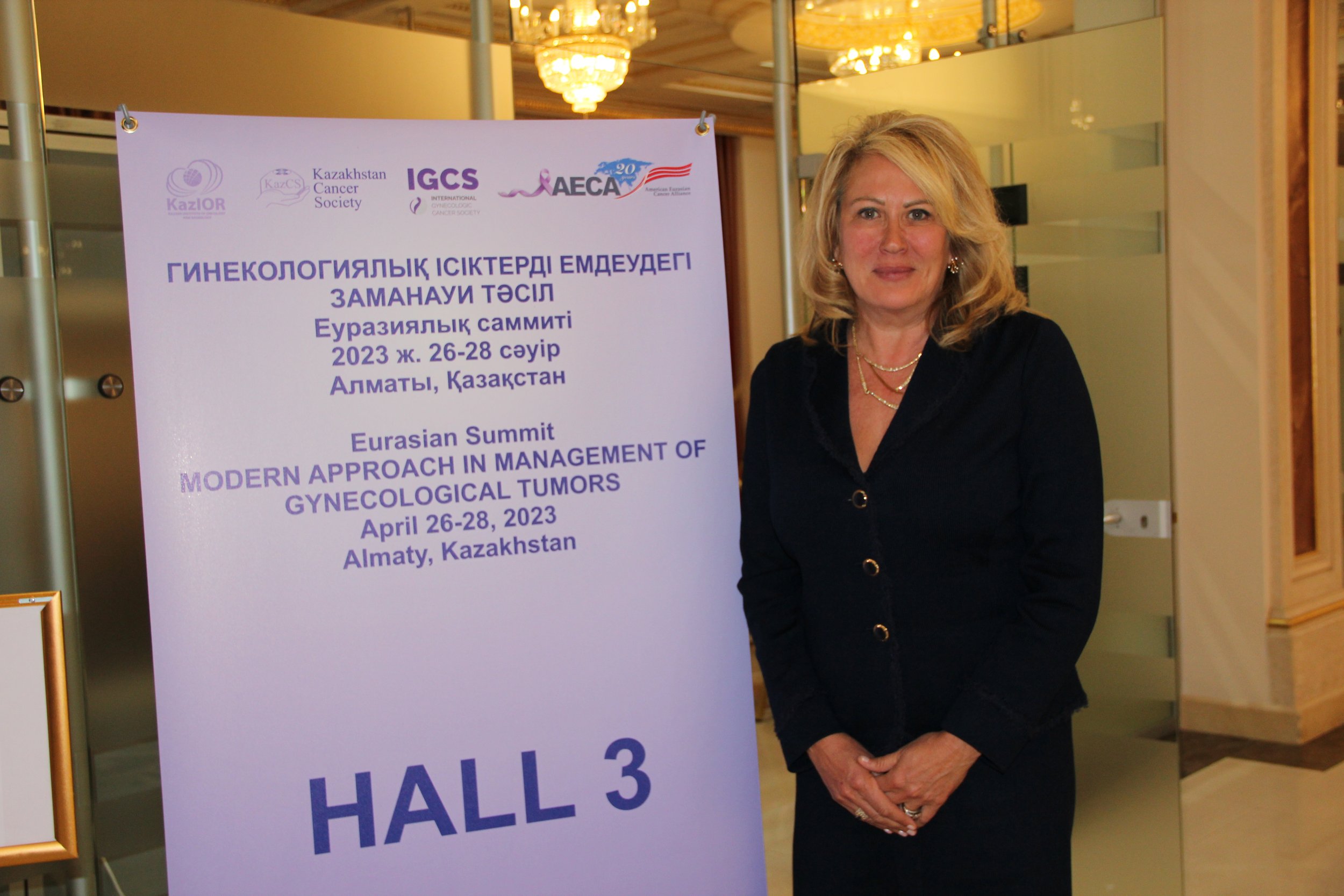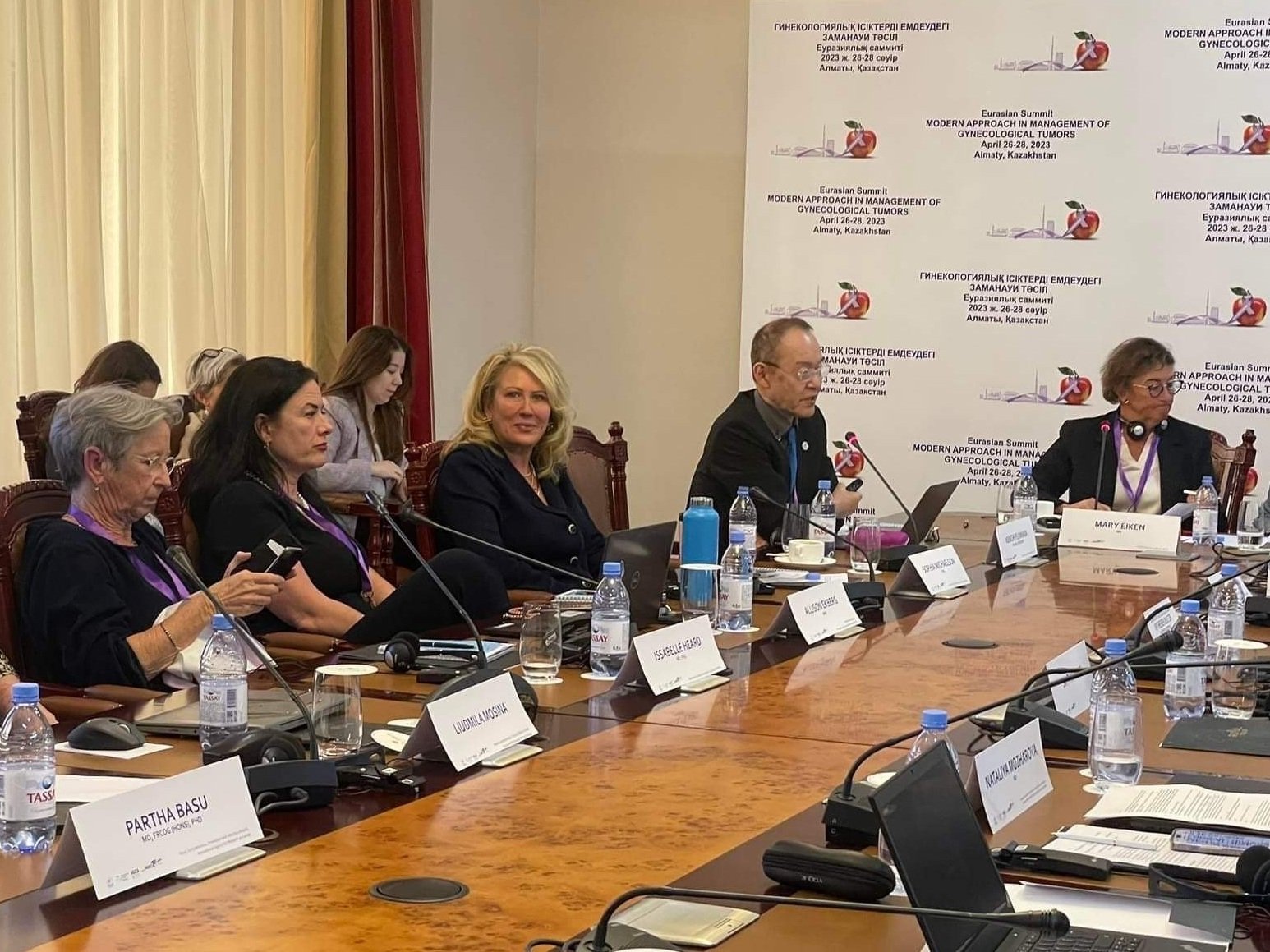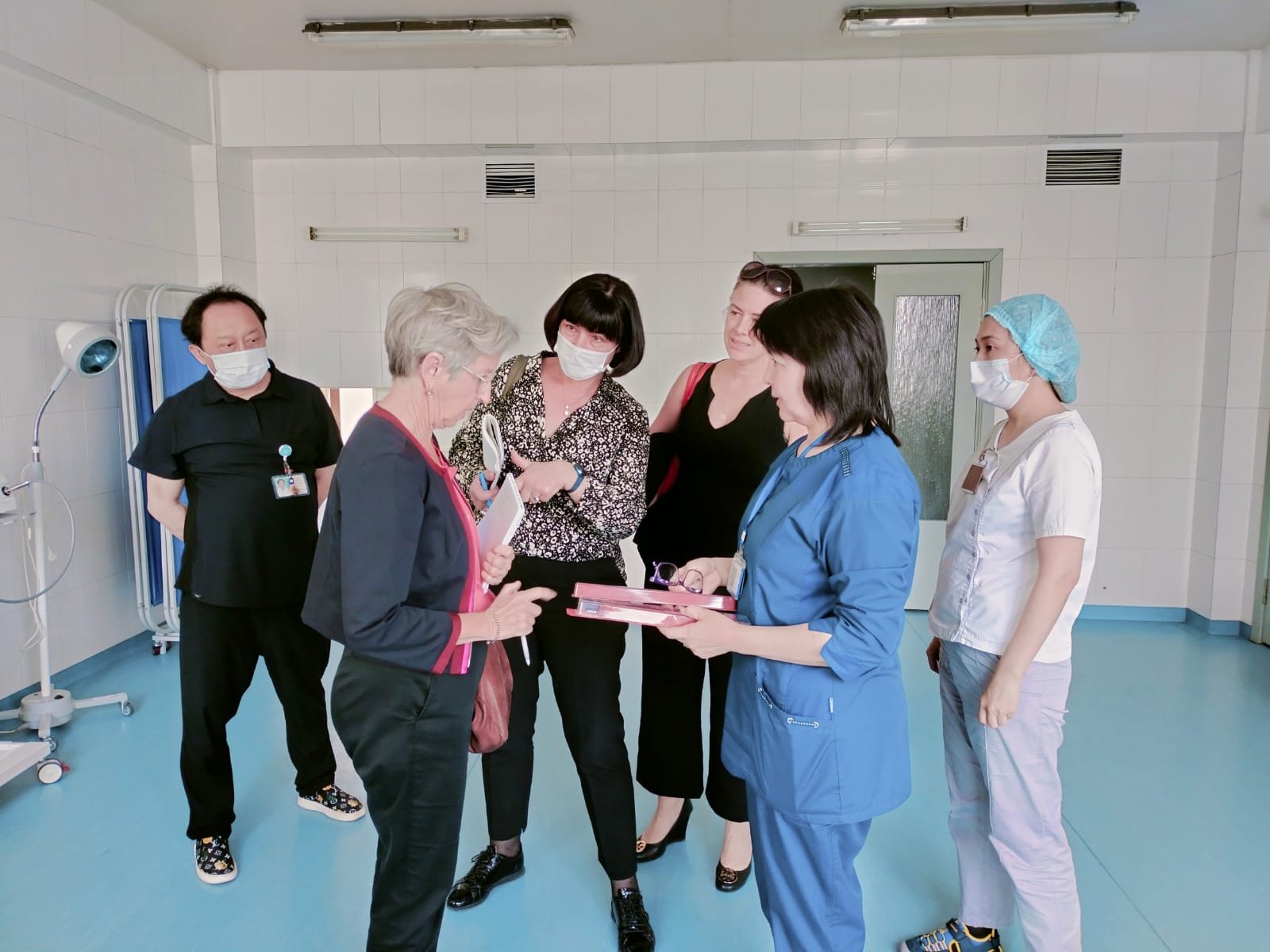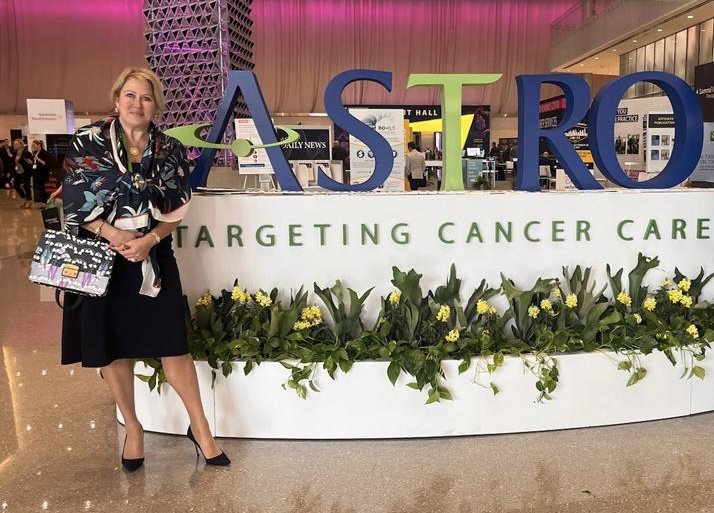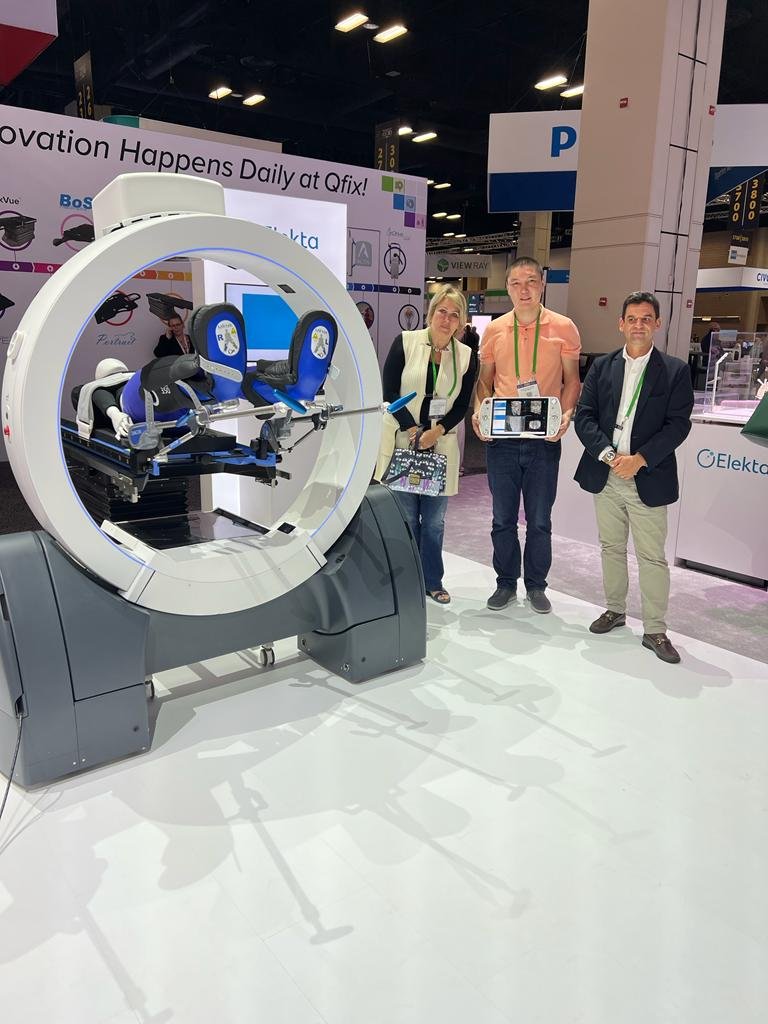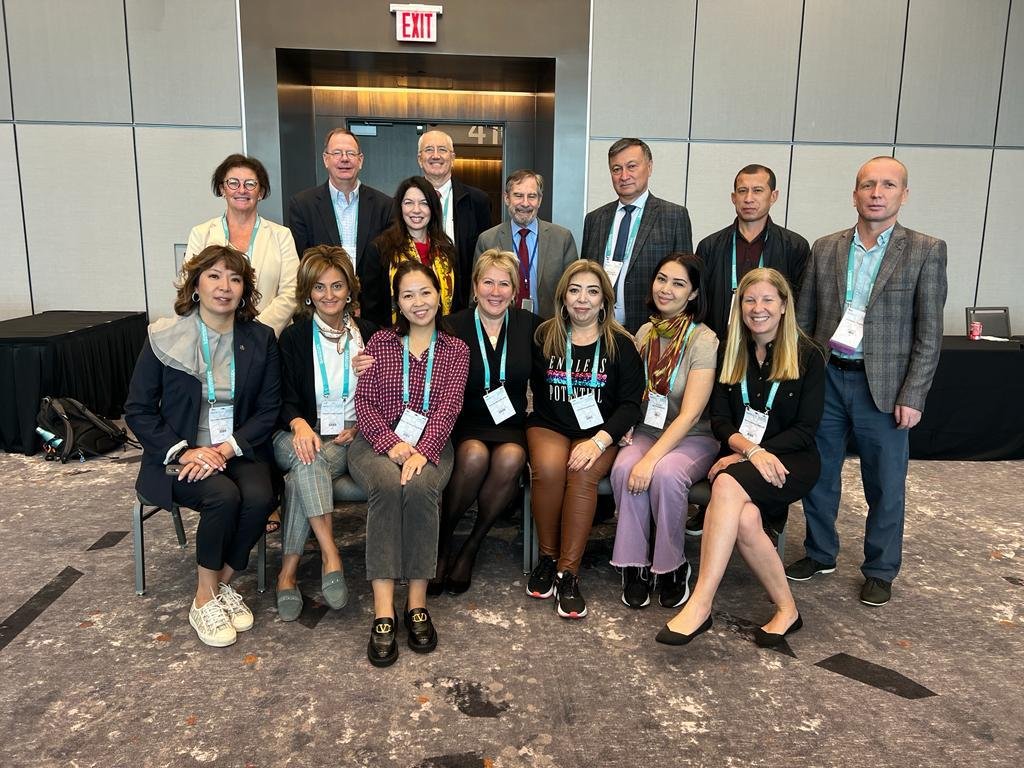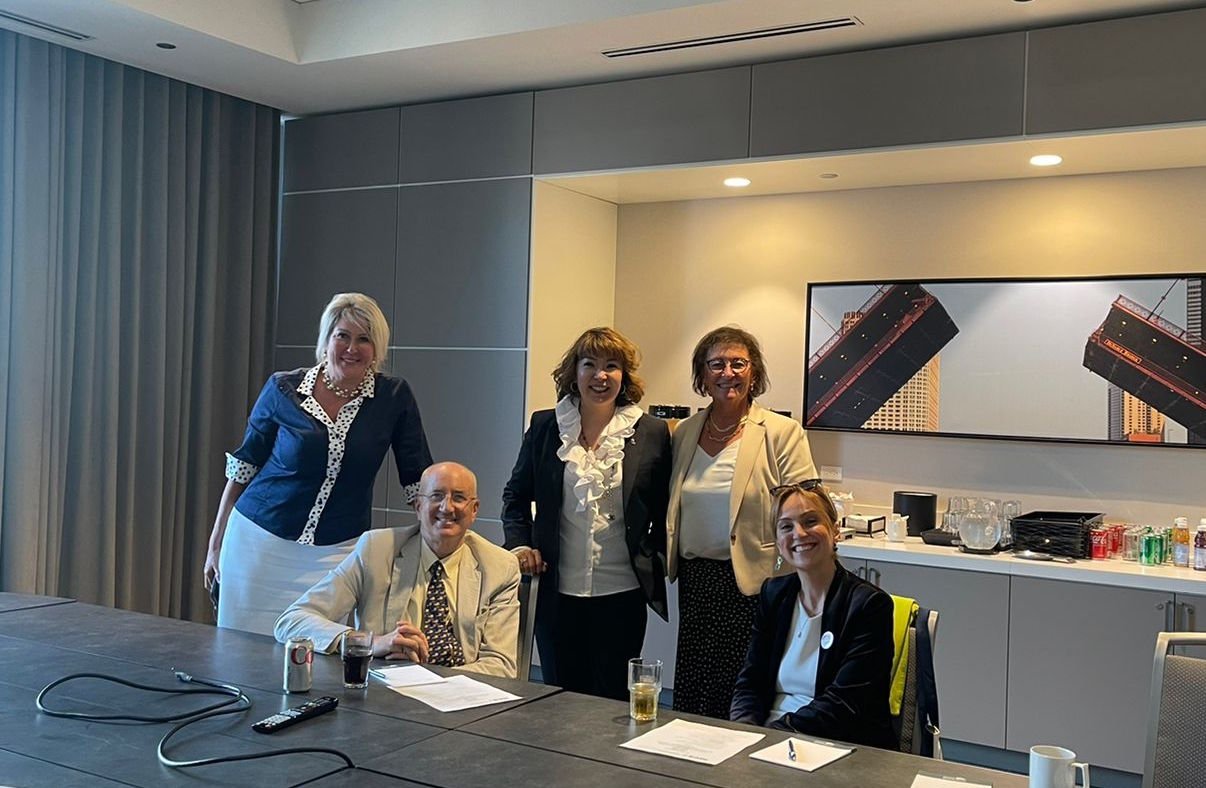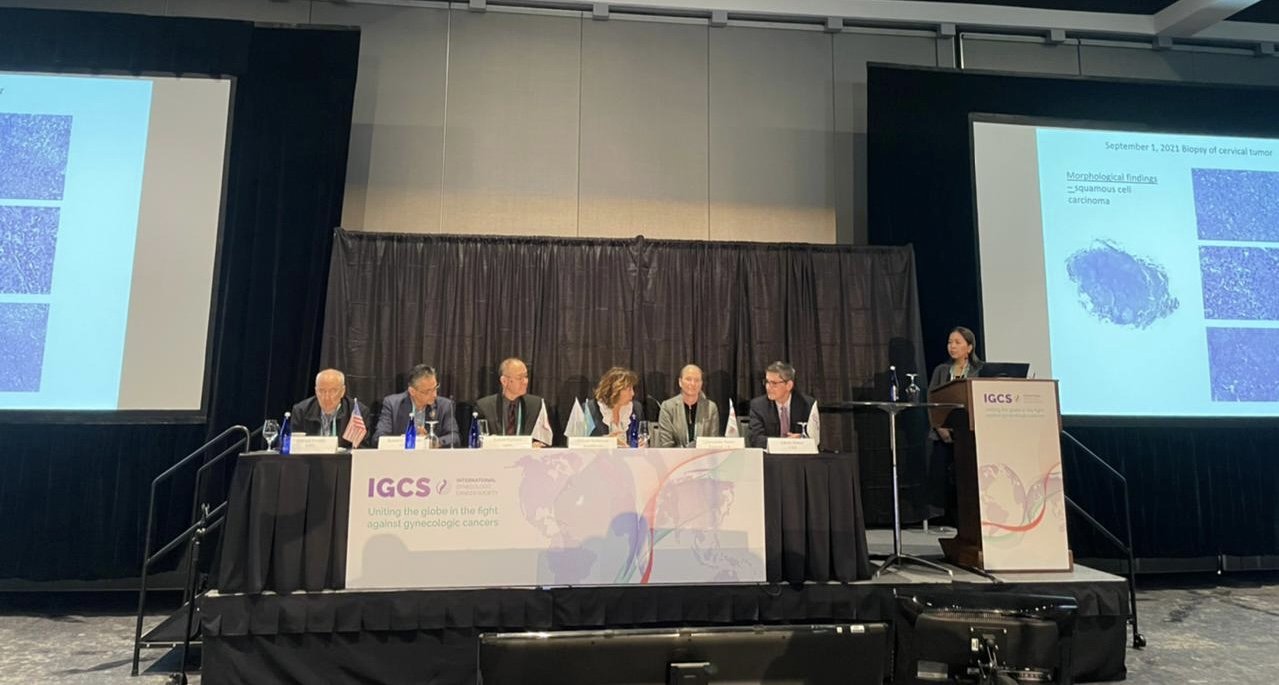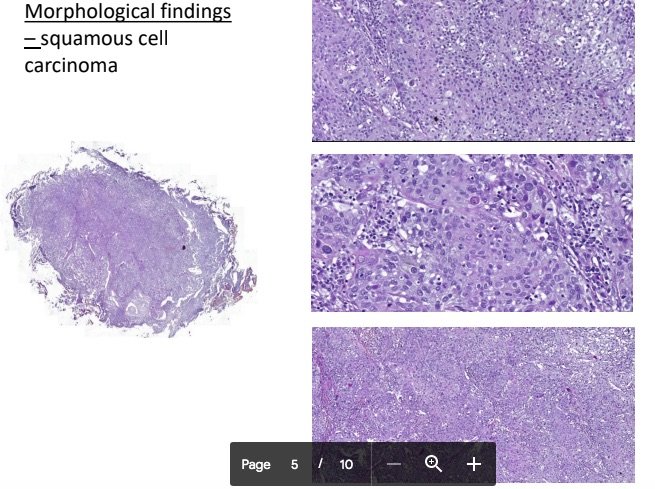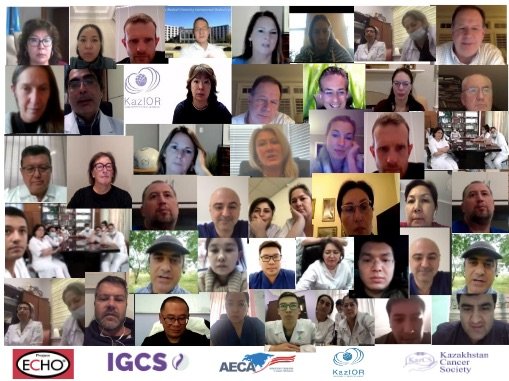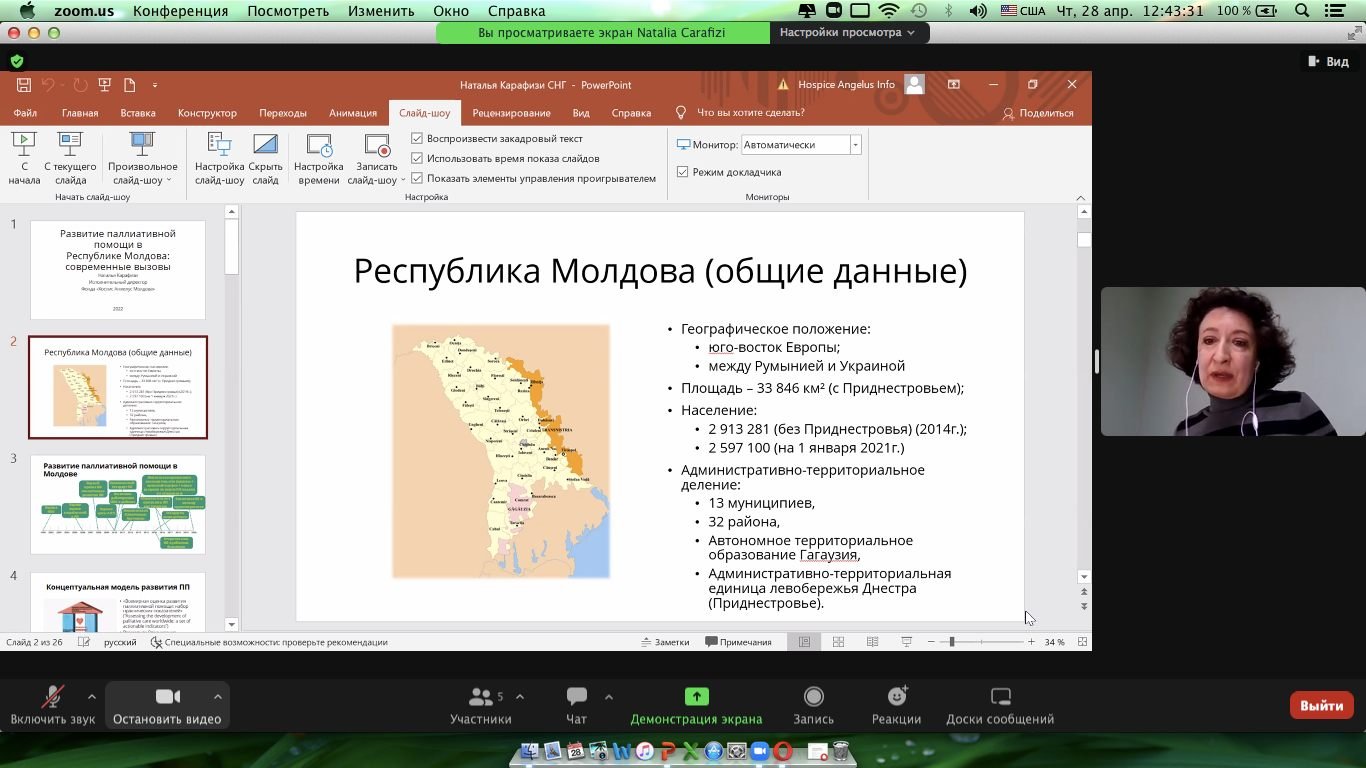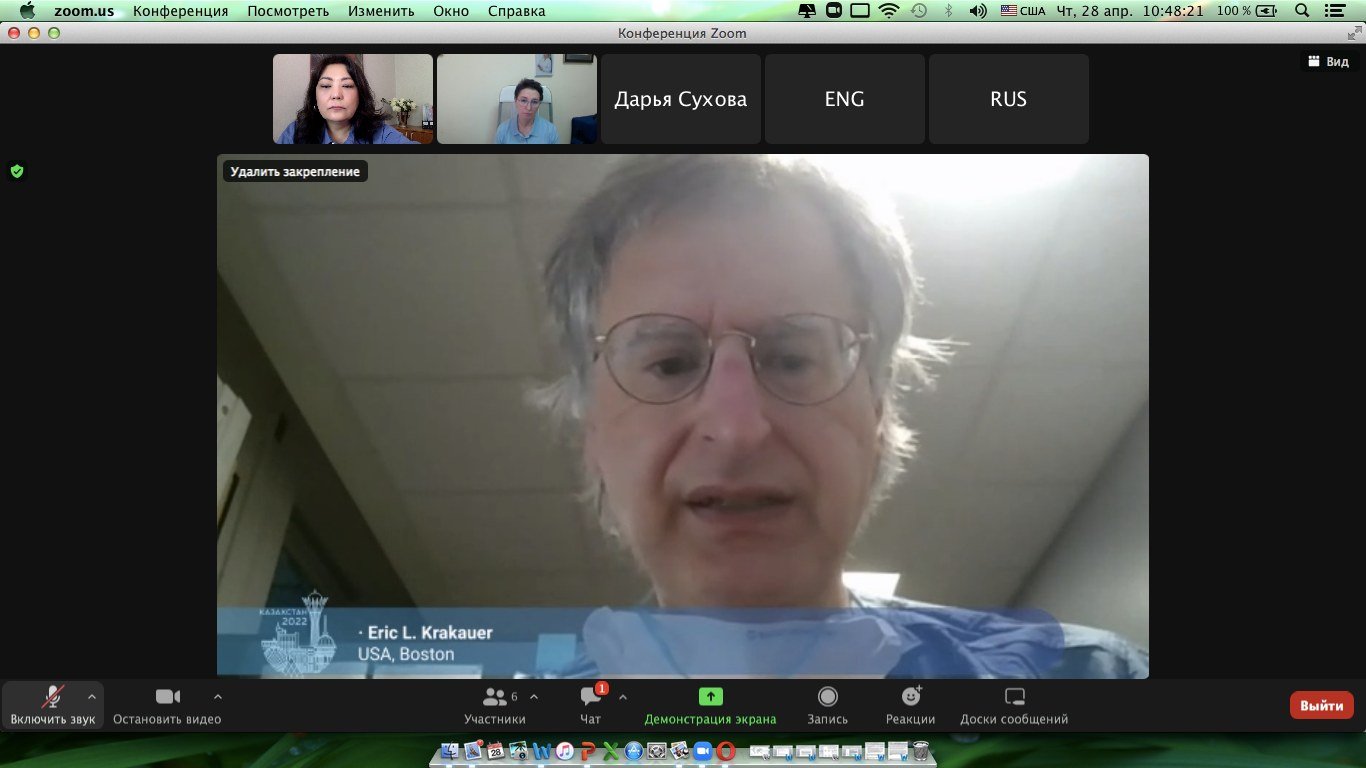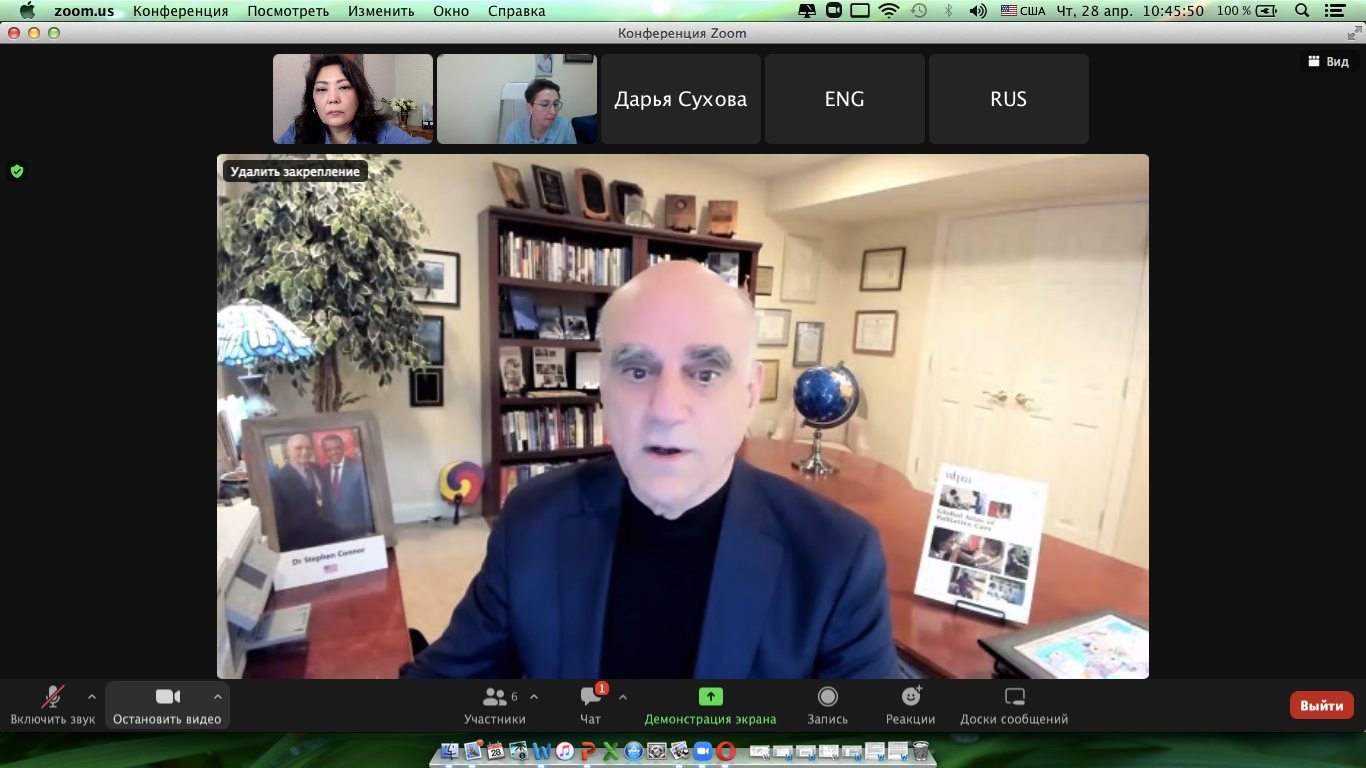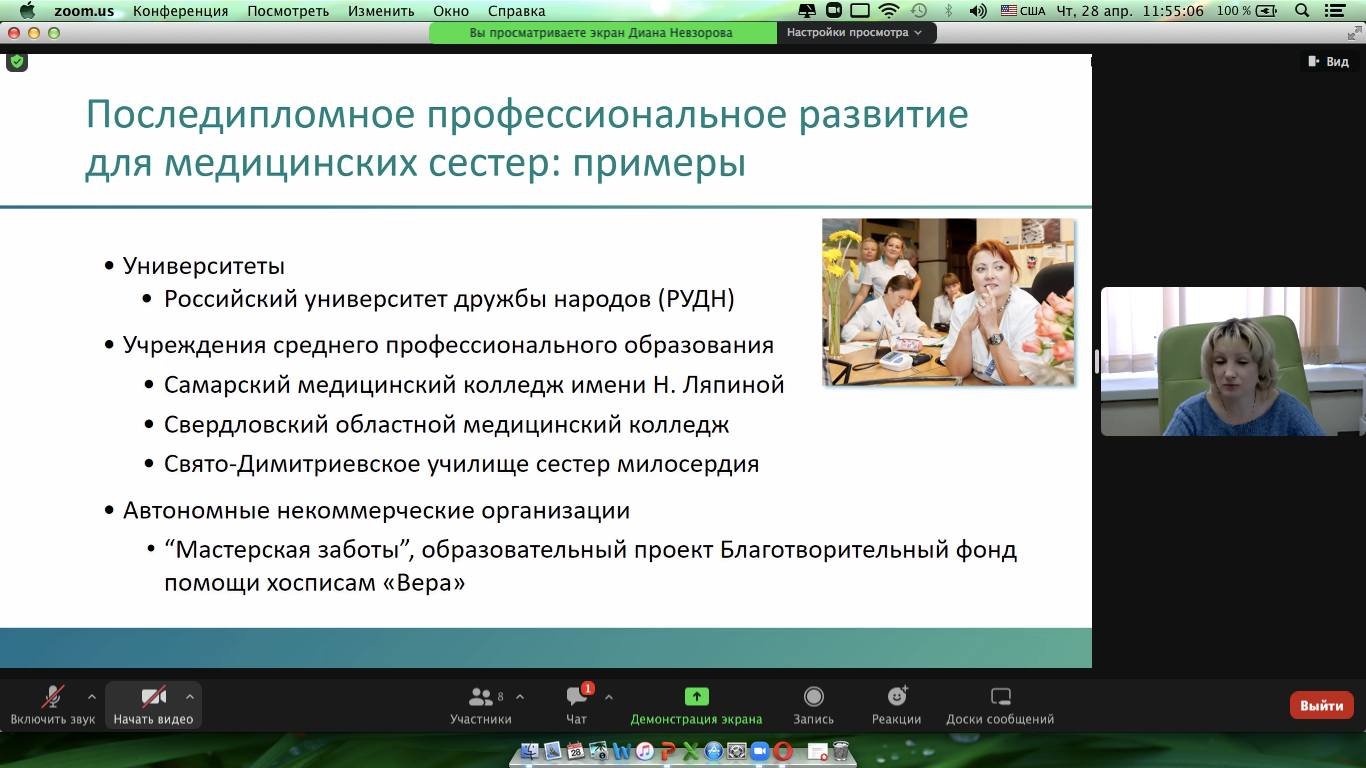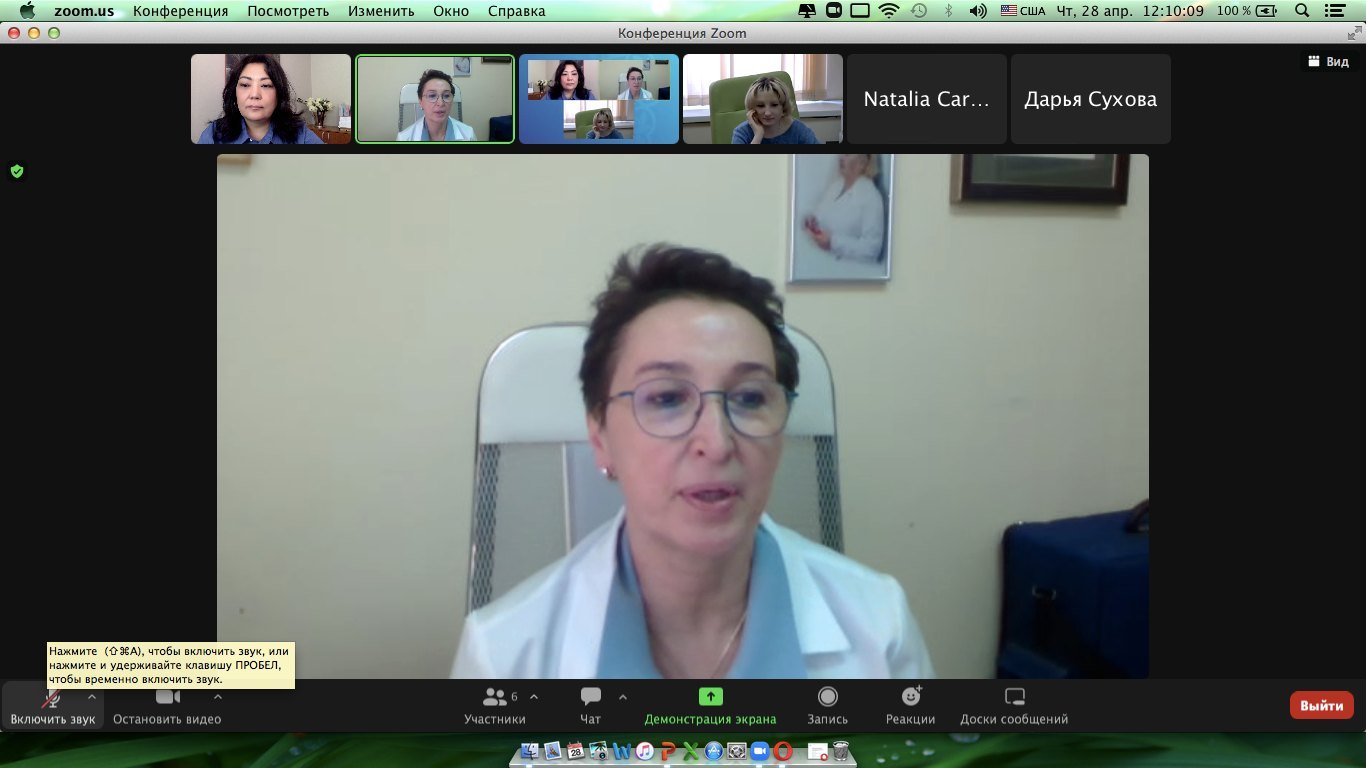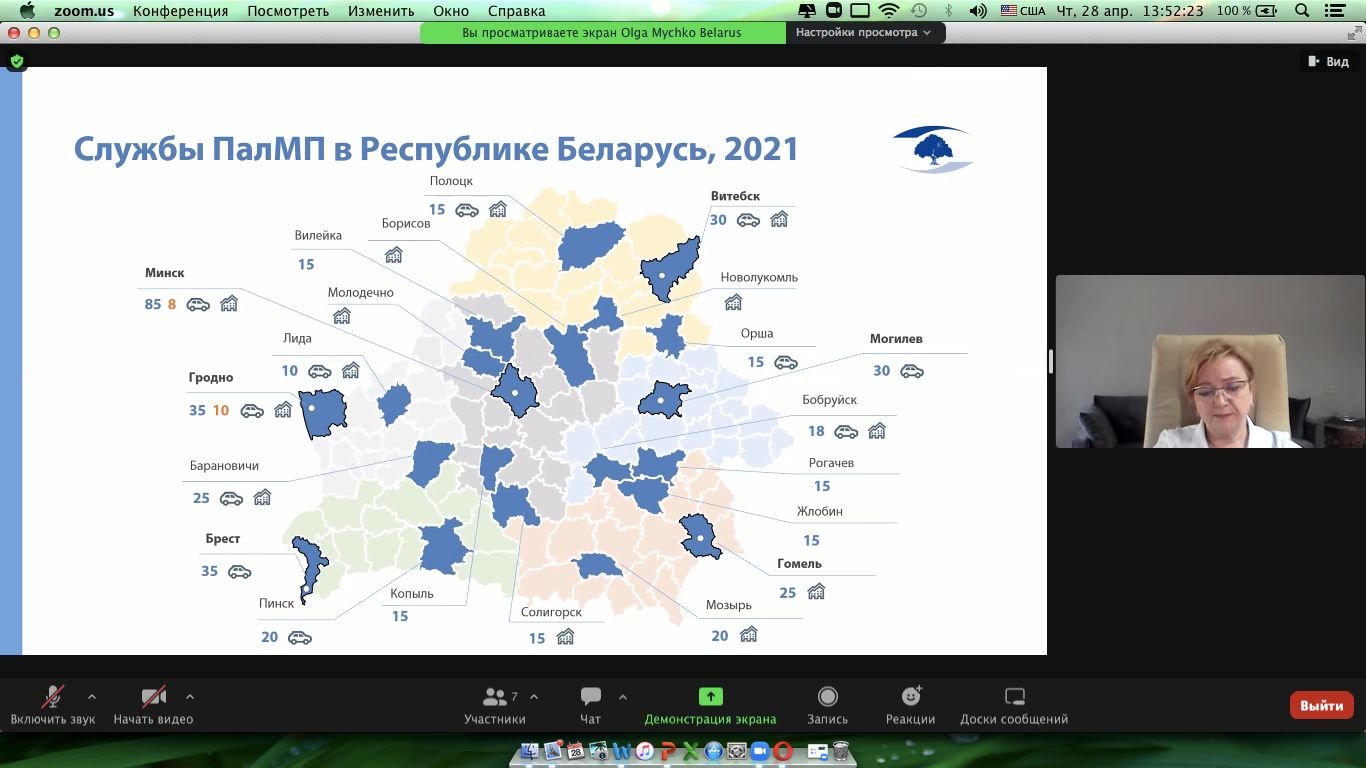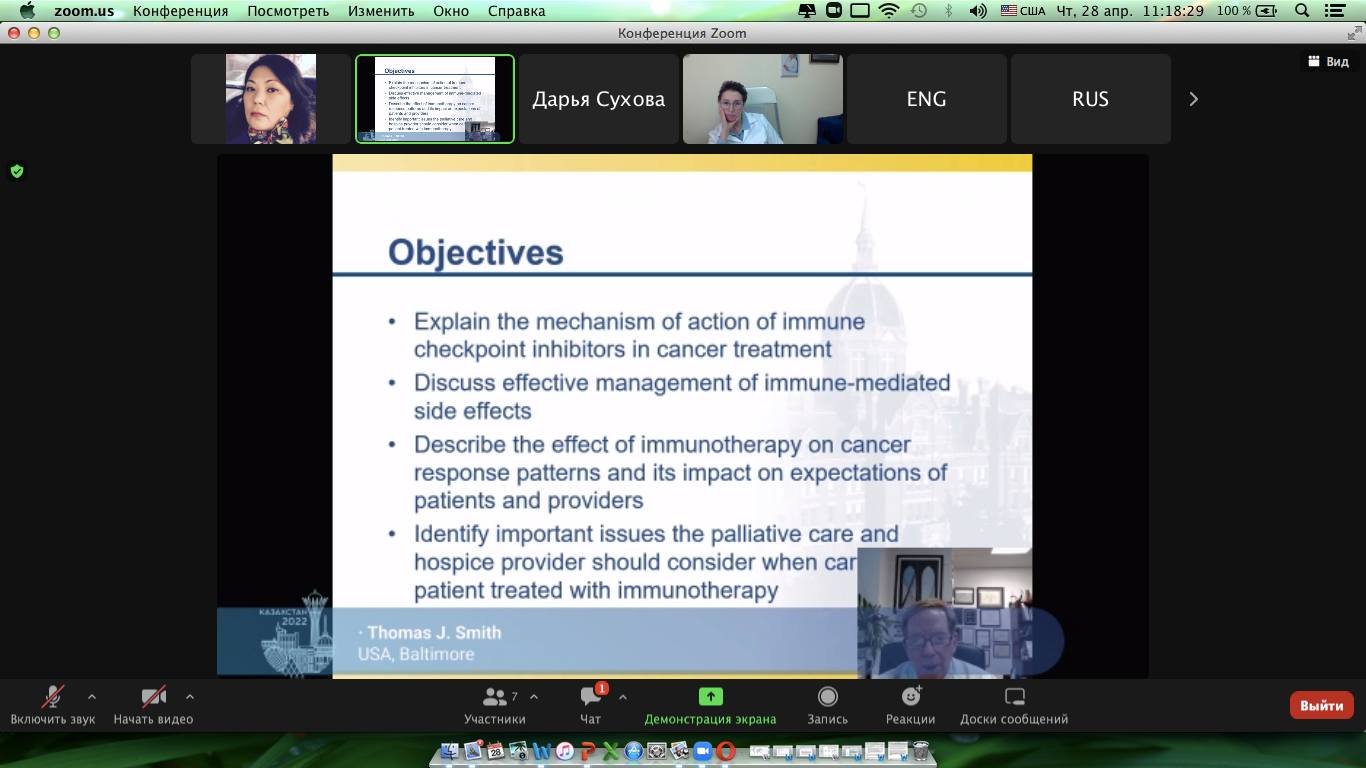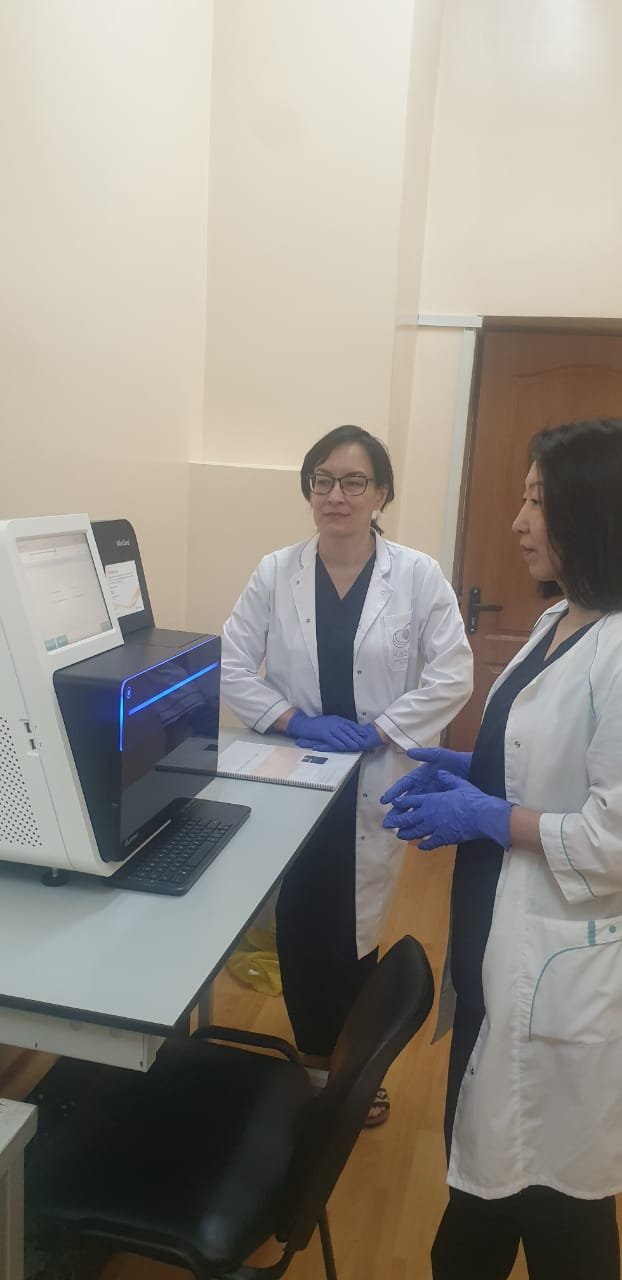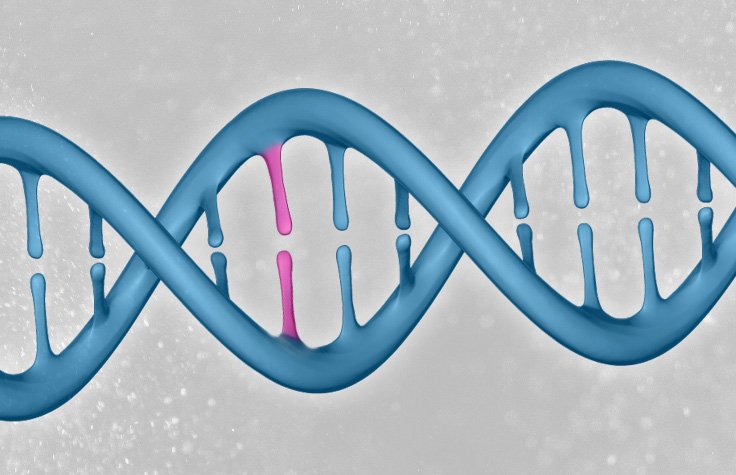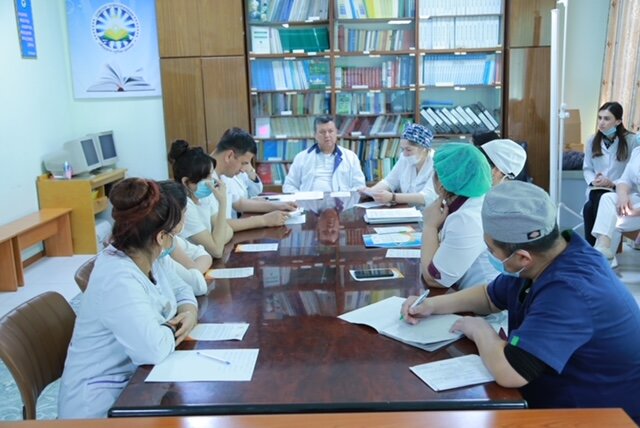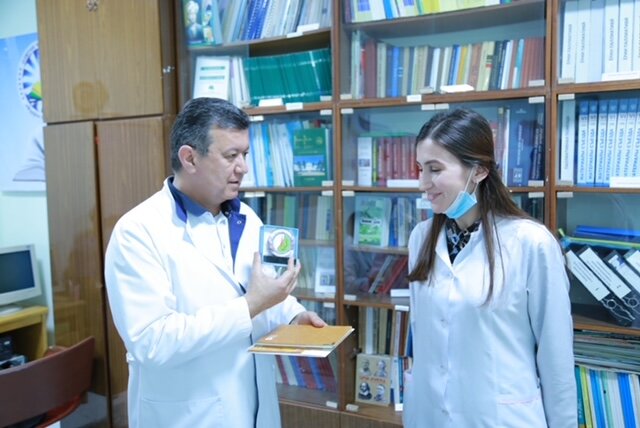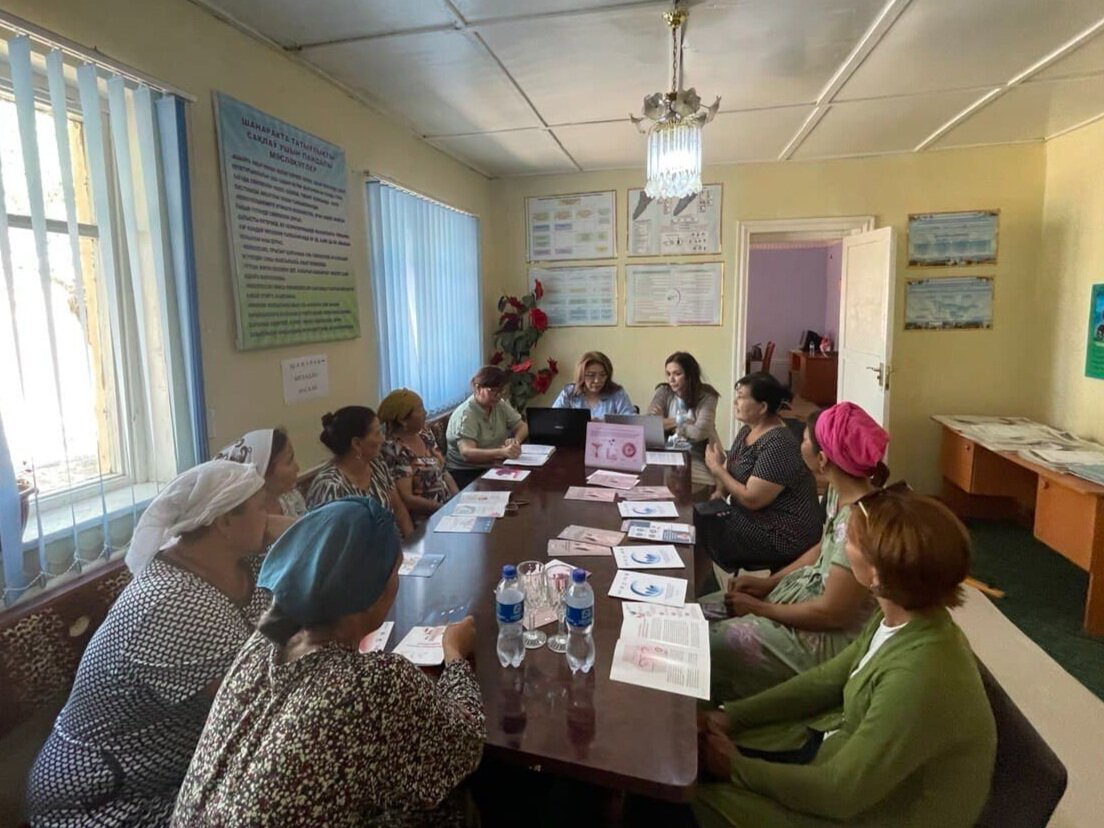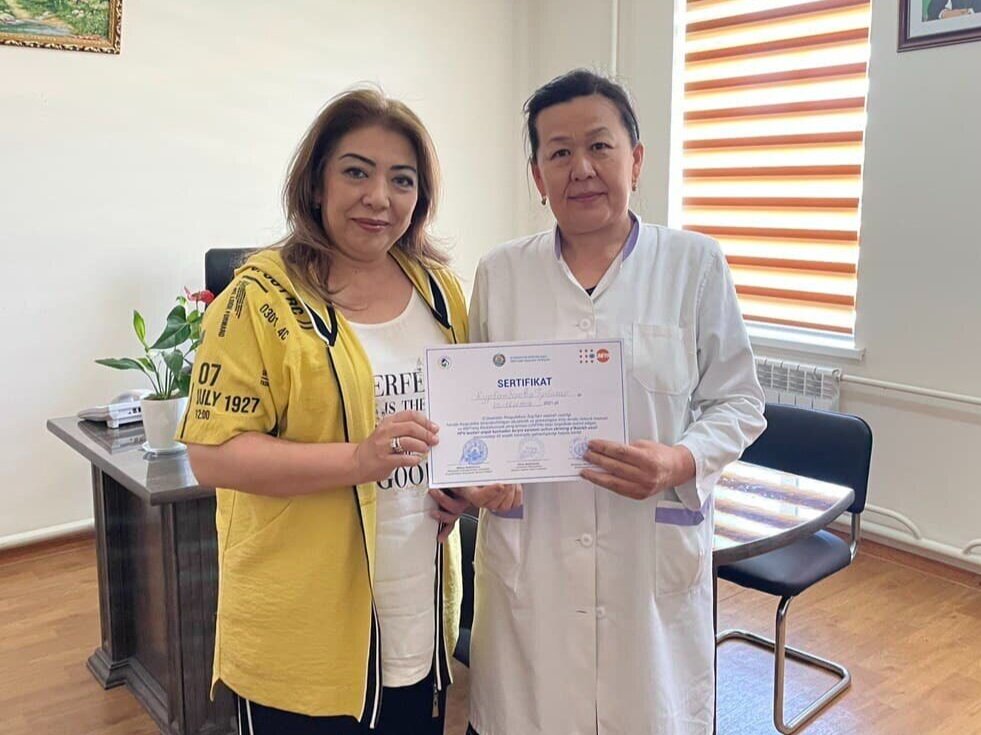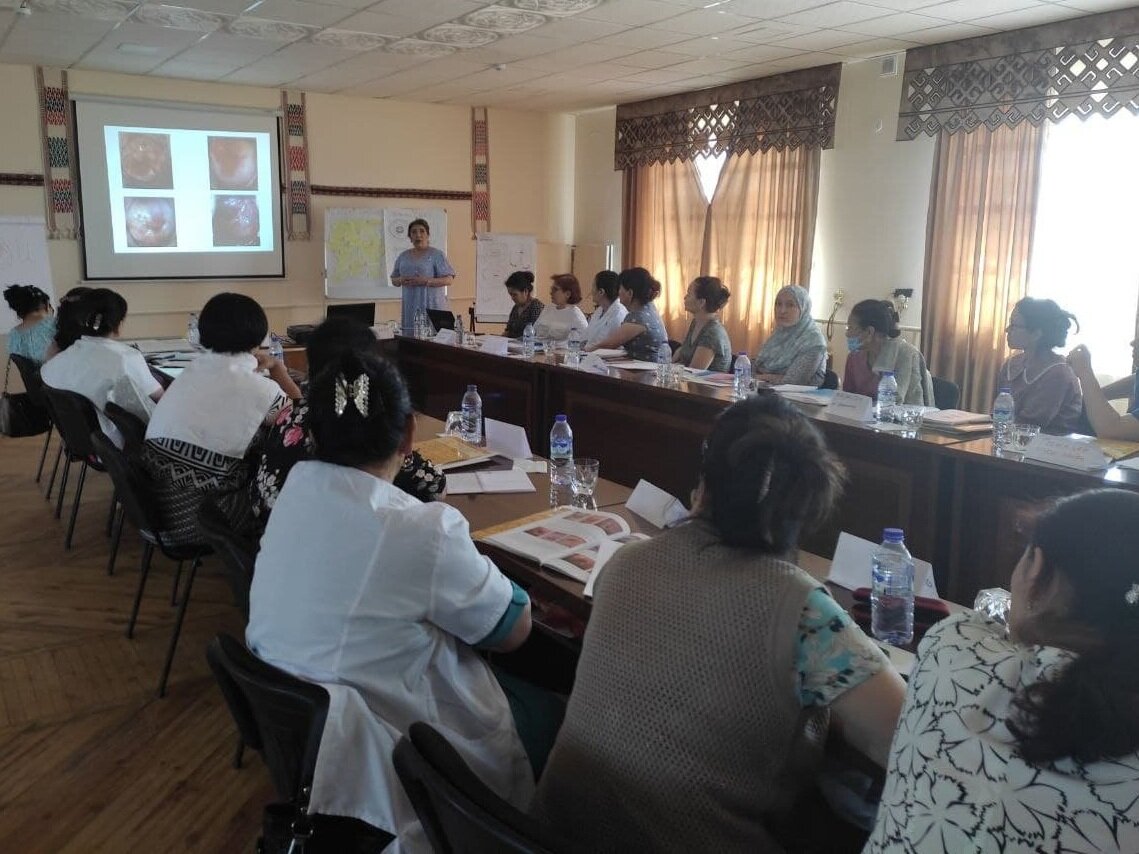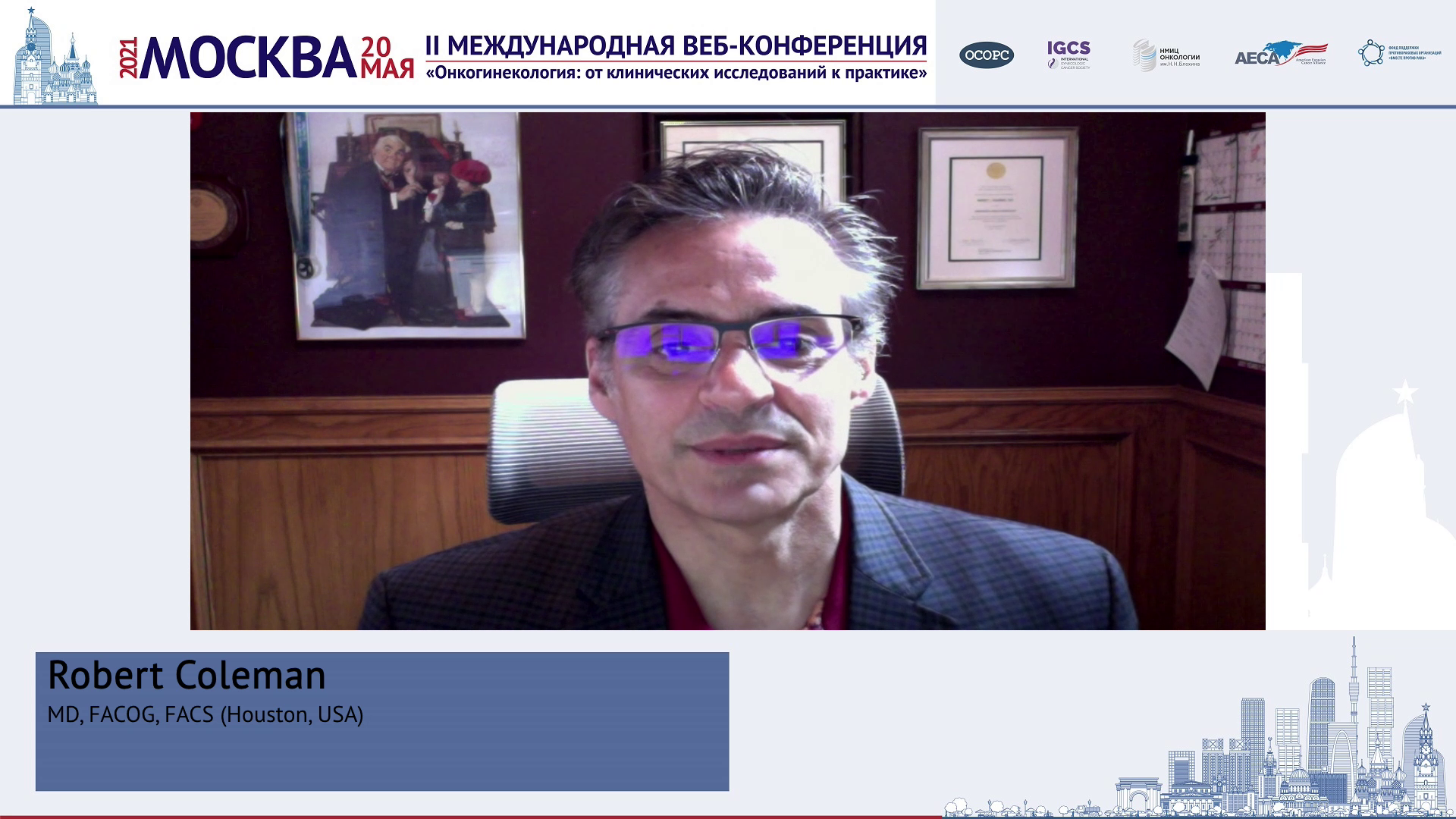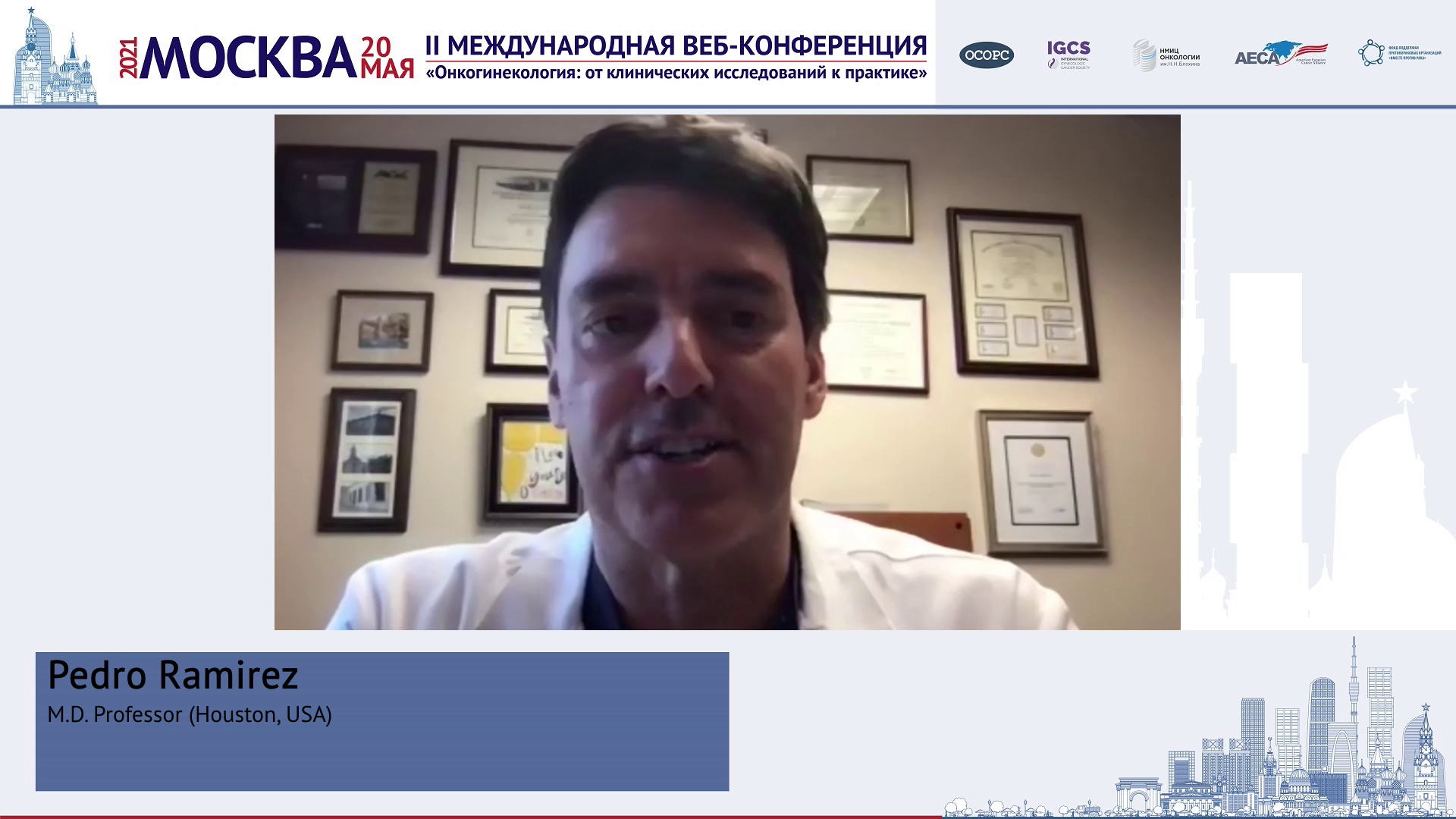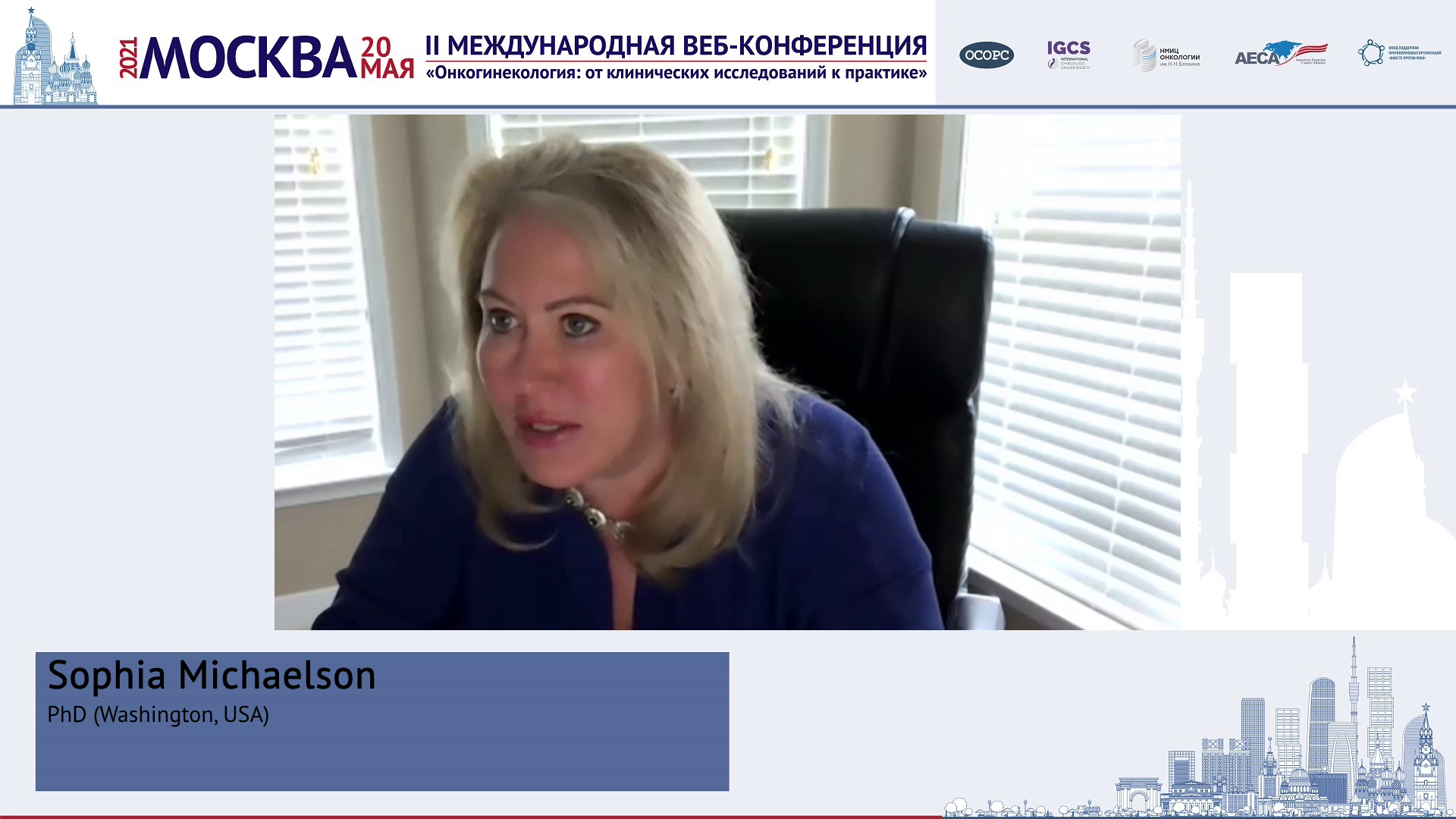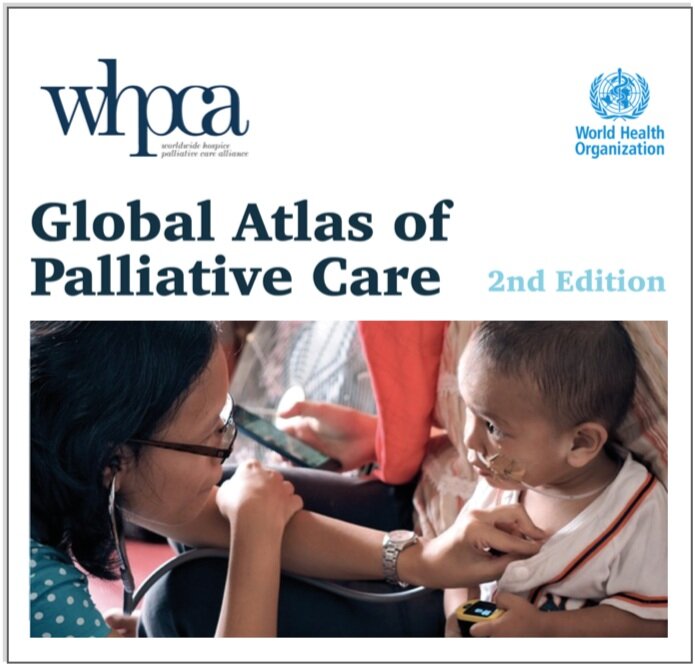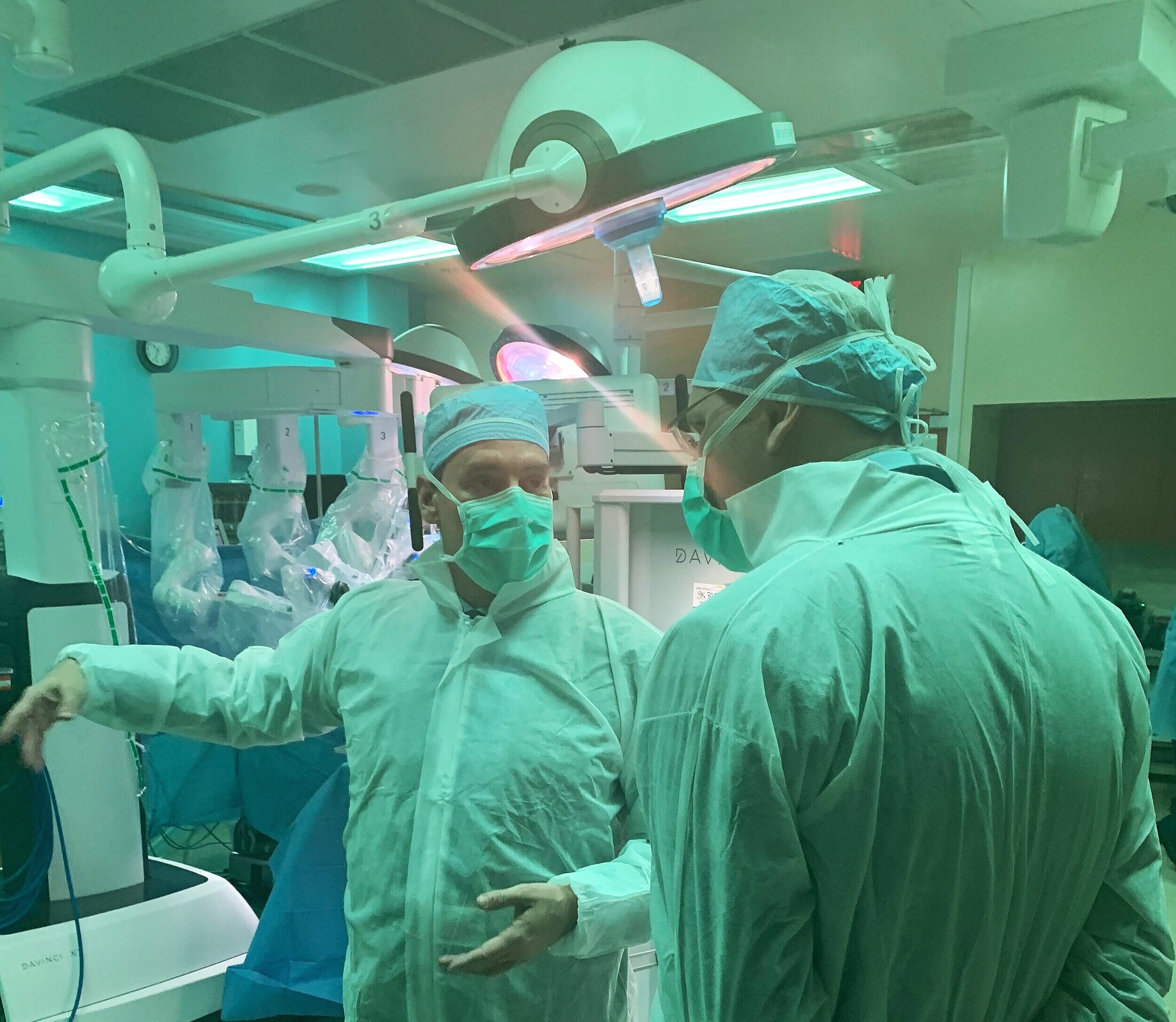TOP DEVELOPMENTS
Newsletter
Progress Report 2024
Gynecological Brief 2022
Special Edition 2021
Spring 2020
Winter 2019/20
Fall 2019
International GYN Success Encapsulates AECA Cancer Research Activities
In 2024, gynecological oncology efforts were at the forefront of AECA’s programmatic efforts, building on decades of individual, organizational, and national capacity building across the Eurasian perimeter.
At the IGCS Annual Global Meeting in Dublin, Ireland, AECA held meetings with Eurasian stakeholders to discuss impacts of new cervical cancer workshops, national efforts to promote HPV vaccination, opportunities to expand the international tumor board collaboration, and topical priorities for cancer control initiatives in 2025. AECA also encouraged regional oncology leaders to engage with the IGCS platform in greater capacities, materializing in multiple abstract submissions from Eurasian scientific leaders which are now published in the International Journal of Gynecological Cancer. Peer reviewed research serves as a tangible result of AECA efforts by promoting regional research capabilities and disseminating novel scientific discoveries to global stakeholders.
AECA has also been in discussion with leaders from Ukraine following their commitment to champion global gynecological oncology strategic partnership efforts. This agreement followed engagement from other Eastern European and Central Asian nations. By further growing in this arena, Eurasian leaders not only become more aligned with regional standards of care, but identify opportunities to pool international resources and explore novel scientific and clinical research endeavors.
AECA will engage with oncology leaders across North America and Eurasia through the end of the year to bolster research in ovarian, cervical, and endometrial cancers and direct programmatic priorities into 2025. With the goal of advancing care for all women affected by gynecologic cancers, AECA will build programs to foster collaboration and strengthen the global cancer control community.
AECA Launches New Scientific Research and Dissemination Program
For more than two decades, AECA has contributed to tangible outcomes in global cancer control, directly impacting provider training and patient care. This year, tremendous progress has been made integrating Ukrainian oncology leaders into the global cancer control community. AECA coordinated for the Ukrainian Society of Gynecological Oncology to join the International Gynecologic Cancer Society, providing unparalleled access to and connection with colleagues and mentors around the world. In addition, AECA organized a tumor board case review which connects leading U.S. gynecology and palliative care leaders with counterparts in Ukraine and neighboring Eurasian countries. This work builds on longstanding efforts to strengthen Ukrainian research networks.
To ensure scientific and educational advancements within Ukraine are disseminated to the global community, AECA is leading the development of a scientific writing workshop to be facilitated by AECA clinical expert Pedro Ramirez, MD. One of the leading U.S. experts on clinical, research, and educational topics in gynecologic oncology, Dr. Ramirez currently serves as the Editor-in-Chief of the International Journal of Gynecological Cancer and Chair of the Department of Obstetrics & Gynecology at Houston Methodist Neal Cancer Center. The course will invite stakeholders across multiple specialties and throughout the Eurasian perimeter to learn how to communicate about research findings more effectively and expedite publication of abstracts and manuscripts. The session recording will be available to many Eurasian partners, further amplifying the scientific impact.
AECA has long been involved in developing programmatic and partnership activities, which have organically increased stakeholder capacity across the Eurasian peninsula in terms of research and dissemination. Many AECA partners have previously published in IJGC, including those representing institutions within Azerbaijan, Kazakhstan, Kyrgyzstan, Poland, Ukraine, and Uzbekistan. Notable publications include a discussion of oncogynecologic patients in Poland during the war in Ukraine and reporting of results from an international cohort study on cervical cancer. AECA will continue to increase partnering county capacity building and actively promote partner publications to ensure novel scientific findings are able to benefit both local and global cancer patient care and outcomes.
AECA Convenes Ongoing U.S.-Ukraine Collaboration
Leveraging years of experience developing palliative care coalitions and virtual platforms to connect international stakeholders, in July 2024 AECA launched a series of quarterly case conferences focused on improving the access to palliative care in Ukraine and nearby countries. The inaugural meeting detailed a case of palliative care provision for a cervical cancer patient, and the meeting resources have been shared with more than 150 medical professionals and healthcare administrators across the region. AECA selected this intersection of topics to align with WHO priorities in these areas and given that because so many women are diagnosed in late stages of cervical cancer, palliative care is an essential element of cervical cancer control.
While the provision of palliative care and pain relief has significantly improved in the country over recent years, the current landscape of end of life care in Ukraine is unable to meet the substantial burden of need, which is rapidly escalating due to the on-going conflict. The quarterly engagements serve as a platform to improve pain relief services through education and training of associated healthcare professionals. In addition to knowledge exchange specific to patient care provision, discussions will also touch on improving the country’s regulatory framework, facilitating access to relevant medications, and raising public awareness of end of life care.
Participation from AECA clinical experts at several leading U.S. institutions - including Johns Hopkins, Fox Chase Cancer Center, Stony Brook University, and Massachusetts General Hospital - is expected at this quarterly exchange. The forums also provide an opportunity for U.S. perspectives to be shared global and for Q&A between international colleagues to stimulate conversation and foster collaboration. AECA is also building on palliative care progress by working in close partnership with the Worldwide Hospice Palliative Care Alliance and Ukrainian healthcare leaders, who requested AECA and WHPCA support growing regional palliative care educational needs.
AECA Optimizes Global Cancer Control Platforms to Enhance Eurasian Expansion
AECA has developed a significant Eurasian presence through global platforms such as ASCO and ESMO, as they offer a unique opportunity to foster joint educational collaboration and scientific research efforts. AECA continues to leverage relevant international events to expand geographic reach into Central Europe and Eastern Asia and to further AECA’s ability to develop programs and policies throughout the Eurasian region.
For the past decade, AECA has been a productive partner of the American Society of Clinical Oncology (ASCO) - including AECA clinical experts serving on various committees and AECA’s development of a recurring Eurasian Best of ASCO event, which has brought renowned global research directly to countries that previously lacked access. Attended by hundreds of individuals across the globe previously, the Eurasian Best of ASCO is back again due to popular demand.
At the 2024 event, discussions will focus on lung, gastrointestinal, breast, and gynecological cancers due to the high prevalence of these cancer sites in the region, especially in late stages when the disease is more advanced. Conference sessions topics include durvalumab as consolidation treatment for patients with limited-stage small-cell lung cancer, results after adjuvant chemotherapy +/- chemoradiation for patients with resected periampullary pancreatic adenocarcinoma, baseline characteristics and efficacy endpoints for patients with node-negative HR+/HER-early breast cancer, and more. AECA Public Health Advisor Dr. Otis Brawley will present opening remarks and several AECA Eurasian partners - representing Northern and Central Asia - will deliver scientific presentations at the event. AECA looks forward to both expanded and deepened partnerships with leading international health organizations to further catalyze cancer control research and education.
AECA Joins Global Organizations at Eurasian Cancer Congress
At the Republican Scientific and Practical Conference of Oncologists and Radiologists in Bukhara, Uzbekistan, AECA joined global cancer control leaders prioritizing women’s health throughout Eurasia, including stakeholders from the WHO Regional Office, IARC, UNFPA, and IPVS. AECA Executive Director Dr. Sophia Michaelson presented on the Alliance’s accomplishments and regional program expansion.
This year, the focus of the conference was women’s health, with many presentations addressing breast and cervical cancer. AECA brought international collaborators into the program to ensure the highest quality of scientific and educational exchange. An AECA stakeholder from the Levine Cancer Institute presented on international recommendations for the treatment of early stage breast cancer. Longtime AECA clinical expert Dr. Stephen Connor of the World Hospice and Palliative Care Alliance, jointly with AECA’s Dr. Michaelson, incorporated palliative care elements in the event to ensure topics along the cancer continuum were addressed. The conference closed with a live master class on colposcopy and thermal ablation techniques, providing real-time transfer of training techniques to international clinicians. AECA will continue to support multidisciplinary educational opportunities and remains committed to supporting hands-on training, early screening, and cancer prevention efforts.
As one of the Alliance’s strategic priorities in 2024, AECA is engaging with international stakeholders to move the needle forward on pediatric and childhood cancer research, treatment, and education. In April, as part of the Global Platform for Access to Childhood Cancer Medicines project, cancer control leaders from the WHO Regional Office for Europe, UNICEF, and St. Jude Children’s Research Hospital will hold a visit and roundtable discussion in Uzbekistan. Longstanding AECA clinical experts representing the Cancer Center Republic of Uzbekistan will participate in the event, following successful national efforts to prevent cervical cancer through HPV vaccination in Uzbekistan.
The roundtable session will discuss existing gaps in pediatric oncology with the national working group and provide technical support to national experts on minimum standards for obtaining medical chemotherapy drugs. Dr. Asheena Khalakdina, Head of WHO Country Office in Uzbekistan, will also present on the global strategy of National Cancer Control Programs, an effort supported by AECA within Eurasian countries for more than two decades. AECA is working diligently toward survivorship among pediatric cancer patients, following the direction of the WHO Global Initiative on Childhood Cancer to combat inequities in childhood cancer survival in different countries, especially within low- and middle-income countries.
AECA Assembles European Experts in Expanding Cancer Control Platform
Following successful programmatic expansion into the European platform as part of AECA’s 2024 strategic goals, AECA sustained this geographic engagement through an April convening. Alongside international partners, AECA joined the organizing committee of a scientific exchange focused on the treatment of pelvic tumors. Hosted in Ukraine through the nation’s National Cancer Institute and Ivano-Frankivsk National Medical University, the conference program featured presentations on breast, cervical, ovarian, colorectal, and rectal cancer, as well as surgical techniques including a live surgery preview.
Through these international platforms, AECA unites clinical and educational professionals across Europe, Asia, and North America. U.S. presenters included oncology leaders from Mass General Cancer Center and Northwestern University Feinberg School of Medicine. With a growing roster of Ukrainian cancer control experts within the Alliance’s network, AECA will continue to elevate the Eurasian oncology program with a focus on Eastern and Central Europe and encourage deepened partnerships with international colleagues.
Global Leaders Enhance Eurasian Palliative Care Services
AECA is uniting with leading experts from the U.S., Europe, and Asia to improve palliative care infrastructure within the Eurasian region. In May 2024, AECA, the Worldwide Hospice Palliative Care Association (WHPCA), and the Association of Palliative and Hospice Care (APHC) of Ukraine signed a memorandum of understanding which will serve as a framework for collective activities in palliative care research, training, and education. The three international organizations will also work toward improving regional policies to ensure Eurasian nations have the resources to fully support the physical and emotional needs of their patients.
This work builds on the recently established quarterly palliative care case review, which connects U.S. and Eurasian clinical leaders through a virtual platform. Simultaneously, AECA and WHPCA have collaborated on a proposal to provide technical assistance specific to palliative care within Uzbekistan. Engaging with multiple nations across the Eurasian perimeter ensures consistency in care across borders and that novel policy and training protocols are disseminated widely to care providers.
U.S. and Eurasian Partners Present on HPV and Cervical Cancer Screening at EUROGIN 2023
While AECA clinical experts have been presenting at the EUropean Research Organisation on Genital Infection and Neoplasia (EUROGIN) conference for years, this year AECA had a more substantial role in event programming. Held in Stockholm, Sweden, representatives from the National Cancer Institute (NCI) and several Eurasian countries, including Kazakhstan and Uzbekistan, were in attendance. The conference program demonstrates robust presentations on HPV and cervical cancer topic, including several NCI speakers: Dr. Vikrant Sahasrabuddhe (Division of Cancer Prevention), Dr. Megan Clarke (Division of Cancer Epidemiology & Genetics), Dr. Nicolas Wentzensen (Division of Cancer Epidemiology & Genetics).
Longstanding AECA clinical expert Dr. Nargiza Zakhirova of the Cancer Center Republic of Uzbekistan shared details about a pilot project for cervical cancer screening by HPV testing in Uzbekistan. Key findings from the project highlighted the lack of information exchange and clinical guidelines within the region for HPV prevention and cancer screening, as well as a need for increased educational opportunities for medical personnel.
Given AECA’s focus on cervical cancer prevention and treatment, in alignment with guidelines set out by WHO and the U.S. NCI, the Alliance will continue to work with Eurasian countries on cervical cancer elimination priorities and identify opportunities for national leaders to improve regional standards and training programs.
Ukraine Joins International Gynecological Oncology Efforts
Due to diligent AECA efforts for more than a decade, the Ukrainian nation is now more integrated than ever in global and Eurasian cancer control platforms. The International Gynecologic Cancer Society recently announced that the Ukrainian Society of Gynecologic Oncology has joined the IGCS Strategic Alliance Partner Program, following years of coordinated engagement from ICGS and AECA stakeholders. This news confirms that 30 Ukrainian gynecologic cancer specialists now benefit from vast resources and expertise of the international gynecologic cancer community.
As part of this development, AECA has been serving on the development committee for recurring quarterly virtual tumor board meetings between Ukrainian and American pathologists, radiation oncologists, and clinicians. This engagement fosters knowledge exchange of prevention, screening, and treatment topics among diverse populations, as well as establish new avenues of collaboration among international counterparts. The inaugural session hosted nearly 300 attendees both in-person and virtually, from countries such as Ukraine, USA, Austria, and Poland. AECA will continue to solidify stakeholder engagement both within the IGCS platform and among other international partners, further expanding engagement throughout the European perimeter to increase global oncology efforts worldwide.
AECA Kicks Off New Year With Focus on Expansion
With a goal of bringing additional stakeholders into the flourishing global cancer control platform, AECA continues to expand its territorial presence. The first few weeks of the new year started with a series of meetings with established AECA clinical experts across the Eurasian platform to align on priorities for the upcoming year, as well as introductory engagements with potential individual and organizational partners.
A primary area of interest for AECA is the Central and Eastern European regions, Baltic states, and Balkan Peninsula. For decades, AECA has been closely involved with activities stemming from Europe's leading medical oncology societies. AECA has developed programs between European and Eurasian scientists and clinicians to promote knowledge and resource exchange, moving the needle forward in cancer care learnings that can benefit the global community.
The European platform is of particular interest given that while the continent represents about one-tenth of the global population, one in four of all cancer diagnoses occur in this region. However, disparate geographical variations identify the need for targeted intervention. For example, while higher incidence rates are recorded in Western and Northern European countries, higher mortality rates are observed in Eastern Europe. AECA looks forward to the opportunity to connect European and Eurasian stakeholders for scientific knowledge exchange and discussion on the effective implementation of cancer screening programs and diagnostic practices.
International Working Group Plans for Expanded Engagement
Seventy-two internationally known experts in oncology and cancer genetics from 34 countries - including AECA Executive Director Dr. Sophia Michaelson - participated in an international working group to examine the issues that challenge equity and inclusion in genetic medicine, efforts which were published in Annals of Global Health. The effort garnered sufficient global attention to pursue further engagement in the topic. AECA, in close partnership with Larry Norton, MD (senior vice president and medical oncologist) and Ghassan K. Abou-Alfa, MD (gastrointestinal oncologist) at the Memorial Sloan Kettering Cancer Center, is now planning the Humanity Cancer Germline and Environmental Convergence and Divergence Cancer Predispositions Joint Conference to take place later this year. AECA is working with Eurasian clinical experts to identify opportunities for knowledge exchange and collaboration with global counterparts.
Foundational AECA Activities Lead to Blossoming Eurasian Platform
Following more than decade collaborating with and fostering capacity building of Uzbekistan scientific leaders, the country has been recognized as a regional hub for Eurasian cancer control activity. AECA, jointly with WHO and the U.S. NCI, selected Uzbekistan as the Cancer Control Leadership Forum site in 2015. Subsequently, WHO chose the nation as a cervical cancer elimination pilot site. Significant progress has been made in this endeavor, with support from WHO, UNICEF, and UNFPA, and Uzbekistan is now at the forefront of national-level progress in cancer prevention.
Longstanding AECA clinical expert Dr. Nargiza Zakhirova of the Cancer Center Republic of Uzbekistan has led gynecological cancer control activities across the nation, ranging from developing novel scientific approaches to delivering world-class clinical care. Dr. Zakhirova has also focused deeply on the cervical cancer training and education of the next generation of healthcare leaders, both within Eurasia and abroad. This progress has been made under the leadership of Dr. Mirzagleb Tilliashakhov, Head of Uzbekistan oncology, who has championed the country as a Central Asian leader in cervical cancer elimination.
Recently, Saida Mirziyoyeva, Head of the Presidential Administration Communications and Information Policy Department of Uzbekistan touched on the nation’s commitment to the prevention and control of cervical cancer. She noted the goal to ensure “diagnosis and treatment of women in all corners of the country.” AECA will continue to work with visionary leaders across Uzbekistan to ensure U.S. and Eurasian scientific goals are achieved, further strengthening the productive working relationship between the two regions.
AECA Elicits Engagement in International Gynecological Oncology Efforts
Following the IGCS Annual Global Meeting in South Korea, AECA and the International Gynecologic Cancer Society (IGCS) signed a memorandum of understanding to formally acknowledge their joint intention to amplify their impact by drawing on their respective strengths; AECA with extensive knowledge and expertise in Eurasian cancer policy and research, and IGCS with a deep bench of international clinicians and researchers in field of oncological gynecology. For decades AECA has increased scientific cooperation within the region to achieve better results for partners and to support the international public health agenda. AECA will continue to solidify stakeholder engagement both within the IGCS platform and among other international partners, continually growing a network of cancer control leaders passionate about improving health outcomes for individuals around the globe.
AECA Chief Medical Officer Dr. Wendel Naumann and IGCS President Keiichi Fujiwara Commit to United GYN Efforts
Innovative AECA-Developed Convening Shines Spotlight on Eurasian Region
Following the successful launch of the international event in 2022, AECA once again unified cancer control leaders from the Caucasus, Central Asia, and Eastern European for an engagement focused exclusively on regional gynecological cancer progress. AECA’s Chief Medical Officer Dr. Wendel Naumann - on behalf of AECA Executive Director Dr. Sophia Michaelson - presented AECA’s vision for Eurasian program development. He also shared positive outcomes of the educational and research engagement in the region. Following this introduction, cancer control leaders from several nations, including Azerbaijan, Georgia, Kazakhstan, Kyrgyzstan, Mongolia, Tajikistan, Ukraine, and Uzbekistan, shared updates on gynecological oncology efforts within their respective countries. Robust participation in this event and engagement with AECA’s platform serves as a tangible outcome of years of capacity building, coalition development, and substantial scientific progress within the region.
AECA Integrates International Palliative Care Services into Public Health Policy
A public health approach, aiming to protect and improve the health and quality of life of communities, has always been at the forefront of the agenda pursued by international organizations such as the World Health Organization (WHO), the Worldwide Hospice Palliative Care Alliance (WHPCA), and the American Eurasian Cancer Alliance (AECA). AECA and WHPCA have had a strong working relationship in this arena for decades, integrating palliative care services into public health programs throughout the Eurasian region.
At the Eurasian Summit in April 2023, these conversations once again resumed and AECA, WHPCA, and the International Gynecological Cancer Society (ICGS) made a formal commitment to join forces to advance this practice around the globe. At the IGCS conference hosted in South Korea in November 2023, WHPCA Executive Director Dr. Stephen Connor delivered the plenary address focused on the WHO Public Health Model and led a panel discussion on how IGCS members can more effectively reduce the serious health related suffering of their patients. Based on the engagement with AECA and WHPCA, IGCS also announced a Declaration on palliative and supportive care, calling for the integration of palliative care into gynecological treatment - a directive that will be disseminated to more than 4,000 ICGS members from low-, middle-, and high-income countries around the globe. Closing out the event, a call to action was delivered to all attendees, ensuring the provision of these services would be a focal point of the global public health policy agenda for 2024.
AECA will continue to support this call to action across the Eurasian region, as it has with public health policy initiatives in the past such as HPV vaccination campaigns and tobacco control strategies. The Alliance will assess partner countries for appropriate infrastructure to support the initiative, and unite synergistic specialists to improve education, policy, and practices around global palliative care accessibility.
AECA Revitalizes Partnership for International Gynecological Cancer Care
AECA - in collaboration with international partners - recently re-launched the Uzbekistan tumor board series, which for years convened North American and Eurasian physicians and scientists who met to discuss treatment options for individual cancer patients. The sessions, which leverage the Project ECHO (Extension for Community Healthcare Outcomes) model, will now receive mentorship support from AECA Chief Medical Officer Dr. Jubilee Brown of the Levine Cancer Institute. Multidisciplinary teams will convene to optimize patient outcomes, improve care performance, and further foster relationships between international cancer control collaborators.
The first session in October focused on a case study of a woman who presented with tumor formation in the uterine cavity. Clinicians, researchers, oncologists, and pathologists all joined to participate in knowledge exchange and inform the clinical care of the patient. Special guests of the event included leading experts from Atrium Health Levine Cancer Institute, including pathologist Dr. Levon Katsakhyan and oncologist Dr. Yovanni (Jo) Casablanca. This expansion of these virtual sessions aims to both encourage the Eurasian community to showcase their innovative clinical methods and foster international collaboration through global scientific initiatives.
The most prevalent cancers in Uzbekistan are breast, stomach, lung, cervical, and liver. With a population of more than 35 million, the nation has made substantive progress in the expansion of access to, and quality of, cancer care services. Due to the increased global recognition of the region as effective public health partners as developed and promoted by AECA, WHO selected Uzbekistan as a pilot site to comprehensively address cervical cancer. AECA, jointly with the Uzbekistan National Cancer Institute and UNICEF, supported an HPV vaccine campaign to combat the viral infection which causes nearly all cervical cancer cases. This effort allows Uzbekistan to be the site of a novel case study in modern day vaccination efforts. AECA will continue to leverage Uzbekistan’s growing network of cancer control experts and national scientific capacity to develop partnerships and programs that will inform global gynecological cancer research, diagnosis, and treatment.
UNFPA Highlights Need to Address Cervical Cancer Prevention in Regional Forum
In September, international cancer control experts stressed the need to end cervical cancer in Eastern Europe and Central Asia during the UNFPA-hosted forum in Tbilisi, Georgia. An analysis of prevention policies presented at the forum by the European Parliamentary Forum for Sexual and Reproductive Rights shows a clear divide between western and eastern Europe, with countries in eastern Europe lagging behind in introducing vaccination and screening policies.
For decades, AECA has actively pursued opportunities to increase prevention, screening, and treatment innovations in gynecological cancer within the Eurasian region. A strong focus of this work has been national cancer screening and HPV vaccination campaigns, given 90% of cervical cancer cases are preventable through robust screening and vaccination efforts.
The meeting agenda of the Regional Alliance for Cervical Cancer Prevention included international experts from the World Health Organization and the International Cervical Cancer Prevention Association. Leaders from countries across the region were also invited to participate, with attendance from Albania, Belarus, Georgia, Kazakhstan, Kosovo, Kyrgyzstan, Moldova, North Macedonia, Serbia, Turkey, Turkmenistan, and Uzbekistan. Based on the call to action supported by all conference stakeholders, AECA will continue to work with regional cancer control leaders to ensure progress is made toward implementing these cervical cancer prevention efforts.
AECA Strengthens Organizational Partnerships with Leading U.S. Institutions
AECA and John Hopkins Medicine recently aligned to coordinate the international cancer program out of the world-renowned healthcare organization. Atrium Health and Fox Chase Cancer Center remain a strategic collaborating partner and founding partner, respectively.
Headquartered in Baltimore, Maryland, Johns Hopkins Medicine unites physicians and scientists of the Johns Hopkins University School of Medicine with organizations, health professionals, and facilities of the Johns Hopkins Hospital and Health System. The Sidney Kimmel Comprehensive Cancer Center is also affiliated with Johns Hopkins, which focuses on understanding how cancers grow and spread, new drug development, novel quantitative approaches to studying cancer and improving patient care, and dedicated research initiatives connected to proton therapy for adults and children.
While AECA has engaged with stakeholders from Johns Hopkins for more than two decades on various cancer control initiatives, this newly-developed organizational support will allow AECA to broaden its connection to institutional experts and further strengthen relationships between U.S. and Eurasian leaders.
Uzbekistan Pioneers Cervical Cancer AI Diagnostic Tools
Cancer control leaders of the Republic of Uzbekistan recently hosted an international conference on modern techniques in screening, diagnosis, and treatment for cervical cancer. The robust agenda focused heavily on the role of artificial intelligence (AI) in advancing the field. in 2022, the National Cancer Center of Uzbekistan and with South Korean company AIDOT enrolled 600 women in pilot research to test the specificity of colposcope “Cerviray AI” based on artificial intelligence. Cerviray’s software uses an image of the patient’s cervix captured by the device to automatically indicate the possible severity of the disease. A recent South Korean report found that AI demonstrated improved sensitivity with comparable specificity and positive predictive value when compared with the colposcopic impressions of clinicians. The two entities now plan to expand the pilot study to examine the specificity and sensitivity of this device on 5,000 women in Khorezm, Andijan, Bukhara, Samarkand, and Tashkent.
AECA has been working with stakeholders from Uzbekistan since 2015 to advance their scientific and educational cancer programs, with increasing focus over the years on gynecological oncology topics. AECA was proud to support Uzbekistan as they were one of six countries selected by the World Health Organization for the elimination of cervical cancer. AECA continues to develop programmatic activities to advance knowledge exchange with regional stakeholders. Recently, AECA and IGCS renewed quarterly tumor boards in Uzbekistan, with AECA Chief Medical Officer Dr. Jubilee Brown of the Levine Cancer Institute serving in a mentorship role. Future sessions may draw on national findings from the novel AI technology in an effort to disseminate best practices with counterpart clinicians in North America and across the Eurasian perimeter.
AECA Garners Broad Support from Premier U.S. Cancer Facilities
As part of a coordinated effort to foster international cancer control collaboration, AECA works closely with various healthcare leaders and affiliated organizations across the U.S. The breadth and depth of these relationships allows AECA to develop strong connections between U.S. and Eurasian counterparts in educational, clinical, and research arenas.
Johns Hopkins Medicine, one of the most prestigious healthcare systems in the world, has been a committed partner of AECA’s programs and policies. Tom Smith, MD - Director of Palliative Medicine at Johns Hopkins - has been supporting Eurasian capacity building and knowledge exchange for decades. With the American Society of Clinical Oncology (ASCO) and the Oncology Nursing Society End of Life Nursing Education Consortium (ELNEC) he has taught oncology and palliative care in Kyrgyzstan, Kazakhstan, and multiple trips to Tajikistan since 1986. Dr. Smith recently engaged two additional stakeholders who are specialists in palliative care - Augustin Joseph, MD and Jennifer Eitingon, MD - from Johns Hopkins to strengthen AECA’s clinical expertise in palliative care. Smith said, ”We need to continue to engage young health care professionals to advance palliative care for the next decades, as we face new illnesses, new treatments that allow people to live longer, and new toxicities that often accompany those advances."
These collaborators join a roster of some of the nation’s leading experts currently engaging in palliative care activities, including: Marcin Chwistek, MD (Fox Chase Cancer Center), James Cleary, MD, PhD (Indiana University), Eric Krakauer, MD, PhD (Harvard University), and Stephen Connor, PhD (Worldwide Hospice Palliative Care Alliance). Connor recently stated “WHPCA and the global palliative care community appreciate AECA’s strong commitment to palliative care development, particularly in the Eurasian region. We look forward to continuing collaboration, especially around treatment for gynecological cancers and education and training in palliative care in the region." AECA will continue to work with these clinical experts to expand into more novel palliative care practices, including pediatric pain and integrative medicine.
AECA States Strong Commitment to Global Cancer Control
The following message was delivered in early June by Dr. Sophia Michaelson, Executive Director of the American Eurasian Cancer Alliance on the Capitol Hill in Washington DC.
“Cancer is a global problem requiring global community participation, as well as commitment and dedication of U.S. comprehensive cancer centers. As some of the most prestigious institutions across the country, united efforts have the ability to transform the international exchange of clinical and educational activities. Only through diligent and continuous cooperation with other nations can we bolster progress in cancer control both domestically and globally.”
AECA Welcomes Atrium Health Wake Forest Baptist as Strategic Partner
Following a long-standing relationship of international cancer control engagement with several stakeholders across the organization, AECA is progressively working toward establishing a formal partnership with Atrium Health Wake Forest Baptist Comprehensive Cancer Center — an NCI-Designated Cancer Center. Atrium Health’s combined cancer program is one of the largest and most accomplished in the country. With more than 20,000 cancer cases diagnosed annually across the health system, associated clinicians and researchers have unmatched cancer control expertise.
Two Wake Forest professors, also directors at the Levine Cancer Institute — Jubilee Brown, MD and R. Wendel Naumann, MD — will take Chief Medical Officer positions within the AECA platform. Drs. Brown and Naumann have been AECA clinical experts since 2017, supporting the Alliance on gynecological program development within the Eurasia perimeter. The two cancer control experts have joined educational delegations within the region, and have reciprocally hosted Eurasian researchers for fellowship opportunities at the Atrium Health Levine Cancer Institute in North Carolina. Drs. Brown and Naumann have been also been stewards in Eurasian cancer education, with activities ranging from international tumor boards, curriculum development, and faculty mentoring. The pair are currently providing support for Kazakhstan researchers focused on BRCA mutations and granulosa cell tumors; aims of this work are to provide a roadmap for other countries and regions with similar infrastructure to provide necessary testing and treatment to patients. While there are several unique clinical research avenues currently in development, enhanced engagement with Atrium Health — at both organizational and individual levels — will provide AECA with the opportunity to increase the breadth and depth of its international cancer control capabilities.
AECA Aligned with International Cancer Control Agenda
A key consideration under the AECA agenda includes increasing the knowledge exchange between international and Eurasian cancer control leaders. One platform of particular interest has been the American Society of Clinical Oncology (ASCO), which AECA has been involved with for decades both on national and international endeavors. In 2017, the two organizations initiated targeted discussions on opportunities to expand activities within territories with limited ASCO presence. For the last several years, AECA has ensured that scientific voices from Central Asian and neighboring regions have been represented at ASCO global meetings, increasing opportunities for best practices to flow both into and out from the Eurasian platform.
Following a programmatic pause due to the COVID-19 pandemic, AECA resumed attending yearly ASCO meetings in 2022. At this session, discussions revolved around the formation of a regional council or educational program based out of Central Asia. Stakeholders aligned on a Best of ASCO event to be held in Kazakhstan in July 2023.
In part due to AECA’s coordinated engagement to align U.S. and Eurasian stakeholder efforts, the first Eurasian-based Best of ASCO event will bring together hundreds of participants from Central Asia, Central and Eastern Europe, and the United States. The opening ceremony will be hosted by ASCO, Kazakhstan, and AECA’s Executive Director Dr. Sophia Michaelson. A robust meeting agenda is to follow, where cancer control leaders from Kazakhstan, Georgia, Italy, Israel, Spain, and the U.S. will share the latest clinical and scientific findings within their respective expertise.
In response to AECA’s guidance on opportunities to navigate scientific programs through the Eurasian perimeter and emphasis on the clinical importance of the region, the ASCO platform has successful engaged new Central Asian partners that are deeply committed to the advancement of cancer control research and practice. Furthermore, Kazakhstan was recently invited to join ASCO International Committee - with only 19 countries represented - offering additional opportunities to form solid scientific partnerships between U.S. and Eurasian counterparts.
This level of engagement between U.S. and Eurasian scientific leaders was made possible through years of collaborative work between regional stakeholders. AECA is proud of the accomplishments achieved between the regional leaders and will continue to support ASCO’s international platform in order to optimize care for every cancer patient worldwide.
AECA Gears Up to Fully Support Uterine Cancer Initiatives
Alongside various international cancer control partners, AECA attended the June Uterine Cancer Awareness Month event presented by the International Gynecological Cancer Society (IGCS) and International Gynecologic Cancer Advocacy Network (IGCAN). Through productive panel discussions addressing the most prevalent issues in uterine cancer, IGCS and AECA leadership created a foundation for international engagement incorporating uterine cancer as a prominent focus area. The initiative was also joined by several Eurasian regional partners.
AECA Co-Hosts Largest Eurasian Gynecological Oncology Event
In a first-of-its-kind event in the region, AECA — alongside the International Gynecologic Cancer Society (IGCS), Kazakh Institute of Oncology and Radiology (KazIOR), and the Kazakhstan Cancer Society (KazCS) — hosted the Eurasian Gynecological Summit, a premier international oncology event with a primary focus on modern approaches in the management of gynecological tumors. Experts from across North America, Europe, Middle East, Asia, and Australia convened to discuss novel findings and best practices in cancer research, training, and policy. Strong political support was also received from local government officials, with executive and legislative representatives from the Republic of Kazakhstan participating in the planning and execution phases of the event. Leaders from the largest international health organizations — including the World Health Organization (WHO), International Agency for Research on Cancer (IARC), International Cervical Cancer Prevention Association (ICCPA), Union for International Cancer Control (UICC), United Nations Population Fund (UNFPA), and European Society for Medical Oncology (ESMO) — were also in attendance, demonstrating their support of the region’s growing importance within the global cancer control community.
AECA’s Executive Director Dr. Sophia Michaelson proudly opened the session focused exclusively on the Eurasian region, where national gynecological updates were provided by representatives of the following countries: Armenia, Azerbaijan, Georgia, Kyrgyzstan, Moldova, Mongolia, South Korea, Tajikistan, Turkey, Ukraine, and Uzbekistan. Following the session, Azerbaijan signed a memorandum of understanding to join an ever-expanding strategic alliance among international cancer control leaders. The nation further solidifies engagement between adjacent continents, as the country sits at the boundary of both Eastern Europe and Western Asia.
AECA expanded the Eurasian Summit to not only focus on attracting territorial experts, but developing a robust scientific agenda to present the most novel approaches to gynecological treatment among global oncology leaders. Presentations, roundtable discussions, and trainings focused on topics spanning the cancer control continuum; from prevention to pathology to therapies to palliative care, and more. Various educational opportunities provided attendees with the latest clinical and anecdotal information on cervical cancer, ovarian cancer, and rare cancers. Interactive workshops and tumor board discussions provided a didactic learning environment, building on the work AECA has done over the last few years to integrate Eurasian experts into virtual training opportunities.
The Eurasian Summit provided a platform not only for extensive knowledge exchange, but also for the implementation of regional programs through governmental and organizational commitment to various gynecological oncology management approaches. AECA looks forward to continuing to engage stakeholders to positively influence the development of new screening, diagnostic, and treatment capabilities.
AECA Pushes for Palliative Care Progress Across Eurasia
Following a decade-long palliative care effort in the region, AECA continues to achieve tangible results in progress toward advanced treatment options and patient care. As part of the Eurasian Summit, AECA joined international leaders — Dr. Stephen Connor (Executive Director of Worldwide Hospice Palliative Care Alliance) and Dr. Julie Ling (Chief Executive Officer of the European Association for Palliative Care and Consultant Technical Officer at the WHO Regional Office) — at a palliative care policy roundtable on removing barriers to access to palliative care in Kazakhstan. Local perspectives on alleviating the access abyss in palliative care and pain relief were provided by leaders of the Kazakhstan Palliative Care Association and local Ministry of Health.
The event offered international experts the opportunity to discuss the availability of pain relief, the role of training, the development of operational standards, the creation of palliative care services for children, and the development of a unified national strategy for the integration of palliative care into health and social protection systems. AECA’s Executive Director Dr. Sophia Michaelson presented on the organization’s impact on palliative care in Eurasia.
On the margins of the event, an expert delegation representing AECA, WHPCA, and WHO visited local Kazakh hospices and children’s hospital facilities. This productive site visit afforded all stakeholders an increased understanding of palliative care resources available within Kazakhstan and ideas for potential avenues to increase access to care within the Eurasian region.
The palliative care policy roundtable and regional site visits culminated in collective broad support from international leaders for the Declaration on Palliative Care in Kazakhstan, which advocates for the practical integration of palliative care into the Kazakh healthcare system at all levels. AECA and palliative care partners will work in tandem to ensure all parties uphold their commitments detailed within the Declaration, ensuring improved quality of care and quality-of-life for more individuals around the world.
Cervical Cancer Remains Key Priority of AECA Activities
In alignment with WHO and AECA gynecological oncology priorities, advancements in cervical cancer prevention and practice took center stage at the 2023 Eurasian Gynecological Summit. In order to craft comprehensive approach to the issue, AECA encouraged a robust discussion of cervical cancer topics ranging from education to clinical care to public health policy. Two major agenda items included a cervical pre-invasive disease training course and a cervical cancer elimination policy roundtable.
Cervical pre-invasive disease, a premalignant condition of the cervix caused by the HPV, has continued to garner more attention from the global cancer control community. Scientific leaders from Australia, Georgia, Kazakhstan, Thailand, Turkey, and the United States participated in extensive knowledge exchange around best practices and aligned on opportunities for global progress in this effort. Given ~90% of new cervical cancer cases and deaths worldwide in 2020 occurred in low- and middle-income countries, it is increasingly important to support knowledge exchange between international cancer control leaders. Under the auspices of WHO and UNICEF, AECA has been supporting Eurasian partners in their national HPV vaccination and screening campaigns, ensuring the next generation has reduced rates of HPV-associated cancers.
A cervical cancer elimination policy roundtable was also convened, with attendees including representatives from AECA, IGCS, ICCPA, IARC, and WHO. Leaders from WHO discussed progress toward the WHO 2030 goals for cervical cancer prevention, the role of member states in the elimination of cervical cancer, updated WHO recommendations on HPV vaccines, and new WHO guidelines on HPV testing to improve early diagnosis. The Kazakhstan Ministry of Health and Ministry of Education, as well as Kazakh Institute of Oncology and Radiology (KazIOR), shared perspectives on national efforts to eliminate cervical cancer. As a concrete outcome of the engagement, international leaders developed a resolution on cervical cancer elimination in Kazakhstan, including comprehensive action items ranging from prevention, screening, treatment, and community-level health education. AECA, jointly with international partners, will ensure that the resolution delivers continued engagement and concrete results in cervical cancer control worldwide.
AECA Champions Eurasian Engagement in Global Oncology Medical Diplomacy Working Group
Seventy-two internationally known experts in oncology and cancer genetics from 34 countries - including AECA Executive Director Dr. Sophia Michaelson - joined an international working group to examine the issues that challenge equity and inclusion in genetic medicine. In the development of the working group, AECA leveraged its deep regional expertise to ensure Eurasian perspectives were included in the international engagement. A conference was held recently to broaden transnational understanding of the current state of genetics in preventive and therapeutic cancer medicine, and to define barriers to increased uptake of germline genomics to decrease the international burden of cancer. Proceedings from the event were recently published in Annals of Global Health. AECA will continue to engage with international cancer control leaders within this important working group, which aims to promote ongoing research, collaboration, and advocacy for equitable, cost-effective genomic medicine for populations worldwide.
AECA to Host U.S. Summit of Eurasian Cancer Control Leaders
AECA will commence the new year with strategic global oncology discussions at the 2023 AECA Leadership Conference. In an event hosted by AECA Executive Director Dr. Sophia Michaelson, North American and Eurasian leaders will discuss opportunities in the coming year to pursue AECA’s three main programmatic areas: promoting research training and education, translating research into policy and programs, and strengthening global cancer research.
Promoting Research Training and Education
A key consideration under the AECA agenda includes increasing the knowledge exchange between international and Eurasian cancer control leaders. One platform of particular interest has been the American Society of Clinical Oncology (ASCO), which AECA has been involved with for decades both on national and international endeavors. Alongside several close organizational partners, AECA has facilitated the first Eurasia-based Best of ASCO event - to take place in Kazakhstan in July 2023 - which will bring the most essential new findings in cancer prevention, screening, and treatment to scientists and clinicians throughout the Eurasian region, many of whom would not have had access previously to this information.
Significant gynecological oncology progress is also anticipated in the new year. The AECA-planned Eurasian Summit on Modern Approaches in Management of Gynecological Tumors will gather stakeholders in Kazakhstan in April 2023 from across the region to address some of the most pressing gynecological cancer challenges. Master class sessions include presentations on molecular profiling of endometrial cancer, radical trachelectomy, and PARP inhibitor treatment for ovarian cancer. Following the successful launch of the inaugural Eurasian session on the IGCS platform in 2022, AECA is once again planning to host an extensive Eurasian session at the IGCS Annual Conference in South Korea in November 2023. In addition to addressing regional advancements in care for the most prevalent gynecological cancers, AECA will also take the opportunity to expand territorial collaboration further into the Eastern Asia region.
Translating Research into Policy and Programs
AECA, together with international partners, has led cancer control activities throughout Eurasia to provide guidance on existing practices to inform policy and strengthen research capacity, stimulate partnerships, and contribute to successful implementation of cancer control plans. In 2023, AECA will host a policy roundtable in Central Asia focused on gynecological cancers, to include participation from representatives of WHO, IGCS, ESMO, U.S. NCI, UNFPA, and Eurasian cancer control leaders. Discussions will focus on tracking regional progress in prevention, diagnostic, and screening techniques for gynecological cancers, as well as opportunities to enact lasting change within the region.
U.S. and Eurasian leaders will also convene at the European Association of Palliative Care Congress in Rotterdam, The Netherlands to consider opportunities to increase international palliative care efforts, leveraging the newly established Eurasian Palliative Care Alliance. This Alliance aims to standardize regional palliative care practices to ensure adequate and consistent services are available both in clinical and home-care settings. Building on previous strengths and successes establishing multi-national health coalitions, AECA will develop a strategic plan outlining stakeholders’ commitment to furthering the field of palliative care both within Eurasia and globally.
Strengthening Global Cancer Research
After decades of AECA-led capacity building and international research collaboration, numerous Eurasian institutions now operate substantial scientific platforms that produce cancer control findings which have the potential to reduce the global cancer burden. AECA fosters dissemination of these results to ensure this valuable information is shared broadly, not only regionally but to the larger global oncology community, as well. Recent publications have been featured in peer-reviewed, international journals such as The Lancet Oncology, International Journal of Gynecological Cancer, The Journal of Nuclear Medicine, Annals of Oncology, Journal of Clinical Oncology, European Journal of Cancer, Surgical Oncology, Supportive Care in Cancer, World Bulletin on Public Health, World Journal of Surgery, and Pathology and Oncology Research.
AECA partners are poised to continue to develop meaningful research outcomes and disseminate findings on a variety of cancer control topics, including gynecological cancers, national vaccination campaign interventions, biomarker testing, cancer screening protocols, surgical treatment methods, cancer care in emergency situations, psychological impacts surrounding cancer care, and palliative care, among others. Continued sharing of international results opens avenues not only for the identification of viable research and educational opportunities, but ensures that global cancer practitioners and policymakers can provide the highest quality of care to their patients and populations. Concluding the AECA Leadership Summit, AECA and its partners will focus on opportunities in the coming year to further cancer care in Eurasia and beyond, and will continue to identify avenues to leverage the increasingly robust U.S.-Eurasia educational and scientific network in this pursuit.
AECA Pursuing Eurasian Palliative Care Alliance to Unite Regional Efforts
AECA jointly with the Worldwide Hospice Palliative Care Alliance (WHPCA) have initiated the development of a Eurasian Palliative Care Alliance that will unite palliative care specialists across Eurasia. This Alliance will focus on training and education, regional action plans, and clinical guidelines for pain management. Given AECA and WHPCA’s multi-year engagements with Eurasian leaders, countries across the region are expected to actively participate in the Alliance. A particular area of interest will be ensuring that CIS countries elevate the level of palliative care services to the regional standards.
The need for this coalition was identified by AECA and WHPCA following robust Eurasian participation in several 2022 events, including the European Association for Palliative Care Congress and the VIII Annual International Palliative Care Conference, which featured the first AECA and WHPCA-organized Eurasian session with national presentations under the auspices of the World Health Organization. Robust attendance at the events was received from Armenia, Georgia, Kazakhstan, Kyrgyzstan, Moldova, Tajikistan, Uzbekistan, Ukraine, among others. One of the most significant outcomes of those events was the AECA and WHPCA-hosted roundtable on strategies to increase the availability of palliative care in the CIS countries.
AECA is working with national leaders to ensure the success of the Eurasian Palliative Care Alliance. This effort will not only foster increased engagement among all Eurasian stakeholders, but will both create a more standardized provision of care across borders and allow for increased avenues of collaboration with international leaders.
Supporting the Cancer Moonshot Program Agenda
Earlier this year, President Joe Biden reintroduced the Cancer Moonshot program and set forth three ambitious goals: to accelerate scientific discovery in cancer, foster greater collaboration, and improve the sharing of data - three pillars that have guided AECA’s cancer control efforts for more than two decades. AECA will continue to leverage its expertise in international coalition building, health policy advancements, and clinical and scientific exchange to support the President’s efforts to reduce the global cancer burden.
During the Obama administration, AECA Executive Director Dr. Sophia Michaelson was invited to participate in a public-private task force on health cooperation, which led to substantial gains in international noncommunicable disease prevention policy. AECA aims to bring insights gained during this effort, as well as more than 20 years of experience shepherding cancer control progress between leading U.S. and Eurasian cancer organizations, to support the President’s aspiration to “end cancer as we know it.”
AECA Expands Radiation Oncology Efforts in Eurasia
While AECA has been supporting the international radiation oncology field for decades through various work streams, a more targeted focus on the topic has evolved to further propel the expansion of radiation therapy infrastructure in the Eurasian region. AECA’s emphasis is currently on expanding Eurasian stakeholder access to and expertise in some of the most novel radiotherapy techniques - such as brachytherapy, intraoperative radiation therapy, and stereotactic radiosurgery - as well as developing trainings for machine operation and clinical interpretation. Standardizing these processes will not only improve care within the region, but secure Eurasian experts and institutions as strong clinical partners for international research. To support this endeavor, AECA Executive Director Dr. Sophia Michaelson recently attended ASTRO 2022 to facilitate productive partnership between Eurasian and radiation industry leaders, increasing the opportunity for world-class technology to be adopted within the Eurasian region. Jointly with leading radiation oncologists in Eurasia and the U.S., AECA will continue to develop a robust technological platform both to improve regional health care outcomes and support international research pursuits, with an ultimate goal to improve cancer care around the world.
AECA Launched Inaugural Eurasian Session on IGCS Platform
In an effort to unify cancer control leaders from the Caucasus, Central Asia, and Eastern European, AECA - led by Dr. Sophia Michaelson - developed a session which was held at the IGCS 2022 Annual Global Meeting focused on Eurasian cervical cancer progress and programs. This engagement serves as a tangible outcome of years of capacity building, coalition development, and substantial scientific progress within the region. Given the importance of the session as both a WHO priority and region of particular interest, the session was moderated by IGCS President Dr. Robert Coleman. He was joined by IGCS President Elect Dr. Keiichi Fujiwara (Japan), Dr. Dilyara Kaidorova (Kazakhstan), and Dr. Ted Trimble (USA). Participating international stakeholders included clinical leaders from Armenia, Azerbaijan, Georgia, Kazakhstan, Kyrgyzstan, Poland, Tajikistan, Ukraine, and Uzbekistan. Part of the session was dedicated to the signing of a memorandum of between Georgia, Tajikistan and IGCS, AECA, representing the inception of a productive scientific relationship between the U.S. and Caucus countries. By convening scientific and clinical experts, this working group serves as an opportunity to identify not only regional synergies, but also to continue to keep channels of communication open with U.S. institutions to explore international trials and research that may be advantageous for the global cancer control community.
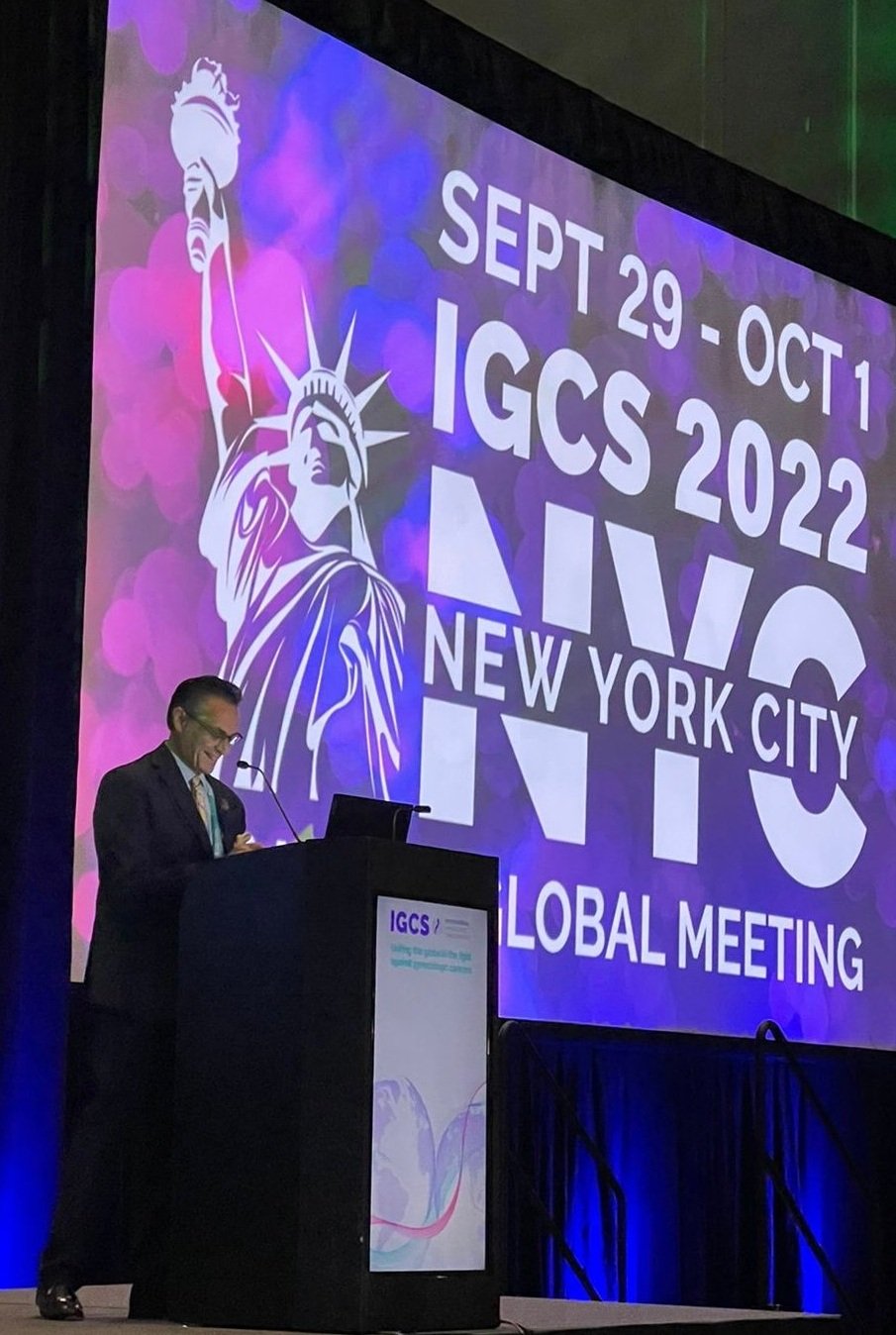
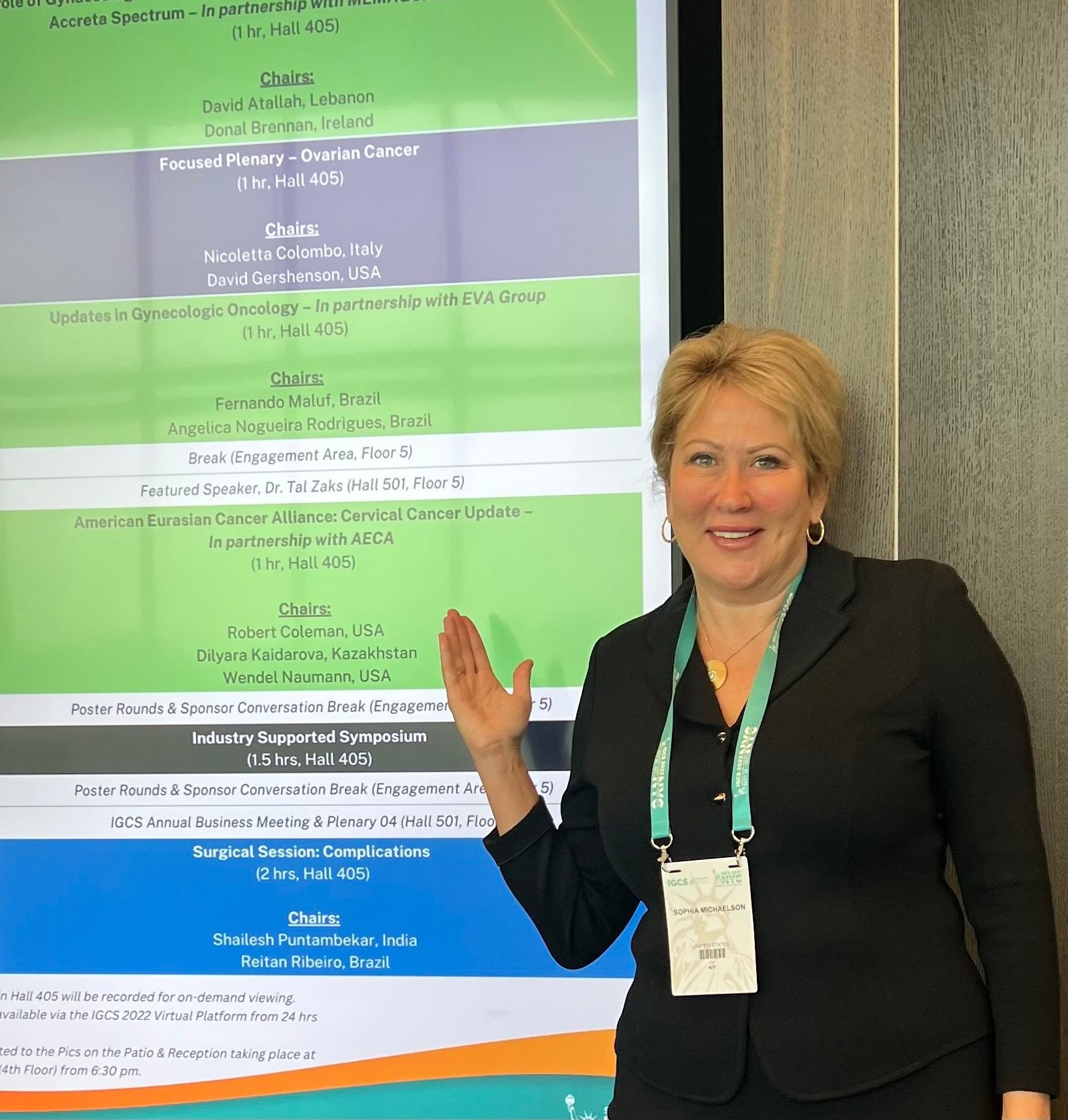

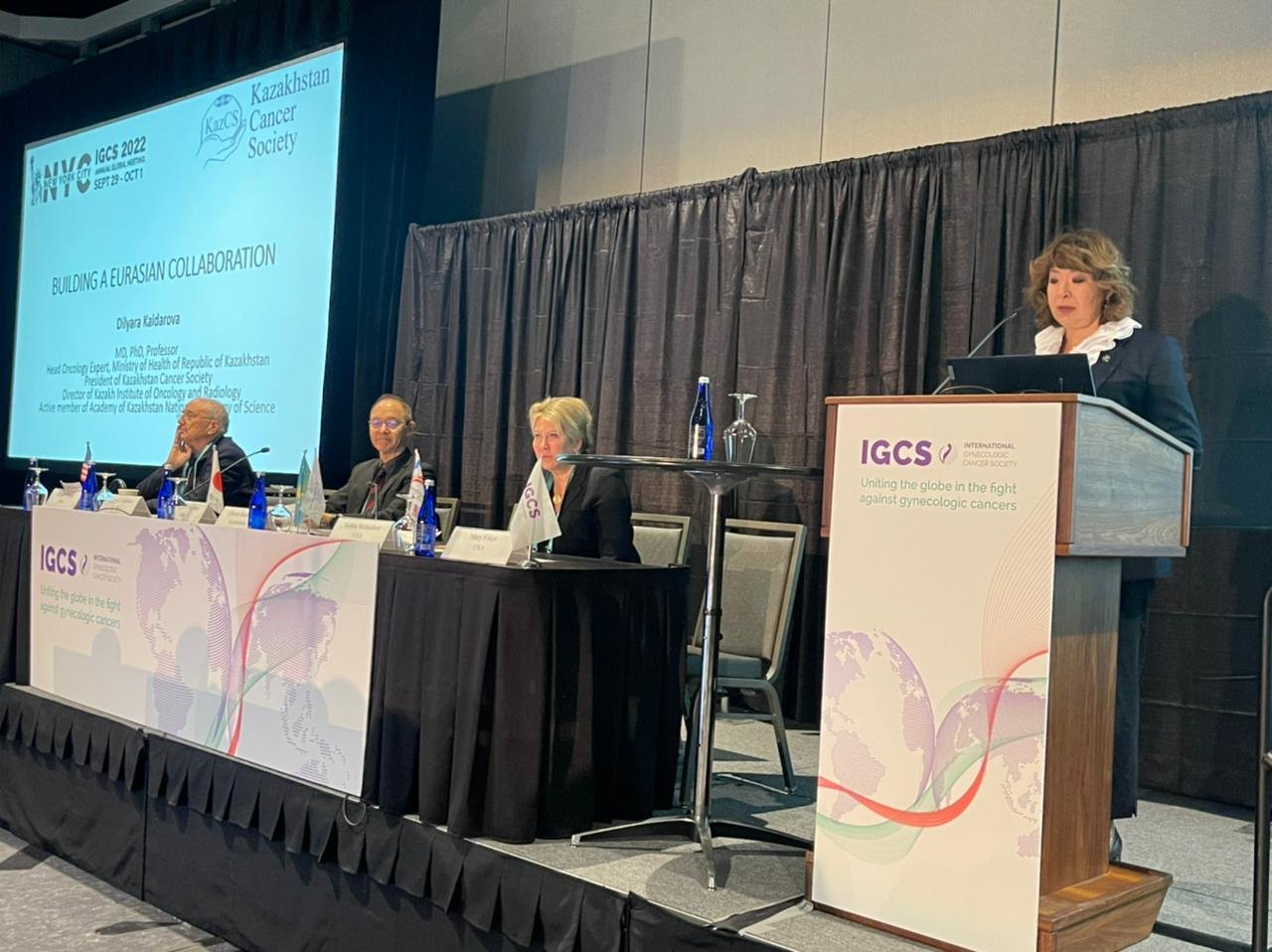


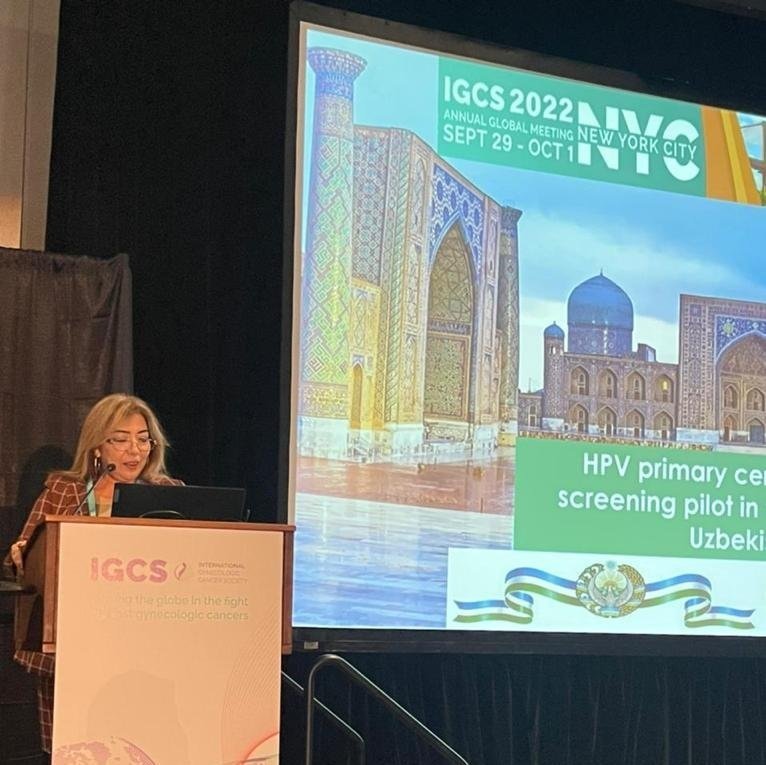
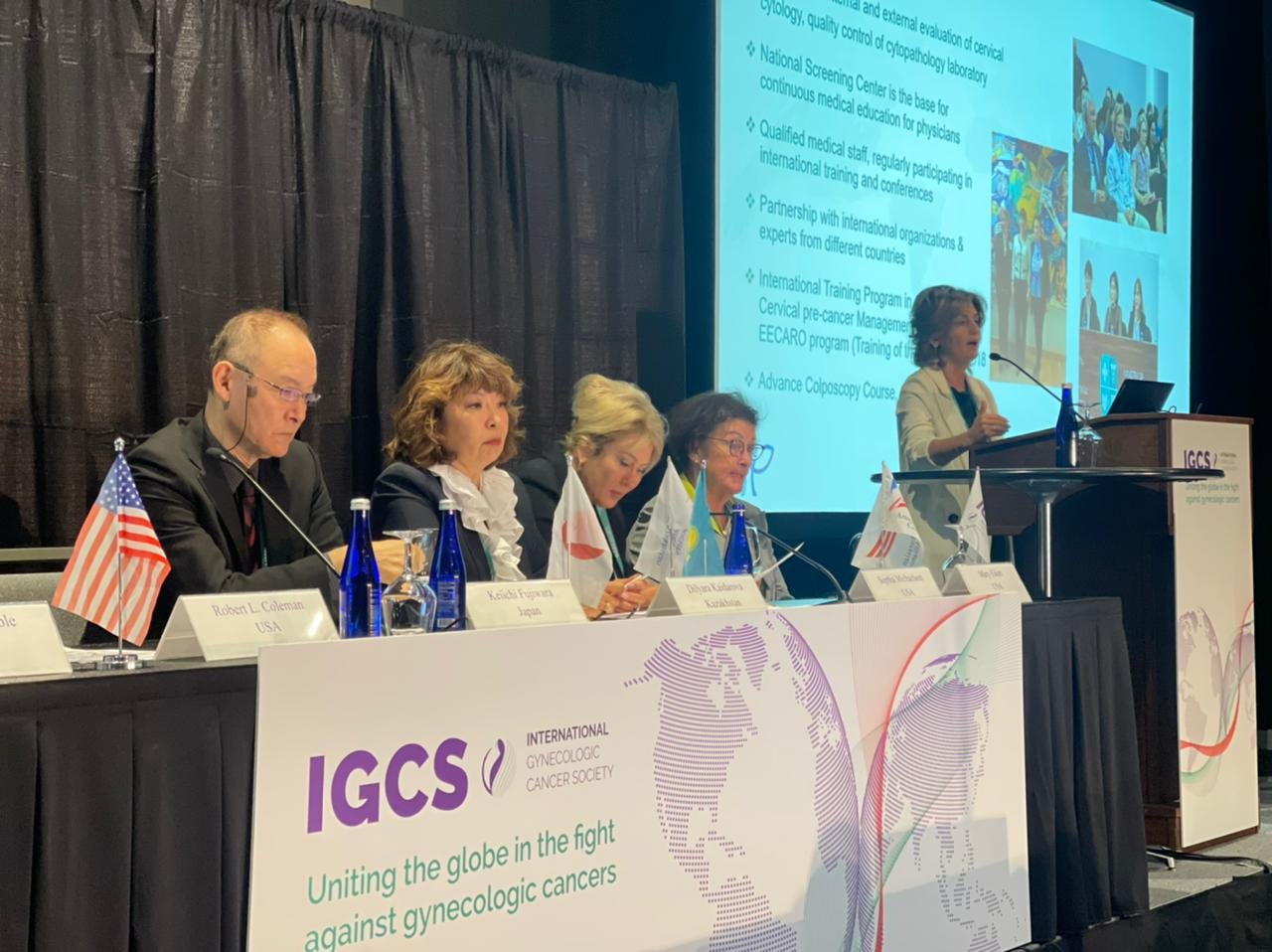

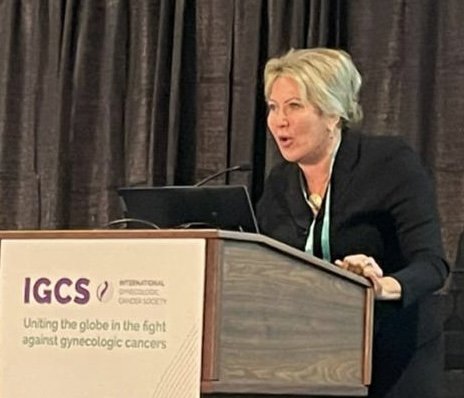
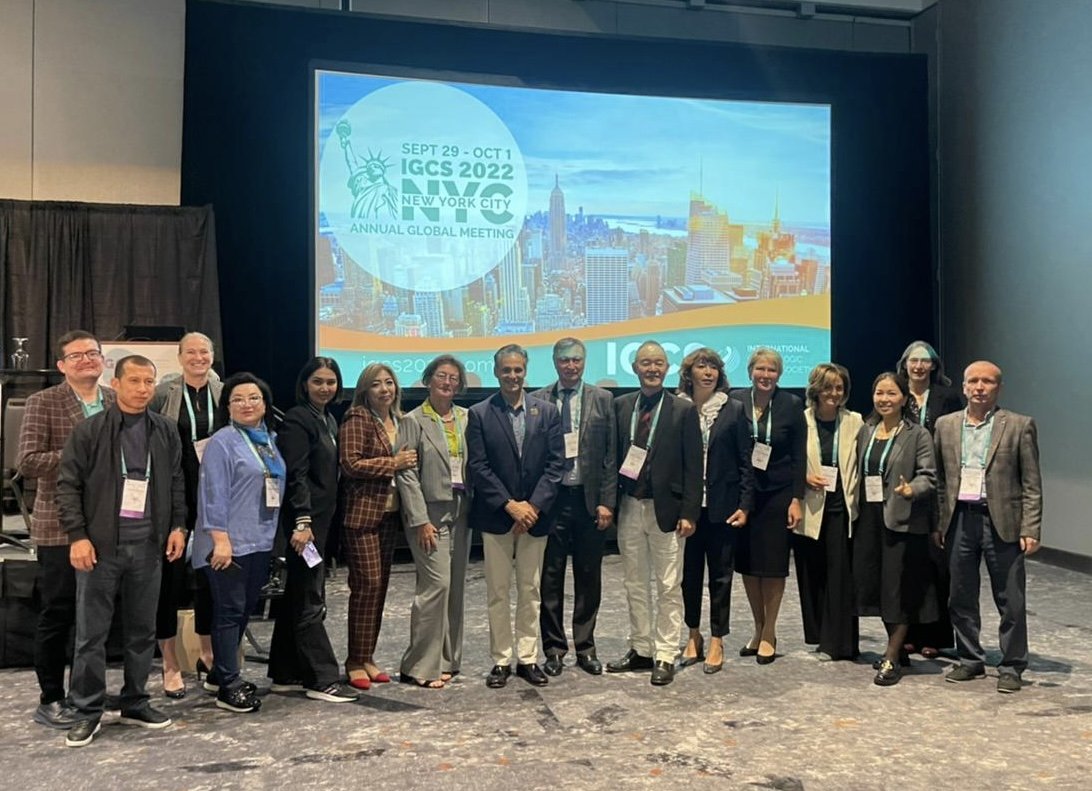
Cancer Control Leaders from the U.S. NCI, AECA, and Eurasia Nations Cultivate International Collaboration
AECA convened a meeting with U.S. National Cancer Institute (NCI) leaders and Eurasian delegates in order to further scientific and educational innovation on an international scale. Cancer control leaders from Kazakhstan, Georgia, and Uzbekistan shared regional updates with NCI’s Dr. Doug Lowy (Principal Deputy Director) and Dr. Ted Trimble (Senior Advisor for Global HPV and Cervical Cancer Control). Discussions largely revolved around how nations are taking steps toward reducing HPV infections and updates on cervical cancer screening. Experts from leading U.S. institutions such as the MD Anderson Cancer Center and Levine Cancer Institute were also in attendance and benefitted from strengthened international collaboration. Following the session, leaders were able to discuss upcoming gynecological cancer plans, with major 2023 events to be held in Kazakhstan and South Korea. As part of AECA educational programs, plans are also underway on a cervical cancer surgical training course, in collaboration with IGCS and Eurasian cancer control leaders.
AECA Expands Territorial Coverage to the Caucuses
With a goal of bringing additional stakeholders into the AECA platform, as well as the IGCS Strategic Alliance Program, to amplify the initiative’s collective impact, AECA expanded territorial presence into the Caucus region. The Caucasus is a region between the Black Sea and the Caspian Sea; mainly comprising Armenia, Azerbaijan, and Georgia. In early June, a meeting was held with Dr. Natia Jokhadze of the Georgian Gynecological Oncology Society, to discuss current gynecological oncology needs in the country and opportunities to facilitate international cooperation. In September, AECA hosted a Eurasia-focused session at an international event that welcomed new country representatives and unite members from Eastern Europe, Central Asia, and the Caucuses. The congress also featured a signing ceremony for Georgia cancer control leaders to officially become the strategic alliance program partner.
AECA Launches Regional Expansion of the Eurasian Tumor Board Platform
AECA - in collaboration with international partners - is leveraging the strong educational and scientific networks in Kazakhstan by expanding their productive tumor board platform to create a coalition with other cancer control leaders across Eurasia. For years, Kazakhstan has hosted an impactful international gynecological oncology tumor board sessions modeled on Project ECHO (Extension for Community Healthcare Outcomes), a telementoring program. A launch of the new platform at a June event featured stakeholder attendance from North America, Europe, Asia, and Australia, who joined discussions about patients presenting with sarcoma and borderline ovarian tumors. Experts from Kazakhstan, Tajikistan, Kyrgyzstan, and Mongolia, as well as the Caucuses (Armenia, Azerbaijan, Georgia), jointly reviewed all presented cases.
High engagement and productivity from these virtual sessions served as the catalyst for an in-person cervical tumor patient case discussion at the IGCS 2022 Annual Global Meeting in September; Dr. Raikhan Bolatbekova of the Kazakhstan Cancer Society presented case background and outcomes. This expansion both in national representation and presentation forum aims to both encourage the Eurasian community to showcase their innovative clinical methods and foster international collaboration through global scientific initiatives.
Pediatric Oncology and Palliative Care Priorities in Eurasia
Following a request from multiple nations to assist with pediatric oncology care and palliative care services, AECA’s medical team and partners are planning to further support the region with essential educational and programmatic resources. Decisions on the most impactful activities will be made jointly with the Worldwide Hospice Palliative Care Alliance (WHPCA) and International Children's Palliative Care Network (ICPCN). Topics may include training on pain and symptom management, psychological support, patient communication techniques, family decision making around treatment options, and more. Aligned with the World Health Organization (WHO)’s promotion for early integration of palliative care for all children with life-threatening illness, AECA will continue to identify and address local resource limitations, as well as opportunities to engage the global community to support this critical need.
Eurasian Regional Hub Proposed by Leading U.S. Cancer Control Organization
At the recent American Society of Clinical Oncology (ASCO) Annual Meeting, discussions were held which proposed the opportunity for Kazakhstan to serve as the Central Asian council for all ASCO trials and programs in the region. Given ASCO has nearly 45,000 members, representing the world’s largest collection of expertise and insight into the treatment of cancer, this is a monumental achievement for the Eurasian region. This regional platform would incorporate both Central Asian and Caucasus representatives, delivering valuable resources to millions of researchers, clinicians, and cancer patients. This news follows years of capacity building by AECA and other international stakeholders. To formalize the concept, AECA arranged productive conversations between Kazakhstan cancer control leaders and the International Affairs Team at ASCO, including Dr. Douglas Pyle, Vice President, and Sarah Bachmann, Senior Administrator for Outreach. Longstanding AECA partners from the U.S. National Cancer Institute (Dr. Ted Trimble), International Gynecologic Cancer Society (Mary Eiken, MS) and Memorial Sloan Kettering Cancer Center (Dr. Ghassan Abou-Alfa) also joined to discuss progress in Kazakhstan related to gynecological cancers, hepatic cancer, and other prevalent cancer control topics. This effort brings a leading U.S. organization into uncharted territory within the Eurasian region, expanding opportunities for educational exchange, data sharing, scientific trials, and clinical conversations. AECA will continue to develop programs and partnerships that enhance Eurasian capacity and modernize treatment opportunities for those in the region, as well as worldwide.
AECA and IGCS Support Eurasian Capacity Building for Rare Gynecological Disease
Gestational trophoblastic diseases, including growth disturbances of the placenta such as hydatidiform mole, invasive mole, choriocarcinoma, and placental site trophoblastic tumor, are rare but require a multimodality approach for successful treatment. AECA and IGCS recently addressed this issue by establishing contact and maintaining ongoing communication between longtime AECA partners from Uzbekistan and the International Society for the Study of Trophoblastic Disease (ISSTD). Stakeholders entered the engagement with a goal to unite cancer control leaders and formalize the relationship, with an aim to establish a Central Asian center that will serve as a regional hub for monitoring, diagnostics, and treatment of trophoblastic disease, in close collaboration with neighboring countries. While centers for these malignancies currently exist in the US (The John I. Brewer Trophoblastic Disease Center of Northwestern University's Feinberg School of Medicine) and UK (Sheffield Trophoblastic Disease Centre), few comprehensive resources of similar quality are available to patients in the Eurasia. Given the higher prevalence of trophoblastic disease in Asia versus Western regions, insights learned within Central Asia may translate globally and hopefully improve the quality of diagnosis, treatment, and rehabilitation for patients around the world. AECA and IGCS are committed to facilitate further partnerships and programs to support this effort to improve gynecological care both in Eurasia and worldwide.
AECA Mobilizes International Efforts for Cancer Patient Refugees
Over the past twenty years, AECA has developed a network of governmental, clinical, and scientific leaders that have worked together to implement standardized treatment pathways across many participating countries. For this reason, AECA is uniquely positioned to optimize its individual and institutional collaborations throughout Eurasia to ensure timely and appropriate delivery of healthcare services for regional refugees. AECA’s efforts in support of those impacted by the geopolitical crisis in Ukraine have included engagement of healthcare leaders across Europe and Eurasia to support standardized care plans, implemented best practices for sharing of medical records, and coordinated necessary logistics to deliver clinical care which can improve patient outcomes. AECA continues to identify synergistic opportunities to offer its capacity and coalition building expertise in support of Ukrainian refugees. To learn more about the Alliance’s recent efforts, click here.
Eurasian Partner Highlights National Cancer Control Progress at EUROGiN 2022
In April, longstanding AECA clinical expert Dr. Nargiza Zakhirova of the Cancer Center Republic of Uzbekistan presented at the EUropean Research Organisation on Genital Infection and Neoplasia (EUROGIN) conference on Uzbekistan’s national vaccination program. This report highlights the tremendous success achieved between national cancer control leaders and international stakeholders, such as AECA. After years building the infrastructure necessary to implement a human papillomavirus (HPV) vaccine at the national level, the World Health Organization (WHO) selected Uzbekistan as a pilot site for broad HPV vaccination in a localized effort toward eliminating cervical cancer globally. Based on AECA’s strong presence in the region and direct public health education work with Uzbekistan cancer control leaders for the past decade, today 98% of all girls age 9-14 in the country are vaccinated against HPV. Maintaining this rate of vaccination will not only prevent nearly 1,200 cervical cancer cases developed and 600 deaths per year, WHO officials also estimate that cervical cancer in Uzbekistan will be eliminated as public health problem by 2050 - a monumental international achievement. Considering that gynecological cancer is currently the second most common cancer in Uzbekistan, this vaccination campaign will have a major impact on future generations of women across the country. AECA will continue to work with Eurasian countries on the WHO cervical cancer elimination priority and identifying opportunities for national leaders to share both successes and lessons learned with the global cancer control community.
AECA Co-Chairs Palliative Care Session at ADIOR
In April, AECA Executive Director Dr. Sophia Michaelson co-chaired and moderated the palliative care session at the XIII Congress of Oncologists and Radiologists of the CIS and Eurasia, an event which brings together more than 5,000 leading international specialists in oncology, radiology, radiation therapy, surgery, and other related fields. The session featured presentations from several U.S. experts including Stephen Connor, Executive Director of the World Alliance for Hospice and Palliative Care (WHPCA); Eric Krakauer, Harvard Medical School professor and chief palliative care and geriatric medicine specialist at Mass General Hospital; and Tom Smith, Director of Palliative Medicine at Johns Hopkins University Medical School. AECA, with international partners, is continuing to share valuable findings discussed and preparing to participate in upcoming summer/fall global palliative care events.
AECA Leveraging Robust International Participation to Lead Cancer Control Conversations
On the margins of the American Society of Clinical Oncology (ASCO) Annual Meeting, AECA will host a Eurasia-focused session to discuss relevant outcomes from the ASCO meeting, how to bring international learnings to the Eurasian community through educational experiences, and opportunities for alignment in research agendas for 2022 and 2023. Longstanding AECA partners will be in participation, with the potential for new countries to join the Alliance as AECA continues to expand further to the Caucuses, Baltics, and Eastern European regions.
Progress in Kazakhstan on Molecular Genetics Cancer Diagnostic Research
AECA has been working within in the Central Asian region for the last decade, participating in the great achievements that the region has seen in innovative cancer control techniques. Due to the Cancer Control Leadership Forum organized by AECA, the National Cancer Control Plan in Kazakhstan was structured in a way that focused on cancer research and advanced diagnostic techniques. Subsequent programmatic and financial allocations the nation was able to receive allowed Kazakhstan expanded its research structure and portfolio to the degree of becoming a sophisticated international partner in molecular genetics cancer research.
For current molecular genetics research studies on colorectal and breast cancer, AECA jointly with leaders at the Kazakh Institute of Oncology and Radiology (KazIOR) have been able to leverage scientific advisory support from the broader international community to ensure successful research endeavors. Due to an increasing incidence of colorectal cancer (CRC) among those under 50, KazIOR conducted a molecular genetic analysis of pathogenic mutations and variants with uncertain functional significance associated with CRC in patients and as a result of the study, 17 new, previously undescribed mutations associated with the development of colorectal cancer were identified. Breast cancer is also a large disease burden in Kazakhstan, ranking first on national cancer incidence. KazIOR conducted a study to identify mutations in the BRCA1 and BRCA2 genes in patients with sporadic breast cancer, which revealed a difference from other populations with a relatively high frequency of mutations in the BRCA1/2 genes;. mutations like 185delAG, 5382insC, C61G were not found.
Due to strong national support and the pursuit of scientific excellence, AECA was able to witness the results of its programmatic efforts years before. By understanding more fully the genetic components of these deadly malignancies, cancer control leaders can improve early diagnosis rates and prescribe more targeted treatment regimes, thus increasing patient survival rates. Outcomes from this Kazakhstan-based research continues to be shared via international journals and conferences, further aiding in the dissemination of the vital information to the global cancer control community.
AECA to Host 2022 Virtual Summit of Eurasian Oncology Leaders
To ensure a collaborative, impactful year ahead, AECA is convening Eurasian global health leaders to encourage timely debate on emerging oncology issues that have emerged during the COVID-19 pandemic. With decades of experience finding synergies across organizations and institutions, AECA continues its focus on stakeholder priorities and opportunities for U.S.-Eurasia scientific, educational, and programmatic cooperation. The event will include public health representatives working in government and non-government agencies, academia, non-profit organizations, and the private sector. AECA clinical and administrative leadership will refine its scope and outreach plans after processing the insights gleaned from discussions with cancer control leaders from Eurasia in an effort to unify regional cancer control endeavors in 2022 and beyond.
AECA Executive Director to Present at MSKCC Germline Cancer CME Event
AECA assisted oncology leaders from the Memorial Sloan Kettering Cancer Center to develop a Eurasian contingent for the Humanity Cancer Germline Convergence and Divergence Cancer Predispositions joint conference and working group meeting on January 5-6, 2022. The session will be run as a continuing medical education (CME) and American Board of Internal of Medicine maintenance of certification (MOC) event. Topics of discussion will include pan-cancer germline assessment, the impact of BRCA cancer, genetic/familial high-risk assessment, and more. Regional report-outs will be provided by stakeholders from Africa, Americas, Asia, Eurasia, and the Middle East. AECA engaged strong participation of experts from major cancer centers throughout the Eurasian region.
International Cooperation on Palliative Care Declaration
As part of the European Association for Palliative Care’s 17th World Congress, AECA and the Worldwide Hospice Palliative Care Alliance hosted an on-line webinar on the development of palliative care in CIS countries. More than 300 stakeholders registered for the event, with attendance from representatives of nearly 30 countries around the world. Conference leaders worked tirelessly to finalize language of a joint declaration which highlights an outstanding international cooperation commitment by the global palliative care community. The declaration was approved by all attendees and will serve as a framework for next steps forward for palliative care development in the region. Formalizing this agreement ensures continued international engagement to improve care services for those battling life-threatening illness, calls for improved access to pain relief and palliative care services, improved educational efforts, and serves as a tangible resource that palliative care advocates can bring to their national leadership to garner broader support in palliative care efforts. Drawing on years of experience shepherding tobacco control resolutions which ultimately influenced national legislation, AECA played a critical role in both highlighting the necessity for a joint international palliative care agreement and encouraging leading U.S. and Eurasian participants to join this important effort.
AECA Addresses Global Hospice Care
Marcin Chwistek, MD, FAAHPM, director of the Supportive Oncology and Palliative Care Program at Fox Chase Cancer Center and longstanding AECA clinical expert, recently spoke at the Hospice Care Professionals Association Conference held in Moscow. Chwistek discussed goal-concordant care, a practice in which patients with cancer receive care that aligns with their values and priorities. The presentation at this conference is the result of Fox Chase’s role as the coordinating center for the American Eurasian Cancer Alliance (AECA), which represents a consortium of medical centers, research institutes, and governmental organizations across the globe who have joined forces to decrease the burden of cancer in the United States and Eurasian countries by furthering research and discovery in cancer prevention and treatment strategies.
Ovarian Cancer Research Progress in Central Asia
Recently, AECA worked with participating stakeholders of the Every Woman Study toward the inclusion of Russian and Central Asian cancer control leaders in the effort to further increase the diversity of populations that will contribute to the global research project. The World Ovarian Cancer Coalition (WOCC) is expanding coverage to survey ovarian cancer survivors primarily in low- and middle-income countries and in low-resource settings within high-income countries, thus providing a stronger evidence base of women’s experiences in these settings and countries. In 2020, the WOCC conducted an online study in which 1,531 women from 44 countries participated, providing key global evidence of women’s experience with ovarian cancer and indicated priorities for action. This year, representative from Kazakhstan will serve on the oversight committee, and ovarian cancer researchers from the Central Asian perimeter will be invited to participate, as well. Following continued collaboration between Kazakhstan, AECA, and IGCS, national leaders were recently featured in an IGCS Strategic Partner Alliance highlight. Based on stakeholder research priorities, AECA will navigate Eurasian territorial expansion further to obtain diverse data for the study.
From left: Dr. Stephen Connor (WHPCA), Dr. Sophia Michaelson (AECA), and Dr. Deana Nevzorova (HCPA) discuss palliative care efforts in the Eurasian region
International Palliative Care Leaders Formalize Collaborative Engagement
AECA has been immersed in the palliative care landscape for more than a decade, and through interactions with global stakeholders has built an expansive network of partners prepared to work collaboratively to make tremendous strides in the field. For the last two years, the Worldwide Hospice Palliative Care Alliance (WHPCA) and AECA have worked together closely to coordinate efforts for improving palliative care both specifically in Eurasia and worldwide. In recognizing the positive impact that the organizations were creating in terms of multidisciplinary education, clinical research, and scientific dissemination, a Memorandum of Understanding was recently signed to further solidify the organizational relationship and joint palliative care plans. With world-class academic organizations and growing application of palliative care services, the region is ripe for foundational research, policy change, and clinical care advancements.
Tajikistan Hits Great Strides in Gynecological Oncology Efforts
After several years as united partners in cancer control efforts, AECA is proud to share the latest accomplishments from healthcare leaders of the Republic of Tajikistan. The country has historically reported a relatively low incidence of diagnosed malignant tumors among the population; however, according to 2018 GLOBOCAN data, an increase in such incidence was noted in almost all major localizations. This trend has brought renewed interest in addressing cancer control in the Central Asian country; support which has come from the the World Health Organization (WHO), the International Atomic Energy Agency (IAEA), Worldwide Hospice Palliative Care Alliance (WHPCA), and the American Eurasian Cancer Alliance (AECA), among other leading global health organizations. Due to the visionary leadership of Dr. Zafardjon Husseinov, Director of the Tajikistan Republican Research Oncology Center, the country is on track to drive significant advancements in prevention, diagnosis, and implementation of the latest technologies in cancer treatment and palliative care techniques. Recent analysis of the malignant tumors morbidity in women in Tajikistan confirmed that cervical cancer is the most common cancer among women, second only to breast cancer, which indicates potential diagnostics problems (detection of the disease in predominantly advanced stages of the process) and treatment (availability, timeliness, appropriate treatment scope). Tajikistan recently developed an Action Plan to address rising cervical cancer rates, with an emphasis on robust screening protocols, novel treatment techniques, and healthcare professional training and education. AECA, alongside International Gynecologic Cancer Society (IGCS), will foster Tajikistan’s participation as a new member of the Central Asian tumor board case review program, with additional gynecological cancer control endeavors to follow. AECA remains extremely committed to the success of the nation as it addresses the most pressing cancer control issues and will continue to identify synergies for collaboration with both North American and other Eurasian stakeholders.
Central Asian Onco-Gynecological Community Flourishes
For the past several years, AECA’s efforts have been strongly focused on the potential for clinical advancement within the Eurasian gynecological oncology arena. After working closely with world-renowned cancer control leaders in the region, AECA is thrilled to announce that substantial progress from several work streams has recently received international recognition.
In the Republic of Uzbekistan, long-time AECA clinical expert Dr. Nargiza Zakhirova began a pilot project for screening cervical cancer by human papillomavirus infection (HPV) testing which will be conducted for more than 50,000 women in remote areas. The project was developed jointly with methodological and technical support from the World Health Organization (WHO) and is sponsored by the United Nations Population Fund (UNFPA). Women with a positive HPV test will be randomized to have VIA or colposcopy; women with suspected cervical cancer will be referred to an oncology center for further examination and treatment. Due to a joint commitment to enhance the regional cervical cancer program from AECA and the International Gynecologic Cancer Society (IGCS), IGCS simultaneously initiated a basic training program for Uzbekistan - a complement to the IGCS Global Curriculum - to provide stakeholders with evidence-based practice skill sets to diagnose and manage pre-invasive cervical disease. Both engagements precede the subsequent Russia-CIS Congress to be held in April 2022, where results from the pilot study and lessons learned from the training program will be discussed amid global cancer control leaders.
Since 2017, AECA and IGCS jointly initiated a formal gynecological oncology program in Republic of Kazakhstan; both organizations remain committed to supporting the technical advancement of related programs and policies. This year, Dilyara Kaidarova, Director of the Kazakh Institute of Oncology and Radiology (KazIOR) and long-time AECA partner, received a distinguished regional award based on her leadership of an onco-fertility program aimed at preserving reproductive functions among patients with cancer. Recently, there has been an increase in cancer incidence among young patients in Kazakhstan, making fertility-sparing treatment even more important. This is done through improved treatment protocol and the initiation of a cryobank to store patient genetic materials. The onco-fertility program also includes ovarian transposition in patients with cervical cancer who will undergo radiation therapy, making it possible not only to preserve hormonal status, but also the ability realize fertility with the help of a surrogate mother. AECA will continue to support regional partners in their efforts to implement the most advanced technology to maintain various quality-of-life indicators. Results from the ongoing program will be presented at the IGCS 2022 Summit in New York, NY, USA.
Fox Chase Urology Experts Lead Kidney Cancer Tumor Board Discussion
Two decades ago, Dr. Richard Greenberg of Fox Chase Cancer Center (FCCC) — AECA Coordinating Center — established relationships with urological experts in Eurasia, which has developed into a flourishing exchange between international cancer control leaders. Most recently, Dr. Alexander Kutikov of FCCC has continued to build on these relationship by facilitating kidney cancer tumor board sessions, where clinicians across Eurasia discuss innovative approaches to selection, timing, and modality of treatment of renal masses. Kidney cancer is a topic of interest to the global cancer control community.
Robust International Participation at the Rare GYN Tumor Conference
AECA jointly with partners, the Russian Reproductive Tumor Society (RRTS) and International Gynecologic Cancer Society (IGCS), organized and implemented an international web conference to discuss the latest advancements in gynecologic oncology. The event received remarkable interest, with confirmed participation from more than 600 oncology leaders representing 50+ countries around the globe. As part of a full meeting agenda, AECA-affiliated experts from MD Anderson Cancer Center, Johns Hopkins University, Memorial Sloan Kettering, and N.N. Blokhin National Medical Research Center presented on a range of topics related to research, diagnosis, and treatment of ovarian, endometrial, vulvovaginal, and cervical cancers, with a particular emphasis on rare cases. In order to optimize on the momentum developed at the Conference, AECA is jointly planning with partners another Moscow-based event for September/October 2021 that will have a broader focus on all gynecological malignancies.
AECA Engaged Central Asian Experts on Patient Case Review
Following a multi-year engagement with Russian palliative care specialists, AECA is now participating in quarterly, international virtual case reviews. While the convening was originally exclusively U.S. and Russian stakeholders, AECA has expanded participation to other Central Asian countries to increase the institutional knowledge available to draw from; Tajikistan and Uzbekistan are the first to accept, and more countries are expected to join soon. Recently the group discussed the case of a 29-year old woman in Russia, who in 2019 received a diagnosis of cervical cancer stage IIB. She underwent a nerve-sparing radical hysterectomy with ovarian transposition and para-aortic lymphadenectomy, but cancer recurrence has since been documented and the patient continued to experience severe discomfort. During the recent webinar, Russian health care providers consulted with international palliative care leaders - including AECA clinical experts Drs. Marcin Chwistek, Jim Cleary, Stephen Connor - to discuss corrections in the analgesic scheme to prevent pain breakthroughs, potential of radiosurgical hypophysectomy, and ethnical considerations for treatment of young patients. AECA will continue to monitor palliative care protocols for women in Eurasia, as cervical cancer, and related palliative treatment, is particularly prevalent in the region.
Germline Hereditary Cancer Predisposition Joint Conference and Working Group
After years of working with Memorial Sloan Kettering (MSK) Cancer Center on international endeavors in liver and urological cancers, MSK and AECA’s collaborative relationship is expanding further to establish a working group in preparation for a conference on germline hereditary to be held in Dubai, UAE in February 2023. A formal planning meeting is slated for October 2021. Germline inherited cancer susceptibility is an important cause of morbidity and mortality among different ethnic groups worldwide. The proposed MSK-led working group aims to develop a framework for collaborative research which will lead to improved care for patients with germline inherited genes cancer susceptibility. AECA has been the working group liaison for the Eurasian region, advising MSK’s Dr. Ghassan Abou-Alfa on relevant experts to bring valuable international perspectives into the collaborative effort. All invitations that were extended - to the Russian Federation, Belarus, Tajikistan, Kazakhstan, and Uzbekistan - were accepted, and AECA expects robust Eurasian participation in this important coalition.
AECA Contributes to Establishment of U.S.-Russia Health Care Task Force
AECA Executive Director Dr. Sophia Michaelson recently shared best practices on developing a successful public health initiative between the U.S. and Russian Federation, at the request of a Project Director from the Virginia Commonwealth University. The new initiative aims to identify opportunities for collaboration in epidemiology. Joint international efforts have many potential benefits including access to novel study populations, increased funding, training experience for novice researchers, and the ability to address shared global challenges. Additional Advisory Committee members include representatives from the Medical College of Wisconsin, Yale University, University of Washington, Boston University, Russian Public Health Association, Sechenov University in Moscow, among others. AECA welcomes the opportunity to share insights from decades of successful endeavors between North American and Eurasian health care leaders, including serving on the U.S.-Russia Non-Communicable Disease Taskforce from 2011-2014, which led to the “For Healthy Life” campaign. AECA will continue to offer support to international projects that will advance global cancer control efforts.
AECA Showcases Global Palliative Care Influence and Efforts
In a recent ehospice article, AECA Executive Director Dr. Sophia Michaelson was invited to detail the Alliance’s longstanding efforts throughout Eurasia strengthening palliative care partnerships and policies, as well as increasing access to quality end-of-life care to those who need it. The Global Atlas of Palliative Care recently reported that worldwide, only about 12% of people who need palliative care currently receive it. The article touches on AECA’s early activities connecting U.S. and Russian leaders in palliative care, to launching an international palliative care hub, to more recent initiatives to host virtual educational exchange to ensure progress continues to be made in the palliative care space. AECA remains committed to engaging with global leaders in order to advance palliative care research, policy, and practice worldwide.
Strengthening Skin Cancer Research and Education Portfolio
This month, AECA further bolstered its efforts to study, treat, and prevent skin cancer and melanoma by signing a memorandum of understanding with MelanomaPRO, an association of specialists established in 2016 and led by Dr. Lev Demidov. AECA has engaged with Dr. Demidov and other leading oncological dermatology experts for the past decade, and is thrilled to see these relationships materialize into formal cooperative efforts. MelanomaPRO engages with specialists of various fields, including dermatology, surgery, ophthalmology, morphology, and medical oncology, as diagnosis and treatment of melanoma is a particularly multidisciplinary effort. MelanomaPRO and AECA will work together to foster international research collaboration both within the Russian Federation, and from the larger international melanoma community, to ensure the implementation of excellent clinical practice for this increasingly common cancer type.
Launch of Oncology Professional Development Webinars
Following the success of multiple international tumor board meetings in 2020, AECA alongside partners including the International Gynecologic Cancer Society and the Russian Reproductive Tumors Society will host the first in a series of professional development webinars in January. This novel network will provide early career professionals with a supportive group of international peers and mentors to discuss research, publishing, and writing as critical components to career development. This effort ensures that research of value to the global cancer community will be accepted into world-renowned scientific journals and made available to intentional stakeholders who will benefit from the insights. AECA is focused on improving the execution and distribution of peer-reviewed, clinically-proven research, and will continue to identify up-and-coming Eurasian scientists to participate in the group, as well as North American and Eurasian experts to serve as mentors for the next generation of researchers and clinicians.
Launch of the Global Atlas of Palliative Care
The 2nd Edition of the Global Atlas of Palliative Care, published by the Worldwide Hospice Palliative Care Alliance (WHPCA) in cooperation with the World Health Organization, is a definitive source of information on the development of palliative care programs worldwide. Led by AECA-partner Dr. Stephen Connor of WHPCA, the Atlas aims to support the more than 56 million individuals who require palliative care by providing an overview of the global palliative care landscape, barriers to and opportunities for palliative care access, as well as paths forward toward incorporating palliative care in health and human rights agendas. The Atlas also includes ten case studies of innovative hospice and palliative care programs from different parts of the world, including one highlighting the First Moscow Hospice and its development. The need for palliative care in Russia and Central Asia is high and growing; noted also by an AECA-led delegation of leading U.S. cancer center representatives which visited Russian palliative care centers in 2019 and by core AECA collaborating partner from Kazakhstan. AECA will disseminate this vital resource to Eurasian stakeholders to ensure palliative care knowledge sharing, scientific research, and clinical treatment continues to thrive in the region.
Exploring Personalized Medicine in Kazakstan
In 2015, AECA organized a session to discuss national cancer control plans at the Cancer Control Leadership Forum in Uzbekistan, which Kazakhstan cancer control leaders were invited to participate. Following the event, AECA supported the development and execution of these plans throughout the Eurasian region. With financial support for recently acquired, the Kazakh Institute of Oncology and Radiology (KazIOR) has introduced testing of molecular genetic studies for patients with lung cancer, colorectal cancer, melanoma, and breast cancer. In 2019, thousands of cases of were identified, sent for testing, and if mutations were identified, patients began a regimen of targeted therapy, which includes novel therapeutic drugs. Findings from these studies will add to the growing research base of genetic and molecular approaches to cancer care and may influence clinical decisions for the global cancer community. AECA will continue to work closely with the Kazakhstan scientific network to ensure this important effort continues.
AECA Launches Eurasian Scientific Contribution Collection
Recognizing that AECA-affiliated individuals and institutions were contributing frequently to the advancement of global oncology topics, a list of peer-reviewed publications, conference posters, and accepted abstracts to prestigious events was compiled to represent partner activities and examples of international collaboration. Core institutional partners with outstanding contributions to the roster include the N.N. Blokhin Russian Cancer Research Center, the Uzbekistan National Cancer Center, and the Kazakh Institute of Oncology and Radiology. AECA is working closely with other country representatives throughout the Eurasian perimeter to introduce additional accomplishments.
Eurasian Representation at the European Society for Medical Oncology (ESMO)
AECA’s decades-long cultivation of scientific exchange between Eurasia and U.S. and European partners, has led to Eurasian stakeholders to become active members of the ESMO platform. Held virtually for the first time this year, the ESMO annual congress hosted an international audience of tens of thousands of oncology experts focused on improving integrated cancer care in the COVID-19 era. Keynote lectures were provided by Dr. Anthony Fauci (National Institute of Allergy and Infectious Disease - NIAID) and Professor Antoni Ribas (Jonsson Comprehensive Cancer Center at UCLA), and one novel topic of interest was the use of ctDNA testing in patients with colorectal cancer and esophageal adenocarcinoma. Conference attendees viewed more than 2,100 abstracts from around the world, several of them submitted by AECA-partnering scientists throughout the Eurasian perimeter, including: Russia (28 abstracts), Kazakhstan (2 abstracts), Ukraine (2 abstracts), and Belarus (4 abstracts).
Inauguration of the Uzbekistan Center for Women’s Reproductive Health
With a strong foundation of productive tumor board collaboration through current AECA and IGCS networks, cancer control leaders in Uzbekistan received global support during the establishment of this critical regional facility for women’s health. The Center is spearheaded by AECA clinical collaborator Dr. Nargiza Zakhirova of the Uzbekistan National Cancer Center. This effort comes on the heels of a successful introduction of national-level HPV vaccination campaign, which reached school-age girls in all districts to ensure they are protected against HPV-associated cancers. Clinical pathologists with specialties in breast and gynecological cancer within the AECA network will contribute their expertise to the Center to ensure programmatic success.
Plans Finalized for New International Urology Tumor Board
AECA, jointly with the Russian Association of Oncological Urology, came to a consensus with international stakeholders to launch a virtual tumor board program focused on onco-urology topics. Urological (bladder, kidney, prostate and testis) cancers remain highly prevalent in the Russian Federation, and global collaboration to identify and treat these malignancies will not only bring new expertise to the Eurasian region, but may also uncover novel treatment techniques that would be of benefit to U.S. populations. AECA will continue to source relevant stakeholders for participation in the valuable collaborations, both from North America and the larger Eurasian perimeter.
Palliative Care Progress in Russia
National policymakers signed a new action plan through 2024 to improve the quality and availability of palliative care in the Russian Federation. The movement builds off decades of work increasing country capacity both in scientific research and clinical care, as well as education around the importance of incorporating palliative care into treatment plans for a range of malignancies. AECA serves on the panel of international experts who contribute to and provide guidance on clinical case study review, educational events, and joint scientific programs and publications. By committing to national progress on the issue, Russia secures its position as a leader in scientific research and clinical care among the international palliative care community.
Uzbekistan Gynecological Tumor Board Launch
Following on the success garnered from AECA-organized tumor boards in Belarus, Kazakhstan, and Russia, stakeholders from Uzbekistan mobilized efforts to develop a plan for a similar virtual training program. Together, the International Gynecologic Cancer Society (IGCS) and AECA have provided access to various virtual gynecological communities to discuss trends in research and potential global partnership opportunities.
Launch of Central Asian Surgical Pathology Virtual Training
Noting several challenges related to surgical pathology in Central Asia - including lack of proper training and resources, fewer opportunities to attend conferences, and limited access to relevant literature - AECA aligned with international pathology leaders to launch virtual training sessions on the field of study. This initiative aims not only to educate Eurasian surgical pathologists on the techniques and technologies that can be used to improve diagnostic results, but to standardize the collection - and potential analysis - of data and diagnoses both within and outside national borders. AECA continues to ensure stakeholders are fully engaged and committed to this important program.
International Palliative Care Research Conference
AECA, jointly with the Worldwide Hospice Palliative Care Alliance and the Russian Association of Hospice Care Professionals, hosted an international summit to discuss cooperative palliative care research. Early efforts are underway to conduct clinical trials on essential medicines, but the group is also helping to create a health services research infrastructure in Russia to ensure the viability of strong clinical partnerships. The foundation of this relationship is the creation of a nationwide data set in Russia with standardized measures, which would strengthen researchers ability to evaluate the impact of palliative care within the health system, and align Russian data with global healthcare operations and outcomes figures.
AECA Response to COVID-19 Pandemic
AECA coordinating center, Fox Chase Cancer Center, published clinical guidelines for cancer care in the time of COVID-19, which was promptly shared with international partners to provide the most up-to-date guidance with the scientific community. Simultaneously, AECA, the Worldwide Hospice Palliative Care Alliance, and the Russian Association of Hospice Care Professionals were mobilizing efforts by developing recommendations for the palliative care space, which were distributed in both English and Russian. AECA continuously sought out and informed both U.S. and Eurasian stakeholders of valuable virtual events that would ensure both regions were learning best-practices from scientists and clinicians all over the world.
Russian Delegation Visit to U.S. Cancer Centers
Due to the strong foundation of AECA-led scientific collaboration between the U.S. and Russia, AECA was able to secure an opportunity for leadership from the N.N. Blokhin National Medical Research Center to visit both the MD Anderson Cancer Center and the Sidney Kimmel Comprehensive Cancer Center at Johns Hopkins. The event ignited the decision to move forward with the following joint U.S.-Russia endeavors: monthly virtual clinical case demonstrations, case library creation for educational reference, joint peer-reviewed publications, and other virtual events throughout the year, including the October 15 International Gynecologic Oncology Virtual Congress.











